

RECENTLY PUBLISHED
Popular articles.
- e-Invoicing in Malaysia: A Complete Guide For Your Business
- Malaysia e-Invoicing FAQs: Everything You Need to Know
- Important Terms in Malaysia e-Invoicing
- Reasons for Rejection and Cancellation of e-Invoice in Malaysia
- e-Invoice Exemptions in Malaysia: A Comprehensive Guide
- e-invoice Model in Malaysia: Benefits, Requirements and How to Get Started
- Data Security and Privacy Monitoring in Malaysia: How IRBM Leads the Way
- Transaction Types of e-Invoicing in Malaysia: A Comprehensive Guide
- Steps for submission, validation, and issuance of e-invoices in Malaysia
How to Start Up a Business in Malaysia 2024
Updated on : Mar 20th, 2024
Malaysia, ranked 24th in the World Bank's Ease of Doing Business in 2018, and has emerged as a vibrant hub for business opportunities. However, navigating through the process of setting up a business requires careful planning and understanding of the legal and regulatory environment.
Starting up a business in Malaysia involves a structured approach catering to local and foreign entrepreneurs. Below is an informative guide on how to start up a business in Malaysia, incorporating essential steps and practical advice.
Planning and Preparation
Before diving into the business world in Malaysia, consider the following steps:
Define Your Business Idea and Plan : Identify your target market, understand the problem you're solving, and conduct a SWOT analysis (strengths, weaknesses, opportunities, threats). Ensure you have a solid business plan in place, considering factors such as funding, capital needs, and market research.
Naming Your Business : Choose a unique and memorable name that aligns with your business type. Check for domain name availability and conduct an official business name search through Suruhanjaya Syarikat Malaysia (SSM).
Find a Business Location : For physical stores or specific business types requiring space, select an appropriate location. Home-based businesses can bypass this step.
Registration and Licensing
Starting a business in Malaysia involves a three-step process, each crucial for ensuring your business is legally compliant and set up for success. Here's a simplified and structured guide with key points highlighted:
Step 1: Preparation for Registration
Selecting a business structure : Choose the most suitable form for your business. Options include sole proprietorship, partnership, limited liability partnership, private limited company, public limited company, branch office, representative office, or subsidiary company. The foreign companies have additional considerations.
Choosing a company name : Acclime can assist in conducting a name search. Ensure the name follows Malaysian guidelines - proper language use, no offensive or religious elements, and compliance with specific naming rules.
Appointing key officials : Decide on your company's directors (minimum one, natural person, aged 18 or above), shareholders (minimum one, can be an individual or a body corporate), and a company secretary (a member of a professional body or licensed by the SSM).
Registered office address : Choose a legitimate office address for receiving formal communication; P.O. boxes aren’t permitted.
Share capital requirements : Determine your share capital, with a minimum requirement of RM1.
Step 2: Registration
Company registration with SSM : Register your company name with the SSM, which, once approved, is reserved for 30 days (extendable for another 30 days for a fee).
Required documentation : Prepare and submit necessary documents, including the Constitution (optional), Declaration by a director or promoter, Declaration of compliance, and copies of directors' identity cards.
Step 3: Post-Registration
Opening a corporate bank account : Choose from various local and international banks like Maybank, CIMB Bank, etc. Required documents include completed application forms, possibly a letter of introduction, company’s rubber stamp, photocopies of directors’ IDs, and board resolutions.
Obtaining business licenses and permits : Secure general, sector/industry-specific, and activity-specific licenses. General licenses include company registration, tax registrations, EPF, PERKESO, and others.
Determining tax obligations : Understand your company's tax obligations, which vary depending on several factors. Malaysia has specific tax rates for residents and non-residents.
Appointing auditors : Necessary for all companies, with specific timelines for newly incorporated entities.
Registering for employee provident fund : This includes registration for both, employers and employees, with specific documentation required.
Key government agencies and organizations offering support to businesses
In Malaysia, several key government agencies and organizations offer support and resources to businesses, especially those in the start-up phase. These entities provide a range of services, including registration, financial assistance, training, and more. Here's a list of some of the most significant agencies:
Suruhanjaya Syarikat Malaysia (SSM) : SSM regulates companies and businesses, handles new registrations, and provides compliance guidelines.
Malaysian Investment Development Authority (MIDA) : As the government's main agency for industrial development, MIDA advises on investment opportunities and assists companies investing in Malaysia.
Companies Commission of Malaysia (CCM) : CCM is crucial for business registration and incorporation, offering services like registration, renewal, and compliance support.
Small and Medium Enterprises Corporation Malaysia (SME Corp. Malaysia) : Under the Ministry of Entrepreneur Development, SME Corp. Malaysia formulates policies for SMEs and coordinates development programme.
Malaysia External Trade Development Corporation (MATRADE) : MATRADE, the national trade promotion agency, assists in developing external trade, with a focus on export promotion.
Ministry of Entrepreneur Development and Cooperatives (MEDAC) : MEDAC aids entrepreneurs and cooperatives through training, financial assistance, and advisory services.
Human Resources Development Fund (HRDF) : Part of the Human Resources Ministry, HRDF focuses on developing the local workforce, aligning with Malaysia's economic goals.
Pertubuhan Keselamatan Sosial (PERKESO) : PERKESO provides social security protection for work-related accidents or diseases.
Starting a business in Malaysia involves several critical steps, from understanding the right business structure to ensuring compliance with various governmental agencies. Navigating this process can be complex, but with the right support and guidance, it becomes manageable and rewarding. Agencies like Suruhanjaya Syarikat Malaysia (SSM) and the Malaysian Investment Development Authority (MIDA) play significant roles in this journey, offering necessary resources and regulatory frameworks.
To simplify this process, ClearTax offers an efficient and user-friendly solution, making the task of setting up a business in Malaysia much easier. By leveraging ClearTax's expertise, entrepreneurs can seamlessly navigate through the intricacies of business registration, compliance, and other essential aspects, allowing them to focus more on growing their business in the dynamic Malaysian market.

Fueling Malaysian startups through connection, innovation, and support

Reach out for startup support and inquiries

Submit Your Pitch
Send in your application to unlock potential funding opportunities for your startup.

Join hackathons and accelerators to guide and scale your startups

Investor List
Search for the best funding option for your startups.

New Founders Guide
Navigate the startup landscape seamlessly with our new founders guide.

Startup List
Explore, connect, and grow with malaysian startups.
Startup Perks
Unlock free deals to accelerate the growth of your startup.

National Agencies
Explore support offered by national agencies through grants, funding programmes and incentives.

Private Firms
Discover local and global private funding firms that support startups.

Recently Fundraised (Startup List)
Spotlighting recent fundraising success.

Investor Guidelines
Navigating the investment landscape in malaysia.

Startup Jobs
Discover exciting job opportunities offered by our startups.

Tech Talent Community
Connect and collaborate with our vibrant tech talent community.

Upskilling Programmes
Elevate your skills with our curated upskilling programmes.

10 Important Steps for StartUp Business in Malaysia (Year 2024)
How do i start a business in malaysia.

In recent years, many people have been inspired by successful entrepreneurs such as Elon Musk (Tesla), Jack Ma (Alibaba), Mark Zuckerberg (Facebook), etc., having the goal of becoming an entrepreneur as successful as them.
Malaysia is one of the growing markets in Southeast Asia and provides a lot of business opportunities in Malaysia. In 2017, approximately 480,000 startups were registered in Malaysia. It has shown there are highly promising business opportunities in Malaysia due to the strong influence on entrepreneurship. Of these, 98.5 per cents are small and medium-sized enterprises or 36.3 per cent of GDP. Unfortunately, almost 80% of Small and Medium Enterprises (SMEs) do not survive in the first 3 years. ( Source )
There are various factors that can cause a business to fail, but a new startup can survive in the early 3 years, following the guideline of – Top 10 Steps for StartUp Business in Malaysia (Year 2022) for startup preparation in Malaysia of year 2022! If you are university students in Malaysia, this article could support you to start a business with your awesome business ideas in Malaysia.
1 – Solution/Idealogy — Solve the problem statement
What are the pain points your new business idea addresses in Malaysia? You must conduct a needs analysis and market research to determine the validity of the current pain point in Malaysia. It would definitely help you to identify more business opportunities and understand the market in Malaysia. Preferably if your small business ideas resonate with your personal passion, interests, skills, resources and more. And market validation is your next step!
Starting a business in Malaysia with startup stories and being a niche is one of the advantages of penetrating the market in a shorter time. Stay on your initial benefits, and most importantly, you’re creating a positive impact for your community in Malaysia!
You may attend startup and business networking to share your small business ideas in Malaysia. Getting direct feedback from experienced startup business owners and serial entrepreneurs would speed up your process in setting your direction right!
Questions to ask yourself:
What are sustainable positive impacts can be created in Malaysia from your small business startup?
What are the methods to carry out market validation which obtain accurate assessments?
Which tech businesses are within your startup ecosystems?
What are the startups in Malaysia has the same business ideas with you?
Why you, why now among businesses which similar to yours?
2 – Setting your vision and mission, a strategic boost-up plan from 3 to 5 years
The purpose of the vision and mission statement is to align and guide everyone, including yourself because sometimes we can make mistakes along the journey. (P/S: We always learn from mistakes)
A 3-5 year strategic boost-up plan has to be developed along with key performance indicators (KPI) to be achieved. In addition to using it for coordination purposes, you can use it as a tool to review and evaluate performance to keep your startup business in good shape.
What stage of your startup business are you at now?
What do you want to achieve in the next 3-5 years? Breakdown on a yearly basis!
What do you need to complete your business ideas in Malaysia?
What is your horizontal or vertical expansion plan within Malaysia or outside Southeast Asia?
3 – Develop your Business Model, Financial Model and Marketing Plan
Mindmap your business model can be difficult to see how far you have in your startup business. You’ll have a better overview from the start of your business in Malaysia and expand horizontally or vertically, or both.
Financial modelling is a great tool to tell you how much you require and how you can leverage it in phases to ensure your startup business growth.
Chart out your marketing plan starting from nurturing your potential customers to closing them. You can refer to this video -> No 1 Product Tip presented by Vishen Lakhiani from Mindvalley, to understand your market better before deciding the direction of your marketing plan.
Now you can get a deeper understanding of your startup business ideas with a comprehensive plan while enjoying your favourite coffee drinks.
Simplify all the information of your ideas and turn it into a slide!
How many types of income are there? Is it recurrent or non-recurrent?
Can you expand your startup business within Malaysia and regionally?
How much do you require reasonably to grow your company?
4 – The Dream Team – Recruit your Co-founder(s) and Core Team in Malaysia
Never walk alone. Co-founders or core team members who share the startup business’s vision and mission will provide more positive momentum and motivation to each other. You should feel proud that when you start a business in Malaysia, it creates startup jobs in Malaysia which actually contributing to our national growth!
Business encompasses the areas of accounting, human resources, operations, marketing, business development, etc.
Choose the right team members to adapt to the right position and achieve sustainable glory!
What startup jobs are available?
What personality and attitude does the person have to fulfil this role?
What benefits and compensation for all their hard work and sacrifices?

5 – Company registration in Malaysia to start running your startup business
There are several options for establishing a legal entity in Malaysia: a sole proprietorship/partnership, Limited Liability Partnership (LLP) or Private Limited Company (Sdn Bhd). More detail comparison can be obtained HERE .
You can analyze each type of legal entity in Malaysia and to see which type of business registration is best to protect the interests of you and your team. You can start with an affordable approach, which consists of setting up a Malaysia sole proprietorship/partnership and convert to LLP or Sdn Bhd when your startup business reaches a certain size in Malaysia.
How many funds do you have at hand for setting up a new company in Malaysia? (find out the costs of configuration)
How many shareholders/partners are involved?
Is it protected by limited or unlimited liability?
6 – Operation with Lean Technology – Be tech-savvy
Cloud software technology can be used by startups and growing businesses to operate efficiently at the lowest fee. In addition to studying the wonderful features of cloud software, you should investigate what is the integration of particular cloud software throughout the world, using Integrated Cloud Software (ICS) will make your startup business easier and communicate internally.
Integrated Cloud Software will act as Enterprise Resource Planning (ERP) software. While it may take time to implement it, it will save a lot of money to increase startup business efficiency.
For example, you can have both project management tools and communication tools to integrate with each other for free in your startup business!
Another example is the use of Xero cloud accounting software and QuickBooks Online for your startup business in Malaysia. Can you imagine that you can access your Xero cloud accounting software and QuickBooks Online anytime, anywhere using any device? You don’t need to invest thousands of ringgit in online accounting software, which will affect your startup business cash availability. See here for more information on how cloud accounting software can help your startup business in Malaysia?
Which processes do you want to automate?
How to increase productivity?
Can I use Cloud Software to replace the tasks?

30 minutes FREE assessment
Get your FREE clarity call with demo with our certified Xero advisor on your digital transformation journey NOW !
Get a 30-minutes free assessment on cloud accounting digital transformation with us!
7 – engage outsource services to keep your expenses low.
Outsourcing is an option for Malaysian startups that utilize cash effectively to boost their business. In the early stages, there are few areas in which outsourcing can be considered for smooth operation.
Accounting is an area that some business owners ignore. In fact, accounting is a cost centre for a startup or growing business, but it plays an important role in reflecting the performance of your business through profit and loss accounts and balance sheets.
Cloud accounting services are a forthcoming trend in Malaysia, helping companies obtain accurate and transparent financial information to make better decisions to grow their business.
Which area has pain points and can not solve it?
What do you expect if you outsource?
8 – Understanding Policy Maker – Malaysia’s budget and policies by 2020
The Government of Malaysia announced its 2022 budget in October 2021. SMEs are one of the stakeholders in Malaysia and can benefit from digital transformation and there is an RM200 million allocation for digitalization of SMEs as announced in the Budget 2022.
Since 2020, it was announced that the Malaysian Government provides a matching grant of up to RM 5,000 for companies adopting digital technology by investing in electronic markets, ERP and e-payroll software. The grant is limited to the first 100,000 SMEs in Malaysia. In other words, Malaysia promoting Malaysian business startups to transform into Cloud Technology, moving towards being fastest-growing markets in Southeast Asia.
On the other hand, Smart Automation Grant by MDec together with Penjana, has been supported SMEs in Malaysia towards digitalization and automation in the year 2020. New applications might be available again in early 2021, please stay tune with their updates on their website.
Therefore, knowing Malaysia’s annual budget will help you develop your business roadmap and take advantage of the opportunities and tax incentives offered in Malaysia.
More importantly, a common tax rate of 17% applies to SMEs generating profits of MYR 600,000 or less. The definition of SMEs is redefined as 1) paying capital up to MYR 2.5 mil and 2) annual sales of MYR 50 mil.
What are the latest government instructions?
What are the government policies, incentives and other criteria to be met?

9 – Get prepared to access funding
Whether you’re looking for funding or not, your business structure is critical over time.
Potential investors will be interested in a business with a strong business structure that is not limited to an impressive business idea but also looking for a management team, a comprehensive business plan, a solid financial model, a business roadmap, an exit plan and more.
Most importantly, you will be able to extract financial information in real-time through cloud accounting software such as Xero and quick manuals, which is one of the key points of choice for potential investors.
Currently, in Malaysia, in addition to venture capital, you can explore a variety of financing options. For example, Equity Crowd Funding (ECF), invoice financing, loans to Small and Medium Enterprises (SMEs), private equity, etc. each financing scheme has its own advantages and responsibilities. for your business.
Be ready to pitch to investors anytime and anywhere, as opportunities can be right in front of you!
P/S: Remember to open for a new bank account in Malaysia for receiving funds and starting your business operation. It is easy to apply in multiple office locations in Kuala Lumpur are available for you. Prepare all needed documents for the application of bank account opening!
What kind of financing is right for your business?
Tell them honestly what you require to develop your business!
What type of investor are you looking for? Monetary, business networks, etc.?
10 – Shine like a Star – It’s time to unleash Wow Factors to your customers!
Aiming to be the authority within your niche is one of the core competencies that can create WOW factors for your Malaysian customers. Show your strength and experience in this area to gain confidence and trust.
Do not forget to provide outstanding customer service for building long-term relationships with your customers to achieve sustainable business growth in Malaysia!
Overall, small and medium business sustainability is one of the keys to long-term advancement in building the country’s economy because SMEs are occupying for 98.5% in Malaysia. Finally, running a business in Malaysia is like doing business elsewhere. Promote your business as an authority in the chosen industry and successfully capture more users. If you pay attention to these 10 important steps in setting up your awesome ideas, you can enjoy a high level of sustained success in Malaysia.
Good luck and all the best on your new adventure trip in 2020 as an entrepreneur!
CALTRiX | Xero Malaysia Gold Partner | Cloud Accounting Service
Typically replies within minutes
E-Invoicing will be implemented soon in Malaysia, do you need more information about how can Xero Cloud Accounting help your business in digital transformation?
WhatsApp Us
🟢 Online | Privacy policy
WhatsApp us

Funding Societies Malaysia Blog
Stronger smes, stronger societies.
Business , SME Business Guides
7 Tips on How to Start a Small Business in Malaysia

Running a small business in Malaysia can be daunting, especially for beginners. However, it’s also an excellent idea because the country has a thriving economy and a dedicated government budget to support small businesses, effective starting in 2024. Still, to ensure your venture remains profitable, you need thorough preparation. Don’t worry; this article will help you build your dream small business in Malaysia!
1. Create and polish your business plan
Before you start any business, creating a solid business plan is crucial. Your plan should include details about your business, such as your vision, mission, objectives, and strategies. It should also have a detailed analysis of your target market, competition, product or service, and financial projections.
Lastly, estimate based on your budget how much funding you’ll need to run your business for the first few months. This step will help you determine the type of funding you need and how much you should borrow.
2. Do a thorough market research and SWOT analysis
Conducting market research will help you identify your target market, the demand for your product or service, and your competition. You can use this information to create a unique value proposition that differentiates you from your competition.
You should also conduct a SWOT (Strengths, Weaknesses, Opportunities, and Threats) analysis to identify the internal and external factors that can impact your business. That way, you can develop the best strategies to address them.
3. Follow the procedures to register your business
Register your business with the relevant authorities once you have a solid business plan. You can register your business in Malaysia with the Companies Commission of Malaysia (SSM). The registration process is straightforward; you can do it online or in person.
You’ll need to choose a business name, structure, and address. Depending on the type of business you’re starting, you’ll also need to obtain the necessary permits and licenses. For example, if you’re starting a food business, you must obtain a food license from the local authorities.
4. Open a dedicated bank account for your business
Opening a separate bank account is essential to track your business finances and separate them from your money, avoiding potential mixups. You can also use it to accept customer payments and pay your suppliers.
5. Secure your funding
Securing funding is one of the most challenging aspects of starting a small business in Malaysia. However, there are many options available for entrepreneurs here. You can apply for a business loan from a bank or financial institution or tap into alternative financing options, such as crowdfunding, angel investors, or peer-to-peer lending platforms.
Funding Societies is a platform that provides flexible financing solutions to SMEs, ranging from micro-financing to invoice financing. The application process is simple and can be completed online, after which you expect to receive your funds promptly.
6. Hire the best people
Hiring the right people is crucial for your business’s success. You’ll need to identify the roles and responsibilities you need to fill and create job descriptions for each role. You can use recruitment platforms like Jobstreet or LinkedIn to post job openings and attract suitable candidates.
You’ll also need to conduct interviews and background checks to ensure that you’re hiring the right people for your business. Then, offer training and development programs to help them grow and improve their skills.
7. Promote your business and evaluate
Once you’ve launched your business, you must promote it to attract customers. You can use online and offline marketing strategies like social media, email, content, and advertising. It’s also essential to evaluate your business’s performance regularly. Key performance indicators (KPIs) can help you identify areas for improvement and make data-driven decisions that will grow your business over time.
Start a Small Business in Malaysia with Financing Solutions
Before you start a small business in Malaysia, you must have a comprehensive plan based on the current business landscape and adequate funds. Fortunately, now you can easily find affordable and flexible financial solutions tailored to fledgling SME owners, such as the ones offered by Funding Societies. Click here to browse the options and find the best one for your business now!

- Investment and Support Programmes for Startups
Venture Capital
Angel investors.
- Startup Accelerator
- Startup Corporate Matching Programme
- Entrepreneurs Programme
- Software Development for Startups
- Startup Support Partners
- Free Benefits & Resources For Startups
- Invest In Tech Startups as an Investor
- Angel Investor Network
- Services for Corporates and Governments
- Corporate Accelerator
- Corporate Innovation
- Innovation Programmes
- The NEXEA Team
- Startup Mentors
- Startup Experts
- Investment Committee
- About NEXEA
- Startups Jobs
- Startup Internships
- NEXEA Internships
- Announcements
- Insightful Guides and Content for Startups
- All Insights
- Angel investor
- Business Models
A Guide for Startup Business in Malaysia
Updated: 28/06/2023
Are you thinking to start a new business? Running a business has a big influence on your life and the lives of others whom you care about. However, before you can operate a business, you must first understand how to establish one. If you've never done it before, deciding how to establish a startup business might be a difficult task. Fortunately, many other entrepreneurs have gone before you, and you can learn from their successes—and their business mistakes.
What is a Startup Business?
A startup is a business that is still in its early phases of development. One or more entrepreneurs form a startup to produce a product or service for which they feel there is a market. These businesses typically start with high costs and low income, which is why they seek funding from a number of sources, such as family, friends, and outsiders, which is also known as crowdfunding , or directly from venture capital firms. These businesses usually lack a fully formed business strategy and, more importantly, sufficient finance to go to the next stage of development. The majority of these businesses are started by their founders.
Before Starting a Business
Before you start your business, finding out "why do you want to establish a business?" is the first step on the trip. Though it may seem common and general, it is a crucial topic to consider when starting and growing a firm. It helps to clarify your goals and motivations for starting a business .
Once you have determined why you want to begin a business, have a business plan prepared.
Steps to Start a Startup Business
A thousand-mile journey begins with a single step, yet that step is not simple. Thousand of entrepreneurs take the plunge every day around the world, but millions of would-be entrepreneurs do not. What's stopping them from launching their own business? They have no idea where to begin or how to launch a business. So, here are a few suggestions to help you get started.
Startups frequently raise financing from family and friends or from venture capitalists. A venture capital firm is a group of professional investors who focus on startup investment . Crowdfunding also has become a feasible option for many people looking to secure the funds they need to drive their businesses ahead. The entrepreneur creates an internet crowdfunding website where people who believe in the business may donate money.
Legal Structure
Startups must determine which legal form is ideal for their business. A single proprietorship is ideal for a firm owner who is also a significant employee. Partnerships are a valid legal form for enterprises involving many persons with joint ownership, and they're also quite simple to set up. A startup's personal responsibility can be lessened by forming a limited liability corporation (LLC).
Decide on a Business Name
Every company needs a name. A successful company is more than simply a name; it's also an element of your marketing strategy and brand identity. After you've chosen a business name , do a name check:
- Complete the Request For Availability Of Name form and send it to Suruhanjaya Syarikat Malaysia ("SSM"), together with an RM30.00 charge for each name you want to apply for.
- After you've double-checked the name, register it with SSM to gain permission from Malaysia's Company Formation.
Decide on a Location
Where a company is located is one of the most critical factors to consider for anyone beginning a business. The location of a startup business can determine whether a business can succeed or fail. Startups must select whether they will conduct their company online, at an office or at home, or in a shop. The location is determined by the type of product or service being provided.
A virtual reality hardware business, for example, could require a physical storefront to provide buyers with a hands-on experience of the product's complicated capabilities.
Registered Office Address
Every company in Malaysia is required to have a legally registered local office address.
Prepare Paperwork for Incorporation.
- Memorandum and Article of Association / Constitution
- Statuary Declaration By A Director Or Promoter Before Appointment
- Declaration of Compliance
- Company name’s approval letter from SSM (one copy).
- Identity card of every director and company secretary (one copy each).
Incorporate Your Company
Within three months following SSM's approval of the company's name, you must submit the Incorporation Documents to SSM. If you do not submit your incorporation paperwork to SMM within three months, you will need to apply for a fresh name search.
Pay Registration Fee
The registration fee for a company is RM1,000.
Issuance of a Registration Certificate
You will receive your new business Registration Certificate within one hour of completing the registration cost payment transaction.
How to Fund Your Startup Business?
Starting a business is costly. One of the first and most significant financial decisions most business owners make is how to fund their company. How you choose to fund your company could have an impact on how you structure and run it in the long run.
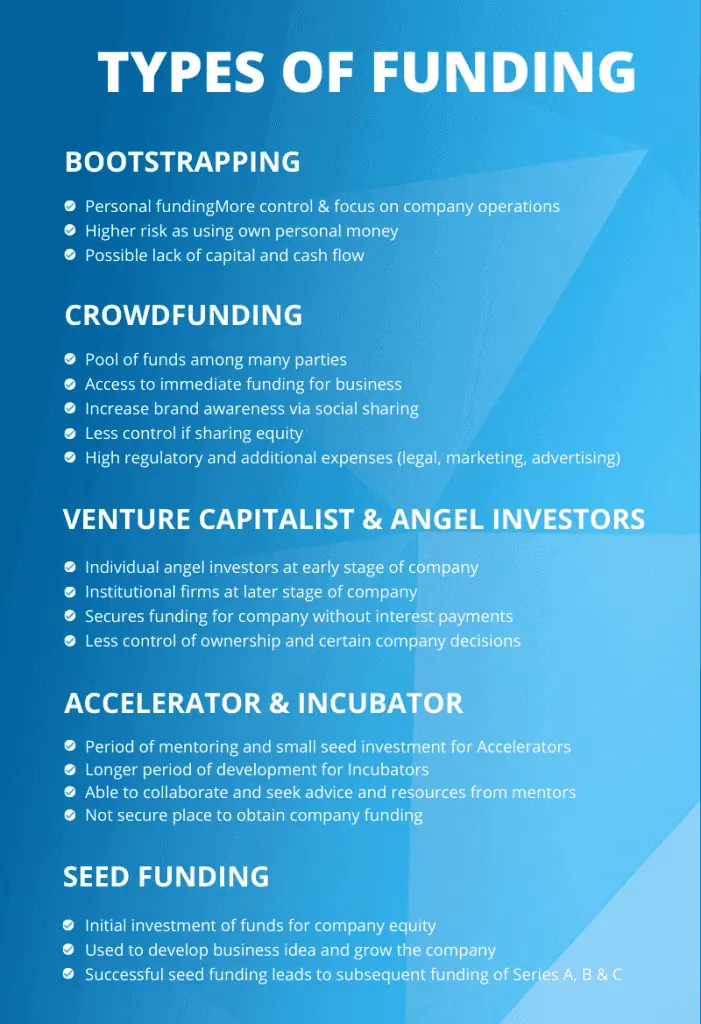
Crowdfunding
Crowdfunding is usually done online, using websites that allow start-ups to provide information about their company, product, or service for others to examine and determine whether or not they want to invest.
Individuals might be given the option of choosing how much money they want to invest, or corporations can provide packages that reward investors. Many of these platforms also promote openness, allowing businesses to display how much money they have raised or the financial target they are aiming for.
Bootstrapping
Any startup that bootstraps are essentially supporting the firm using personal cash, which is typically a credit card or the owner's savings. The owners that choose this route typically want to improve the product they're putting out on the market and eventually make more money from it.
Investors provide venture financing to start-ups and small businesses that they feel have the potential for long-term growth. Well-heeled investors, as well as investment banks and other financial institutions, are the most common sources. Investors frequently have similar market interests as the company and are looking for a product or service with strong competitive advantages and a large prospective market.
Investors could also be prepared to provide administrative and technical skills. Venture capitalists, on the other hand, frequently desire a role in corporate decisions and to keep their own interests in mind.
Individuals with industry expertise and experience who can also give financial assistance to a start-up are known as angel investors. These are usually seasoned entrepreneurs that want to assist new business owners. When it comes to investment, they usually don't take more than 10-20% equity. This enables them to provide motivation and alignment to business founders without detracting from their job as founders.
Accelerator
An accelerator provides a brief but crucial time of coaching in exchange for a tiny initial investment. And, due to the high level of competition, getting into one of the top accelerator programmes is usually not simple. The businesses should graduate from the accelerator after one to four months and approach Venture Capitalists for additional investment.
Incubators are places where entrepreneurs may develop their ideas and turn them into businesses. Universities, governments, and economic development groups typically fund these incubators. Incubators, unlike accelerators, have a less tight time period, do not supply funding, and do not have a thorough training programme. In addition, they try to achieve success faster than accelerators.
Some firms spend years in incubators developing their goods, while others release them in a matter of weeks. Incubators benefit from low-cost office space and engagement with other innovators, whilst accelerators benefit from training and instructions. Because of the benefits of both, several businesses participate in both.
Seed fundings
Another sort of funding is seed funding, which is the most prevalent type of capital used to start and expand a firm. Seed money is the first investment made in a business in exchange for a share of the company's stock.
A seed round, often known as seed funding, is the company's first round of capital. The Series A round of fundraising follows, followed by the Series B round, and so on. Venture capitalists (VCs) and angel investors join during the Series A stage. The rounds will continue until the firm is able to make enough money to grow. As a result, it's critical to grasp the differences between each of the fundraising rounds in order to effectively interpret newspaper headlines about any type of investment and startups, as well as your company's investments.
Grants are financial resources provided by governments, organizations, foundations, or institutions to support specific projects, initiatives, or individuals. They are non-repayable funds awarded based on various criteria, such as the merit of the proposal, the alignment with the grantor's objectives, or the intended impact of the project.
Grants can be available for a wide range of purposes, including scientific research, education, arts and culture, social programs, environmental conservation, entrepreneurship, and community development. They are typically awarded through a competitive application process, where applicants submit detailed proposals outlining their project's objectives, plans, budget, and expected outcomes. The grantor reviews the proposals and selects recipients based on their eligibility and the strength of their submissions.
Starting a business can be a dream for everyone but understanding where to begin and how to sustain your business is another concern. Learning the essentials about how to start a business is crucial to every startup.
Building a business might take some time but when your business starts to operate and becomes self-sustaining, it is the most rewarding thing ever. That's when you know you've taken the proper steps to turn your dream business become a reality.
A Complete Guide to Start A Business in Malaysia 202 3
How to Fund Your Start-Up Business in Malaysia in 2021
Starting A Business in Malaysia: How to Get Funding for a Start-Up
TYPES OF FUNDING
What Is a Startup?

How useful was this post?
Click on a star to rate it!
Average rating 4.9 / 5. Vote count: 16
No votes so far! Be the first to rate this post.

Save more on every Grab ride you take when you pay with any of these five Singaporean credit cards.

5 steps to starting a business in Malaysia

Are you ready to break free from the 9 to 5 grind and dive into the world of entrepreneurship? Embarking on a business venture is a thrilling and fulfilling endeavor, but the precise roadmap to get started isn't always crystal clear. To guide you through the process, here's a comprehensive guide on how to initiate a small business in Malaysia.
Step 1: Refine your business plan
Transitioning from a mere idea to a viable business concept requires careful consideration. Begin by assessing your business idea's feasibility in terms of time commitment, required investment, and potential returns. Although following your passion is advised, it's equally crucial to evaluate its profitability and competitive edge. For instance, if your passion is baking, analyze its viability against local bakeries and find ways to stand out.
- What is your passion or expertise?
- What aspects of the business do you find less appealing?
- Who constitutes your target demographic?
- How can your products or services distinguish themselves?
Step 2: Understand your competitors and the market
While it's tempting to concentrate solely on product development, understanding your market and competitors is paramount. Prospective lenders, investors, and collaborators will want to know your unique value proposition. In a saturated market, seek innovative angles. For instance, if you're offering car wash services, consider door-to-door convenience as your distinctive approach. Conduct surveys, questionnaires, and interviews to delve into your target audience's preferences and needs. By gathering these insights, you'll be better equipped to tailor your business to meet customer demands.
Step 3: Conduct a SWOT analysis
Short for strengths, weaknesses, opportunities, and threats, conducting a SWOT analysis helps you to identify how your product might perform if taken to the public. This evaluation not only anticipates how your product will fare in the market but also guides its strategic direction. Unearth potential weaknesses previously overlooked and identify opportunities ripe for exploitation.
Step 4: Register your business
After sorting out your business plan, it’s time for you to decide on what type of business suits you best. Here are the three types of businesses that are most commonly registered in Malaysia:
| Sole Proprietorship | Partnership | Sendirian Berhad |
| Enterprise or Trading | Wandagal and Partners | Sdn Bhd or Private Limited |
| Only 1 registered owner | 2 to 20 registered owners | A minimum of one director who as well as a minimum of one shareholder |
| RM100+ | RM100+ | RM1,160+ |
The first two options are the most popular types of business among the Small Medium Enterprise (SME) owners in Malaysia - mostly because they are cheaper.
All businesses have to be registered with the Companies Commission of Malaysia (SSM) . Once registered with SSM, a Business Registration Certificate will be issued to you within an hour. Depending on which you decide on, your business will then be valid for one to five years and can be renewed on an annual basis.
Step 5: Seek out funding if necessary
There are several ways you can fund your businesses in Malaysia:
- Advanced cash option from banks
- SME Bank Programmes
- Personal loans from banks. Compare the best personal loan that suits your need, here .
- Equity crowdfunding (ECF) platforms
Of course, there are still many more steps to starting a business e.g marketing, hiring a team, selecting suitable business tools, etc. However, the bottom line is that starting a business takes time, effort, and perseverance. If you’re willing to put in the effort, you might achieve your goals. Before starting a business, be sure to do your research, create a solid business plan, and be patient. After all, Rome wasn’t built in a day!
With creative wit and an immense passion for writing in her back pocket, Rachel Lee creates impactful content about finance, lifestyle, and more.
Related Articles

Applications for RM48.52 million micro financing programme now open to small business owners

Kos sebanyak RM7,800 ditetapkan untuk pengambilan pekerja domestik Indonesia
Financial tip:, use a personal loan to consolidate your outstanding debt at a lower interest rate.
© 2022 CompareHero.my (Compargo Malaysia Sdn Bhd, 201301020939). All rights reserved. Use of this site constitutes acceptance of our Terms of Use and Privacy Policy.

Best Email Signature Generator Websites Secretly Used By Branding Agencies

Best AI Writing Tools for Online Businesses in 2024
How to start a business in malaysia, a complete guide to start a business in malaysia 2024, introduction to entrepreneurship in malaysia.
Embarking on the entrepreneurial journey and establishing a business that aligns with your personal values and aspirations is an incredibly rewarding endeavor. In Malaysia, small and medium-sized enterprises (SMEs) play a pivotal role in the national economy, shaping the business landscape and providing employment to millions.
Challenges in Starting a Business
However, launching a business in Malaysia comes with unique challenges. Startups require meticulous planning and thorough market research, alongside adequate resources, to boost their chances of success. Unfortunately, without these elements, many new businesses risk not surviving beyond their initial years.
Key Steps in Business Launch
Crucially, it is essential to gain a deep understanding of your target market, craft a comprehensive business plan, and formulate a practical strategy for securing finances and launching your business. Equally important is acquainting yourself with the specific legal and regulatory frameworks in Malaysia.
Comprehensive Guide to Business Startup in Malaysia
In this guide, we delve into the essential steps of the business startup process in Malaysia. These include conducting robust market research, developing a strategic business plan, selecting the appropriate business structure, and securing the necessary funding for a successful launch.
Assessing Your Business Idea and Conducting Market Research
Before drafting a business plan in Malaysia, validating your business concept through market research is crucial. This step helps ascertain your business’s potential role in the market.
Identifying Your Target Customer
Understanding your ideal customer allows you to tailor your offerings, ensuring that your marketing efforts target the right audience.
Understanding the Competition
Analyzing your competitors in Malaysia provides insights into their strengths and weaknesses, aiding in differentiating your business.
Spotting Market Trends and Opportunities
Research enables you to understand current demands and identify potential growth areas in the Malaysian market.
Enhancing Financial Projections
A solid understanding of the market refines your financial forecasts, including revenue and growth projections, crucial for securing funding and strategic planning.
Pricing Strategy Insights
Market research also provides insights into competitors’ pricing strategies, helping you determine competitive pricing for your products or services in Malaysia.
By thoroughly exploring market research, you gain invaluable insights that inform your business strategy, ensuring your venture is well-positioned in the Malaysian market.
Overview of Market Research Methods
For Malaysian entrepreneurs, comprehensive market research is crucial in shaping a successful business strategy. Here are several effective approaches:
Surveying Potential Customers
Conducting surveys is an invaluable method to understand the needs, preferences, and purchasing tendencies of your potential customer base in Malaysia. The feedback gathered can be instrumental in tailoring your products or services to better meet market demands.
Analyzing Competitors
Investigating your competitors’ offerings, pricing structures, marketing tactics, and customer feedback is essential. This analysis can reveal both opportunities and threats within the Malaysian market, allowing you to strategically position your business.
Running Focus Groups
Organizing focus groups with a small, diverse set of individuals can provide deeper insights into customer attitudes and behaviors. This method is particularly beneficial for gauging reactions to specific products or concepts, offering a more nuanced understanding of potential market reception.
Leveraging Online Research
Utilizing the internet for data gathering is increasingly important. This encompasses exploring industry reports, analyzing social media trends, reviewing online customer feedback, and leveraging tools like Google Trends to understand customer search behaviors in Malaysia.
Emphasizing SWOT Analysis
Conducting a SWOT (Strengths, Weaknesses, Opportunities, Threats) Analysis on your business idea or plan is a critical strategic planning technique. It helps identify internal and external factors that could impact your business’s success in Malaysia.
These research methods provide a comprehensive understanding of the Malaysian market. Armed with this knowledge, you can make informed decisions and craft a business plan that resonates effectively with your target audience.
Introduction to Market Research Methods
For Malaysian entrepreneurs, comprehensive market research is pivotal in shaping a successful business strategy. Various effective approaches can be utilized:
Conducting surveys is an invaluable method to understand the needs, preferences, and purchasing tendencies of your potential customer base in Malaysia. Gathering this feedback is crucial as it can be instrumental in tailoring your products or services to better meet market demands.
Investigating your competitors’ offerings, pricing structures, marketing tactics, and customer feedback is essential for a thorough market analysis. This approach can reveal both opportunities and threats within the Malaysian market, enabling you to strategically position your business.
Organizing focus groups with a small, diverse set of individuals offers deeper insights into customer attitudes and behaviors. This method is particularly beneficial for gauging reactions to specific products or concepts, providing a nuanced understanding of potential market reception.
Utilizing the internet for data gathering has become increasingly important. This includes exploring industry reports, analyzing social media trends, reviewing online customer feedback, and using tools like Google Trends to understand customer search behaviors in Malaysia.
Conducting a SWOT (Strengths, Weaknesses, Opportunities, Threats) Analysis on your business idea or plan is a crucial strategic planning technique. It assists in identifying internal and external factors that could impact the success of your business in Malaysia.
These methods collectively offer a comprehensive understanding of the Malaysian market. Equipped with this knowledge, entrepreneurs can make informed decisions and craft a business plan that resonates effectively with their target audience.
Business Plan Template
For an efficient approach, consider utilizing a business plan template. While the Princes Trust offers a commendable template, opting for one tailored specifically to the Malaysian market and business context could be more advantageous. This adaptation ensures that your plan is in harmony with the local market conditions and adheres to customary business practices in Malaysia. Using transitional phrases like “while,” “opting for,” and “this adaptation” creates a more fluid connection between the ideas.
Choosing a Business Structure
Selecting the right business structure is a critical decision for entrepreneurs in Malaysia, as it influences various aspects of your business, including legal, financial, and operational facets.
- Legal and Financial Liability : Your choice of business structure will significantly affect your personal legal and financial liabilities. For instance, a sole proprietorship in Malaysia means you are personally liable for all debts and legal issues. Conversely, a private limited company (Sdn Bhd) limits your liability to your share in the company.
- Taxation : Different business structures are subject to varying tax regulations in Malaysia. Sole proprietorships and partnerships typically face different tax obligations compared to a private limited company, which is taxed as a separate legal entity.
- Fundraising Abilities : Your chosen structure can impact your ability to raise capital or attract investors. Corporate structures like a private limited company can issue shares, making it easier to attract investors, while other structures might pose challenges in this regard.
- Paperwork and Compliance : Each business structure comes with its own set of paperwork and compliance requirements. A private limited company, for instance, requires more rigorous compliance and reporting compared to a sole proprietorship or partnership.
It’s crucial to choose the appropriate business structure to avoid potential legal and financial issues in the future.
Main Types of Business Structures in Malaysia:
- Sole Proprietorship : A single individual owns and runs the business, bearing full responsibility for its liabilities and obligations.
- Partnership : A business owned and operated by two or more individuals, sharing profits, losses, and liabilities.
- Private Limited Company (Sdn Bhd) : A more complex structure where the company is a separate legal entity from its owners, offering limited liability to its shareholders.
- Public Limited Company (Bhd) : Suitable for larger businesses, this structure allows the company to be publicly listed and raise capital through the stock market.
- Limited Liability Partnership (LLP) : Combines the flexibility of a partnership with the limited liability of a corporation.
Each business structure presents unique advantages and disadvantages, catering to varied business needs and sizes. It’s crucial to evaluate factors such as your business’s size, your tolerance for risk, and your long-term objectives when selecting the appropriate structure for your venture in Malaysia.
Selecting the ideal business structure is fundamental for Malaysian entrepreneurs, as it influences legal and financial concerns, operational dynamics, and the sustainability of the business. Let’s delve into the specific pros and cons of different business structures within the Malaysian context:
Sole Proprietorship
A sole proprietorship in Malaysia is a business owned and operated by one individual.
- Simple to Establish and Manage : The process of setting up and operating a sole proprietorship is straightforward.
- Full Control : The owner has complete authority over all business decisions.
- Decision-Making Flexibility : Quick and autonomous decision-making is possible.
- Tax Benefits : Potential tax advantages due to simpler tax filings.
- Unlimited Liability : The owner is personally liable for all business debts and obligations.
- Limited Financial Resources : Access to capital may be restricted compared to other structures.
- Transferability Issues : Difficulties may arise in transferring ownership.
- Continuity Concerns : The business generally ceases upon the owner’s departure.
Partnership
In Malaysia, a partnership involves two or more individuals sharing ownership.
- Shared Responsibility : Partners share financial and managerial duties.
- Resource and Expertise Pooling : Increased access to diverse skills and resources.
- Enhanced Credibility : Potential for increased trustworthiness and network expansion.
- Tax Benefits : Partnerships may enjoy certain tax advantages.
- Partner Disputes : Risks of conflicts among partners.
- Joint Liability : Shared responsibility for business debts.
- Dissolution Challenges : Potential complexities in ending the partnership.
- Limited Individual Control : Partners may have less autonomy.
Private Limited Company (Sdn Bhd)
A private limited company in Malaysia operates as a separate legal entity from its owners.
- Limited Liability : Shareholders’ liability is limited to their investment.
- Tax Benefits : Potential tax advantages and incentives.
- Capital Raising : Easier to raise capital through share issuance.
- Professional Image : Enhanced credibility with customers and suppliers.
- Separate Entity : Distinction between personal and business finances.
- Operational Complexity : More complex to set up and manage.
- Regulatory Compliance : Higher level of legal and regulatory obligations.
- Financial Transparency : Requirement for regular financial reporting.
- Director Responsibilities : Directors are subject to legal duties.
Cooperative
A cooperative in Malaysia is a collectively owned and democratically controlled enterprise.
- Democratic Control : Members share decision-making authority.
- Tax Benefits : Possible tax incentives.
- Resource Sharing : Collective pooling of resources and risk.
- Community Credibility : Enhanced trust among customers and suppliers.
- Member Engagement : High level of member commitment and motivation.
- Operational Complexity : More challenging to set up and operate.
- Capital Limitations : Difficulties in raising capital via share sales.
- Investment Attraction : Limited capacity to attract external investors.
- Limited Liability : Possibly less protection than a private limited company.
- Administrative Demands : Higher administrative responsibilities.
When selecting a business structure in Malaysia, consider your business’s size, nature, personal liability tolerance, and potential tax implications. It’s advisable to consult a professional, like an accountant or legal advisor, for tailored advice.
How to Finance a Start-up Business
In Malaysia, there are several avenues for financing a startup, similar to those in the UK, each with unique features and benefits:
Financing Options for Malaysian Startups
Startup loans.
Startup loans, including term loans, lines of credit, and government-backed loans, are a fundamental financing option. While securing traditional bank financing might be challenging for startups, Malaysian agencies like SME Corp, Bank Negara Malaysia, and others provide various financing alternatives. These are designed to support the unique needs of emerging businesses.
The Malaysian government and various organizations offer grants for small businesses and startups. Notable examples include grants from Cradle Fund, MATRADE, and MDEC. These grants are particularly attractive as they provide financial support without the requirement for repayment, making them a favorable option for startups looking to minimize financial liabilities.
Equity and Debt Investment
Investment in startups can come in the form of equity investment, where investors own a portion of the business, or debt investment, where investors lend money in expectation of a return. In Malaysia, venture capital firms and individual investors are actively seeking promising startups to invest in, providing a significant opportunity for business growth.
Angel Funding
Angel investors in Malaysia are typically experienced entrepreneurs who invest in startups in exchange for equity. Networks such as the Malaysian Business Angel Network (MBAN) are valuable resources for connecting with angel investors. These investors not only provide capital but also mentorship and industry connections, which can be invaluable for a startup’s development and success.
Overall, these financing options offer diverse opportunities for Malaysian startups to secure the funding they need. Each option has its own advantages and can be tailored to suit the specific requirements of a startup, ensuring a robust financial foundation for business growth.
Support and Mentorship for Malaysian Startups
Malaysian global innovation & creativity centre (magic).
MaGIC offers accelerator programs, mentorship, and resources for entrepreneurs. This center is a hub for innovation and provides crucial support in the early stages of a startup’s development.
SME Corporation Malaysia (SME Corp.)
SME Corp. provides advice, training, and financial assistance for small and medium enterprises. They are a vital resource for businesses seeking guidance and support in various aspects of their operations.
Cradle Fund
Cradle Fund specializes in funding and support for tech startups, including coaching and mentorship. This organization is key for startups looking to break into the tech industry with a solid backing.
Local Chambers of Commerce
Local Chambers of Commerce are excellent for networking, advice, and business support. They offer a platform to connect with other business professionals and access to valuable industry insights.
Building a Team for Your Malaysian Startup
Identifying key roles and tasks.
- Regular Tasks : Identify tasks that require frequent attention in your business.
- Skills and Experience : Determine the specific skills or experience necessary for these tasks.
- Time and Resources : Assess the time and resources needed for task completion.
Typical Roles in a Startup
- Founder/MD : Responsible for the company’s overall strategy and vision.
- Sales and Marketing : Focuses on customer acquisition and business promotion.
- Operations : Manages the day-to-day activities of the business.
- Finance : Oversees the financial health of the company.
- IT/Tech : Maintains and updates technology systems.
Hiring Process
- Advertise : Post job listings on various platforms to attract candidates.
- Network : Leverage connections to find potential candidates.
- Interviews : Conduct interviews to assess qualifications and cultural fit.
- Job Offers : Negotiate terms and onboard new hires.
Finding individuals who not only possess the right skills but also align with your company’s culture is crucial for the long-term success of your startup in Malaysia.
By understanding the resources available for support and mentorship and strategically building your team, you can lay a strong foundation for the success of your startup in Malaysia.
Detailed Financing Options for Malaysian Startups
- Types : Includes term loans, revolving credit lines, and government-backed financing.
- Providers : Banks, financial institutions, and government agencies like Bank Negara Malaysia, SME Bank, and others.
- Challenges : Traditional bank loans may have stringent requirements, but alternative lenders or government programs often offer more startup-friendly options.
- Government Grants : Such as those from Malaysian Digital Economy Corporation (MDEC), MATRADE for export assistance, and Cradle Fund for tech startups.
- Characteristics : Grants are ideal as they do not require repayment.
- Application : Typically involves a detailed proposal outlining the business idea, market potential, and how the grant will be used.
- Equity Investment : Involves selling a stake in the business to investors.
- Debt Investment : Entails borrowing funds with the promise of repayment with interest.
- Sources : Venture capital firms, angel investors, and private equity funds.
- Networks : Malaysian Business Angel Network (MBAN) is a prominent platform connecting startups with angel investors.
- Benefits : Besides funding, angels often provide mentoring and access to their business networks.
- Consideration : Equity is typically exchanged for investment, impacting ownership and control.
In-Depth Guide on Building a Team for Malaysian Startups
- Core Functions : Determine the essential functions like product development, sales, marketing, operations, finance, and IT.
- Skill Assessment : Match these functions with the necessary skill sets and experience levels.
- Job Listings : Utilize popular job portals in Malaysia like JobStreet, LinkedIn, and WOBB.
- Networking : Engage with professional networks, industry events, and startup meetups to find potential candidates.
- Process : Conduct a thorough interview process to assess technical skills, experience, and cultural fit.
- Criteria : Look for adaptability, entrepreneurial spirit, and alignment with the startup’s vision.
- Orientation : Introduce new hires to the company culture, goals, and operational procedures.
- Training : Provide necessary training to equip them with the tools and knowledge for their role.
- Importance of Culture : Ensure that team members share the startup’s values and vision.
- Team Building : Foster a collaborative environment to maintain high team morale and productivity.
Support and Mentorship Resources for Startups in Malaysia
- MaGIC : Offers extensive resources for entrepreneurs, including mentorship programs and startup bootcamps.
- SME Corp Malaysia : Provides guidance, training, and support specifically tailored to SMEs.
- Cradle Fund : Not just for funding, but also for valuable business advice and connections in the tech sector.
- Local Chambers of Commerce : Excellent for networking opportunities and local business insights.
In conclusion, for Malaysian entrepreneurs, understanding these detailed aspects of financing and team building is crucial for a successful startup launch and sustained growth.
Launching and Marketing Your Business
Launching a business in Malaysia also starts with choosing the right business name, which is a critical step in establishing your brand identity. Here are key considerations tailored for the Malaysian market:
Choosing a Memorable Business Name in Malaysia
- Catchiness : Select a name that’s catchy, easy to remember, and pronounce. A memorable name can enhance customer recall and facilitate word-of-mouth marketing.
- Cultural Relevance : Ensure the name resonates well with the Malaysian market, considering linguistic and cultural nuances.
- Trademark Search : Use the Intellectual Property Corporation of Malaysia (MyIPO) database to ensure your chosen name isn’t already trademarked.
- Company Registration : Check with the Companies Commission of Malaysia (SSM) for name availability to avoid legal issues and ensure smooth registration.
- Scalability : Choose a name that doesn’t limit your business’s potential expansion. Avoid overly specific names that might restrict diversification in products or services.
- Long-Term Vision : Align the name with your long-term business goals and vision.
- Ease of Use : A shorter, simpler name is easier to remember, spell, and search for online, which is crucial in the digital age.
- Marketing Efficiency : Simpler names are more effective for branding and marketing materials.
Additional Tips for Malaysian Entrepreneurs
- Cultural Sensitivity : Be mindful of cultural sensitivities in multi-ethnic Malaysia. The name should be respectful and appealing across different communities.
- Domain Availability : Check for the availability of a corresponding web domain for your business name, as this is crucial for your online presence.
- Language Considerations : Consider a name that’s easily translatable or understandable in both Bahasa Malaysia and English, given the bilingual nature of the Malaysian market.
Selecting the right business name in Malaysia is more than just a creative exercise; it’s a strategic decision that can significantly influence your brand’s identity and perception in the market.
In Malaysia, the process for registering a company is somewhat similar, but it’s overseen by the Companies Commission of Malaysia (SSM). Here are the key steps for registering a company in Malaysia for comparison:
- Name Search and Reservation : Similar to the UK, you must choose a unique name for your company in Malaysia and get it approved by SSM.
- Registered Office Address : A company in Malaysia must have a registered office address within the country where all communications and notices can be addressed.
- Appointment of Directors and Company Secretary : Malaysian companies must have at least one director who is a resident of Malaysia. Additionally, the appointment of a company secretary, who is a member of a professional body prescribed by the Ministry of Domestic Trade and Consumer Affairs or licensed by SSM, is mandatory.
- Preparation of Documents : This includes the Memorandum and Articles of Association (M&A), declaration by a director or promoter before appointment, and a statutory declaration by a secretary or director stating compliance with all registration requirements.
- Submission and Registration with SSM : All documents, along with the required registration fee, must be submitted to SSM for registration.
- Issuance of Certificate of Registration : Similar to the UK, upon successful registration, SSM will issue a Certificate of Registration.
Comparatively, both processes emphasize the importance of a unique company name, a local registered address, the appointment of key personnel, and the submission of specific legal documents. However, the specific requirements, such as the need for a local director in Malaysia and a company secretary, highlight the unique regulatory environments in each country.
Open a Business Bank Account
Opening a business bank account in malaysia.
In Malaysia, if you are establishing a limited company, limited partnership, or LLP, it is legally mandatory to have a separate bank account for your business. For sole proprietors, it’s not a legal requirement, but maintaining separate accounts for personal and business finances is highly recommended. This practice aids in easier management of cash flow and tracking of income and expenses.
When choosing a bank, compare the fees and services offered by various banks to find the best option for your business needs. The documents required typically include your business registration certificate, articles of association (if applicable), and proof of address. Banks might also request identification documents from the directors or shareholders of the company.
Once you choose a bank, complete the application form and submit the required documents. The process duration varies, but some banks offer expedited services for quicker account setup.
Obtaining Necessary Business Licenses and Permits in Malaysia
The type of business you are starting and its location will determine the specific licenses and permits needed to operate legally in Malaysia. Here are examples of businesses and the licenses or permits they may require:
- Food Businesses: Similar to the UK, businesses involved in producing, processing, packaging, or selling food must register with the local authority. They must adhere to Malaysia’s food safety regulations. This category includes restaurants, cafes, bakeries, food trucks, and food product retailers or distributors.
- Alcohol and Tobacco Businesses: Businesses selling alcohol, tobacco, or other age-restricted products need to obtain a license from the local authority. This encompasses pubs, bars, nightclubs, and retail outlets dealing in alcohol and tobacco products.
- Transport and Logistics Businesses: Companies operating vehicles for goods or passenger transportation, like taxi services, delivery companies, and logistics firms, must secure licenses from relevant authorities, including local councils and transport departments.
- Construction Businesses: Construction-related businesses, such as builders, architects, and engineers, need to obtain relevant permits and licenses from local authorities and adhere to regulations set by professional regulatory bodies.
- Health and Beauty Businesses: Entities offering health and beauty services, like hair salons, barbers, beauty salons, and tattoo parlors, must secure necessary permits from local authorities and comply with specific industry regulations.
- Sales and Marketing Businesses: If your business involves telemarketing or processing payments, registration with relevant authorities like the Financial Services Authority of Malaysia might be necessary. Additionally, adherence to data protection laws is crucial.
It’s important to research and understand the specific regulatory requirements for your business type in Malaysia to ensure legal compliance.
Set up Your Business Location
Choosing a business location in malaysia.
Selecting the right location for your business in Malaysia is crucial, whether you’re leasing or buying commercial space, or setting up a home office. Here are some essential factors to consider:
- Accessibility : Assess how easily the location can be reached by car, public transportation, or on foot. Consider if it is situated in an area that is central and convenient for your target customers. In Malaysia, proximity to well-connected roads and public transport hubs can be a significant advantage.
- Visibility : A location on a busy street or in a popular shopping centre can naturally attract more customers. Visibility is especially important for retail businesses or those that rely heavily on foot traffic.
- Building Suitability : The facility should have sufficient power supply, water, appropriate heating and cooling systems, reliable internet connectivity, and essential safety features. In Malaysia’s tropical climate, effective cooling systems are particularly important.
- Demographics : Research the area to understand the local population and whether there are similar businesses nearby. This can give insights into competition and market saturation. For instance, opening a retail store in a location with a high concentration of similar outlets might increase competition, but it could also indicate a high demand for such services.
- Cost : Factor in the rental or purchase price, alongside additional expenses like utility bills, property taxes, and insurance. In Malaysia, these costs can vary significantly depending on the location, with major cities like Kuala Lumpur generally being more expensive than other regions.
- Local Regulations and Zoning Laws : Different areas in Malaysia may have specific zoning laws and local regulations that can affect your business operations. Ensure that your business type is permissible in the chosen location and that you comply with all local guidelines.
- Potential for Growth : Consider whether the location offers room for expansion and if it aligns with your long-term business goals. A space that suits your current needs but lacks potential for growth might not be a wise choice in the long run.
- Community and Network Opportunities : Being in a location that offers networking opportunities with other businesses and integrates well with the community can be advantageous, especially for new ventures.
Remember, the ideal location varies depending on the nature of your business. For instance, a tech startup might prioritize high-speed internet and proximity to a tech hub, while a retail store would benefit more from high foot traffic areas. Conduct thorough research and consider seeking advice from local business consultants or real estate experts to make an informed decision.
Don’t Forget Business Insurance
Business insurance types in malaysia.
In Malaysia, just like in many other countries, business insurance is essential for protection against various risks. Here are common types of business insurance that you might consider:
- General Liability Insurance : This insurance covers claims of bodily injury or property damage caused by your business operations. It’s crucial for most businesses, particularly those with physical premises where customers visit.
- Property Insurance : Protects against damage or loss to business property, including buildings, equipment, and inventory. This is important for businesses with significant investment in physical assets.
- Business Interruption Insurance : Covers losses resulting from a business interruption due to disasters or other covered events. It can help maintain cash flow when operations are temporarily halted.
- Professional Liability Insurance (Errors and Omissions) : For businesses offering professional services, this insurance protects against negligence claims related to their services.
- Workers’ Compensation Insurance : This is essential for businesses with employees in Malaysia. It provides benefits to employees who are injured or become ill due to their job.
- Cyber Liability Insurance : As businesses increasingly rely on digital operations, this insurance is vital to protect against losses from data breaches or cyber-attacks.
- Automobile Insurance : If your business uses vehicles, this insurance is necessary to cover any damage they might cause in accidents.
- Product Liability Insurance : For manufacturers or retailers, this insurance protects against injury or damage claims related to products sold.
Creating an Actionable Marketing Plan in Malaysia
To effectively market your business in Malaysia, follow these steps:
- Conduct Market Research : Understand your target market in Malaysia, including demographics and buying habits. Identify local competitors and market size.
- Define Your USP : What sets your business apart in the Malaysian market? This will guide your branding and marketing strategies.
- Set Marketing Objectives : Develop SMART objectives, such as increasing online engagement or expanding your customer base in specific Malaysian regions.
- Develop a Target Audience : Create detailed buyer personas relevant to the Malaysian market to tailor your marketing strategies effectively.
- Create a Marketing Mix : Blend traditional and digital marketing strategies suitable for Malaysia. Consider local preferences and media consumption habits.
- Implement and Manage : Execute your strategies with a focus on budget, resources, and timelines. Use local insights to guide your approach.
- Review and Adjust : Regularly assess the effectiveness of your marketing efforts and adjust based on performance data and customer feedback.
Staying Business Compliant in Malaysia
Ensuring compliance with Malaysian laws and regulations is critical:
- Research : Understand the specific laws and regulations that apply to your industry in Malaysia. This might include local business laws, tax regulations, and industry-specific guidelines.
- Understand the Risks : Recognize risks related to legal liability, health and safety standards, and data protection specific to Malaysia.
- Seek Professional Advice : Consulting with local lawyers, accountants, or compliance consultants can provide valuable insights into Malaysian business compliance requirements.
- Create a Compliance Program : Develop policies and procedures tailored to ensure adherence to Malaysian laws and regulations.
- Stay Current : Regularly update your compliance program to reflect changes in Malaysian laws and industry standards.
- Train Employees : Educate your team about compliance responsibilities relevant to their roles in the Malaysian business context.
Business Launch Checklist for 2024
Here’s a revised checklist tailored for starting a business in Malaysia:
| Task | Completed |
|---|---|
| 1 | Is your business registered with the Companies Commission of Malaysia (SSM)? |
| 2 | Did you obtain the necessary licenses and permits for your business type? |
| 3 | Did you register with the Inland Revenue Board of Malaysia (LHDN) for tax purposes? |
| 4 | Have you established accounting and bookkeeping systems? |
| 5 | Did you open a business bank account? |
| 6 | Have you acquired the necessary business insurance? |
| 7 | Have you engaged a local accountant or accounting firm? |
| 8 | Did you create a website tailored for your target market? |
| 9 | Have you set up social media profiles on platforms popular in Malaysia? |
| 10 | Is your marketing plan ready for implementation in the Malaysian market? |
Make sure you’ve addressed each of these tasks before launching your business to ensure a smooth start and compliance with Malaysian regulations and market expectations.
Starting a Business FAQs for Malaysia
What are some common mistakes to avoid when starting a business.
- Inadequate Market Research : Not understanding the specific needs and preferences of the Malaysian market can lead to misguided strategies.
- Vague Business Plan : Lacking a clear, detailed business plan that outlines your goals, strategies, and financial projections.
- Insufficient Funding : Underestimating the amount of capital required to start and sustain the business until it becomes profitable.
- Overlooking Legal and Regulatory Compliance : Failing to adhere to Malaysian business laws, licensing requirements, and tax regulations.
- Ignoring Competition : Not analyzing local competitors thoroughly to understand your unique selling proposition in the Malaysian market.
How much money do I need to start a business in Malaysia?
The capital required varies greatly depending on the business type and scale. For a small online venture, a few thousand Malaysian Ringgit might suffice. However, opening a physical store or a manufacturing unit can require significantly more, potentially going into hundreds of thousands of Ringgit. Costs to consider include licensing fees, rental or purchase of premises, equipment, initial stock or materials, staffing, and marketing.
What are some common funding sources for starting a business in Malaysia?
- Personal Savings : Using your own funds to start the business.
- Loans from Family and Friends : Borrowing money from personal contacts.
- Crowdfunding : Utilizing platforms like PitchIN to raise funds from a large number of people, often in exchange for early access to products or equity.
- Government Grants and Incentives : Exploring grants offered by Malaysian government agencies like SME Corp, MDEC, and others.
- Bank Loans : Securing loans from Malaysian banks, often requiring detailed business plans and financial projections.
- Angel Investors and Venture Capital : Finding investors who provide capital for startups, usually in exchange for ownership equity or convertible debt.
When creating a business plan, especially in the context of Malaysia, it’s crucial to focus on several key components:
- Executive Summary : This section should provide a concise overview of your business, including your mission statement, the product or service offered, and basic information about your company’s leadership team, employees, and location.
- Target Market Analysis : Thoroughly understand and define your target market in Malaysia. Include demographics, psychographics, purchasing habits, and how your product or service meets their needs.
- Competition Analysis : Identify your direct and indirect competitors in the Malaysian market. Analyze their strengths and weaknesses and how you can differentiate your business.
- Product or Service Description : Clearly describe what you’re selling or the service you’re providing. Explain how it benefits your target market and why it’s superior to or different from what’s currently available.
- Marketing and Sales Strategies : Develop a detailed plan for attracting and retaining customers. This should include pricing, promotion, advertising, sales strategies, and digital marketing approaches suitable for the Malaysian audience.
- Financial Projections : Present detailed financial projections including startup costs, budget, cash flow, income statements, and balance sheets. For the Malaysian market, consider local economic factors, cost structures, and pricing strategies.
- Operational Plan : Outline the logistics of running your business, including your location, equipment, labor, suppliers, and any other resources needed to operate effectively in Malaysia.
- Management Team : Highlight the experience and skills of your management team, focusing on how these qualities will contribute to the success of your business in Malaysia.
- Goals and Objectives : Set clear, measurable goals for your business. This might include short-term objectives and long-term aspirations, such as market penetration rates, revenue targets, or expansion plans.
- Funding Requirements : If you’re seeking funding, specify the amount needed, how it will be used, and potential return on investment. For Malaysian startups, consider both local and international funding sources.
- Appendix : Include any additional information like resumes of key personnel, legal documents, detailed market research findings, or technical specifications.
Creating a comprehensive business plan tailored to the Malaysian market and your specific sector can significantly increase your chances of success. It should be a living document, regularly updated as your business evolves.
How do I know if my business idea is viable?
Determining the viability of your business idea, particularly in the Malaysian market, involves several key steps:
- Demand Analysis : Assess whether there is a demand for your product or service in Malaysia. Look for trends, consumer behaviors, and specific needs that your business could meet.
- Target Market Identification : Define who your potential customers are, including their demographics, purchasing power, preferences, and behaviors.
- Market Size : Estimate the number of potential customers and the overall revenue potential within your target market in Malaysia.
- Growth Trends : Look into how the market has been growing or changing. Are there emerging trends that your business can capitalize on?
- Identify Competitors : List out existing businesses that offer similar products or services in Malaysia.
- Analyze Their Strengths and Weaknesses : Understand what your competitors do well and where they fall short. This can help you identify market gaps.
- Conduct a SWOT analysis to evaluate the internal strengths and weaknesses of your business idea and the external opportunities and threats in the Malaysian market.
- Cost Analysis : Calculate the startup and operational costs of your business.
- Revenue Projections : Estimate how much revenue your business can realistically generate in the Malaysian context.
- Break-even Analysis : Determine how long it will take for your business to become profitable.
- Research any Malaysian laws and regulations that could impact your business. This includes licensing, taxes, and industry-specific regulations.
- Prototyping/Minimum Viable Product (MVP) : Create a prototype or MVP to test in the market.
- Customer Feedback : Get feedback from potential customers to refine your product or service.
- Consult with business advisors, industry experts, or mentors familiar with the Malaysian market to get insights and feedback on your business idea.
- Draft a business plan outlining how your business will operate, your marketing strategy, and financial projections. This plan will be crucial for identifying any potential issues or areas that need more research.
What are the legal and regulatory requirements for starting a business?
When starting a business in Malaysia, there are several legal and regulatory requirements that you need to consider:
- Sole Proprietorship/Partnership : Register with the Companies Commission of Malaysia (SSM).
- Private Limited Company (Sdn Bhd) : Also requires registration with SSM, including a unique company name, at least one director and shareholder, and a registered office in Malaysia.
- Depending on your business type and location, you may need specific licenses and permits. For instance, food businesses require health and safety permits, while import-export businesses need a trade license.
- Local municipalities might have additional requirements for businesses operating within their jurisdictions.
- Register with the Inland Revenue Board of Malaysia (LHDN) for income tax purposes.
- If applicable, register for the Goods and Services Tax (GST).
- Comply with the Malaysian Employment Act, which includes regulations on minimum wages, working hours, holidays, and other employment conditions.
- Register with the Employees Provident Fund (EPF), Social Security Organization (SOCSO), and Employment Insurance System (EIS) for employee benefits.
- Adhere to the Personal Data Protection Act (PDPA) if your business involves collecting, using, or storing personal data.
- Certain industries, like finance, healthcare, and education, have specific regulations and might require additional licenses or compliance with specific regulatory bodies.
- Ensure compliance with Occupational Safety and Health laws to provide a safe working environment.
- Consider registering trademarks, patents, or copyrights if your business model involves unique products, services, or branding.
- Ensure that your business transactions, contracts, and agreements comply with Malaysian commercial laws.
- If applicable, comply with environmental laws and regulations, especially if your business involves manufacturing or waste management.
It’s crucial to do thorough research or consult with legal experts to understand all the legal and regulatory requirements for your specific business in Malaysia. Non-compliance can lead to legal issues, fines, or the inability to operate your business.
How do I build a team for my business?
Building a successful team for your business, especially within the Malaysian context, involves several key steps:
- Determine what roles are essential for your business operations. Consider the specific needs of your business type and the skills required to meet these needs.
- Create detailed job descriptions for each role, outlining responsibilities, required qualifications, and skills.
- Familiarize yourself with the Malaysian labor market, including prevailing wage rates, qualifications, and availability of talent in your industry.
- Define your company’s culture and values. Look for candidates who not only have the right skills but also align with your company’s ethos.
- This alignment is particularly important in Malaysia’s diverse cultural landscape, where respect for varying norms and values is crucial.
- Utilize various recruitment channels such as online job portals (e.g., JobStreet Malaysia), local newspapers, industry-specific forums, and recruitment agencies.
- Networking and referrals can also be effective, especially in tightly-knit industry circles in Malaysia.
- Conduct thorough interviews to assess candidates’ skills, experience, and compatibility with your company culture.
- Consider involving multiple team members in the selection process to get diverse perspectives.
- Ensure compliance with Malaysian employment laws, including contracts, work permits (for foreign employees), and adherence to non-discrimination policies.
- Develop a comprehensive onboarding and training program to help new hires understand their roles and the business operations.
- Invest in ongoing training and professional development, which is particularly important in Malaysia’s rapidly evolving business environment.
- Foster a positive and collaborative work environment. Team-building activities and open communication channels can enhance team spirit.
- Be mindful of cultural sensitivities and foster an inclusive workplace that respects Malaysia’s diverse workforce.
- Implement a performance management system to set clear expectations, provide regular feedback, and recognize and reward good performance.
- Retention Strategies :
- Develop strategies to retain top talent, such as offering competitive compensation, career advancement opportunities, and a healthy work-life balance.
Building a strong team requires careful planning, a clear understanding of your business needs, and a commitment to nurturing and developing your employees. This is key to ensuring long-term success and growth of your business in Malaysia.
- Branding & Design
- Business Ideas
- Content Marketing
- Digital Marketing
- Grow Business
- How to Start a Business
- Local Marketing
- Run a Business
- Start a Business
- Team Building
- Types of Business Models
- Website Design
- antlanticpacific
- Award winning blogs
- best website design
- Blog Design
- boost business
- Chrome Extension
- creative layouts
- design trends
- fashionbomb
- Fitness blog
- fitness inspiration
- fitness tips
- fitness website
- health blog
- highsnobiety
- inspiration
- Inspirational Websites
- Lifestyle Blogs
- Lifestyle blogs Website design Blog design Inspirational websites User experience (UX) Visual appeal Award-winning blogs Top-rated blogs Design trends Creative layouts
- manrepeller
- Online presence
- sartarolist
- sartorialist
- social media
- theblondesalad
- Toprated blogs
- Types of Seo
- Visual Appeal
- Website designs
- whowhatwear
- workout blogs
Best DIY Blogs Website Design Examples
Best fitness blogs website design examples, best lifestyle blogs website design examples, best music website design blog examples, best fashion blogs website design examples, best business website design examples, 51 types of seo to boost your online presence, limited time offer, get lifetime access for free as a token of appreciate for early supporter.
You have the Opportunity to Get A Free Lifetime Access to Premium Resources & Monthly Freebies.
Includes Complete Research Based Articles Access , Free Guest Posting , Link Exchange Access , Store Credit Worth $888 & Lifetime Access to Community Support Group .
Act fast , as this exclusive offer won't last forever!
WhatsApp us
- [ June 29, 2024 ] JIS University Hosts 4th Convocation Ceremony 1086 Graduates Honoured with Degrees and Medals in Prestigious Event Education
- [ June 29, 2024 ] From Cavities to Crowns: Understanding Common Dental Procedures Health
- [ June 29, 2024 ] 5 reasons Why Tier 2 and Tier 3 Cities are Stepping Up the Hiring Ladder in Retail Lending Business
- [ June 29, 2024 ] How to Open Demat Account for NRI Investors Business
- [ June 29, 2024 ] Author Michael Bates’s New Book The Playing Fields of the Hellenes Education

Starting Business in Malaysia: Roadmap to Success

Malaysia, with its thriving economy and business-friendly environment, offers a plethora of opportunities for aspiring entrepreneurs. However, navigating the intricate landscape of starting a business here can be a daunting task without the right knowledge and guidance. At AJ Marketing, we understand the excitement and challenges that come with starting a business in a foreign country. So, don’t worry, we’ve got your back!

Malaysia has 34.13 million in population, with more than 78% urbanization. Its literacy rate for adults aged 15 above is even more astounding, at 95%! Whether you’re an ambitious startup founder or an established business owner looking to expand your horizons, our aim is to equip you with the essential tools and insights you need to make your entrepreneurial dreams a reality in Malaysia.
So, grab a cup of your favorite beverage, get comfortable, and let us take you on a captivating adventure as we explore the roadmap to success for starting a business in Malaysia.
Steps to Starting a Business in Malaysia
- Craft Your Masterpiece: The Art of a Well-Detailed Business Plan
- Building Blocks: Choosing the Right Business Structure in Malaysia
- Breaking Ground: Registering Your Business and Unlocking Opportunities
- Decoding the Numbers: Navigating the Tax System in Malaysia
- Assembling the Dream Team: Hiring the Right People for Your Malaysian Venture
- Painting Success: Mastering the Art of Marketing Your Business in Malaysia
- Staying Ahead of the Curve: The Power of Being Informed in Malaysia’s Business Landscape
Craft Your Masterpiece
The art of a well-detailed business plan.
Developing a well-detailed business plan is the first brushstroke on the canvas of success when starting a business in Malaysia. This written document holds the key to unlocking your business goals, strategies, and financial projections. Think of it as a guiding compass, leading you through the intricacies of running your business.
Why is having a business plan so important? Firstly, it allows you to plan for the future by chronologically organizing critical events and necessary actions. By setting clear targets and a timetable for achievement, it becomes easier to gauge your progress and troubleshoot any obstacles that may arise.
Moreover, a comprehensive business plan serves as a powerful management tool. It not only assists with securing financing but also establishes expectations for your business’s operation and performance. Additionally, it helps you build relationships with suppliers, vendors, and potential employees, giving them a deeper understanding of your vision.
In conclusion, a meticulously crafted business plan lays the groundwork for success in Malaysia’s business landscape. It allows you to plan, manage, and adapt, while also providing insights beyond financing. So, grab your pen, let your creativity flow, and craft your masterpiece – a business plan that will set you on the path to triumph.
Building Blocks
Choosing the right business structure in malaysia .
As you continue to build the foundation for your business in Malaysia, the second crucial step is selecting the right business structure.
Let’s start with the simplicity and flexibility of a sole proprietorship. It’s the most straightforward business structure available, ideal for solo entrepreneurs. As the sole owner and operator, you enjoy complete control over your business. However, keep in mind that as a sole proprietor, you are personally liable for all financial obligations, and only Malaysian citizens can be sole owners.
On the other hand, a company establishes a separate legal entity from its owners. This structure offers limited liability protection, shielding your personal assets from business-related debts. Companies can be registered as private limited (Sdn Bhd) or public limited (Bhd) companies. Setting up a company requires at least two directors and shareholders, making it more complex and expensive than a sole proprietorship.
When making your choice, consider several factors. The size of your business, the level of control you desire, the amount of liability protection you need, and the tax implications should all be carefully evaluated. Consulting with a lawyer or an accountant is highly recommended to ensure compliance with legal and tax requirements in Malaysia.
Remember, your business structure sets the stage for your operations and legal obligations. It’s essential to align your decision with your long-term goals, budget, and the specific legal requirements in Malaysia.
Breaking Ground
Registering your business and unlocking opportunities.
Once your well-detailed business plan is in place and you’ve decided on the ideal business structure, the next vital steps on the roadmap to success in Malaysia involve registering your business with the Companies Commission of Malaysia (SSM) and obtaining the necessary licenses and permits.
Registering Your Business with the SSM is a legal requirement, and the process involves several key steps. Firstly, choose a unique name for your business that is not already registered with the SSM. Then, apply for your business/trade name either online or at an SSM office. Complete Registration Form A (Borang A). Attach required documents like your business plan, identification papers, and proof of address. Finally, pay the registration fees. Once complete, you’ll receive a certificate of registration from the SSM.
Obtaining the Necessary Licenses and Permits is vital depending on the nature of your business. Examples include business licenses, trade licenses, signboard licenses, food handling licenses, halal certifications, and work permits for foreign employees. To determine the specific licenses and permits you need, contact the relevant government agencies. Be prepared to submit the necessary documents and pay the associated fees, as the process can be time-consuming.
In summary, registering your business with the SSM and obtaining the required licenses and permits are critical steps in starting a business in Malaysia.
Decoding the Numbers
Navigating the tax system in malaysia .
When it comes to starting a business in Malaysia, understanding the ins and outs of the tax system is paramount. Here are some key points to guide you through the maze:
A. For Companies:
All companies in Malaysia are subject to corporate income tax at a flat rate of 24%. Annual tax returns must be filed, and taxes paid accordingly. Depending on the nature of the business, companies may also be liable for additional taxes like sales tax, service tax, and customs duty.
B. For Sole Proprietorships and Partnerships:
Unlike companies, sole proprietorships and partnerships aren’t subject to corporate income tax. Instead, the income earned is taxed as personal income for the owner or partners. Personal income tax rates range from 0% to 30%, depending on income levels.
C. Goods and Services Tax (GST):
The Goods and Services Tax (GST) was introduced in 2015 and later replaced by the Sales and Services Tax (SST) in 2018. The SST is a consumption tax levied on goods and services sold within Malaysia. The current SST rates stand at 6% for sales tax and 10% for service tax.
D. Tax Incentives:
To foster investment and stimulate economic growth, the Malaysian government offers various tax incentives. These include pioneer status, investment tax allowance, reinvestment allowance, and double deduction for research and development expenses. Eligibility for these incentives is subject to specific criteria and requires approval from relevant government agencies.
Assembling the Dream Team
Hiring the right people for your malaysian venture .
In your journey to success in Malaysia, finding the right people to join your team is paramount. At AJ Marketing, we’re the perfect partner to help you expand your business in Malaysia. With our wide-reaching influencer network, we can connect you with key individuals who can amplify your brand’s reach.
Our array of services ensures that you have access to comprehensive marketing solutions tailored to your needs. Having local offices and employees gives us insider information and a deep understanding of the market. Partnering with us means tapping into our extensive local networks and expertise to give your Malaysian venture a winning edge.
So, if you’re looking for a local partner, we at AJ Marketing are ready to help you!
Painting Success
Mastering the art of marketing your business in malaysia.
Let’s take a page from McDonald’s playbook to understand the art of marketing in Malaysia. Since its entry into the Malaysian market in 1982, McDonald’s has achieved tremendous success, boasting over 320 restaurants across the country. What can we learn from their triumph?
A. Localization:
Like Starbucks, McDonald’s has mastered the art of catering to local tastes. By adapting its menu to include popular local items like the Nasi Lemak Burger and Ayam Goreng McD, McDonald’s has won the hearts and palates of Malaysians. Additionally, incorporating local design elements into its stores creates a welcoming and familiar environment.
B. Partnership with a Local Company:
McDonald’s partnered with Golden Arches Restaurants Sdn Bhd, a local company, to enter the Malaysian market. This collaboration allowed McDonald’s to leverage the deep understanding and knowledge of the local market held by its partner.
C. Marketing and Branding:
McDonald’s has made substantial investments in marketing and branding, resonating with the local audience. Their creative campaigns, such as the “McD Drive-Thru,” highlight the convenience of their drive-thru service. Collaborations with local celebrities and influencers have further amplified their brand’s presence.
By following in McDonald’s footsteps, you can unlock the secrets of marketing success in Malaysia. Embrace localization, consider strategic partnerships, and invest in compelling marketing and branding.
Staying Ahead of the Curve
The power of being informed in malaysia’s business landscape.
In the dynamic and ever-evolving business landscape of Malaysia, knowledge is power. To thrive and succeed, it’s crucial to stay informed. Being aware of industry trends, market shifts, regulatory changes, and emerging opportunities can give you a competitive edge.
Stay connected with local news, attend industry events, engage with professional networks, and keep an eye on government policies. At AJ Marketing, with our insider information and local networks, we can be your trusted partner in navigating the intricate business landscape of Malaysia. Embrace the power of being informed, and position yourself at the forefront of Malaysia’s business scene.
As we wrap up this insightful journey through the roadmap to success for starting a business in Malaysia, remember that success lies in the meticulous crafting of a well-detailed business plan, choosing the right business structure, registering your business, understanding the tax system, assembling the dream team, mastering the art of marketing, and staying informed. By following these steps and harnessing the expertise of AJ Marketing, you can embark on your entrepreneurial adventure in Malaysia with confidence.
The Malaysian market offers boundless opportunities, and with our guidance, you can paint a vibrant and prosperous future for your business. Take that leap, embrace the challenges, and let your entrepreneurial spirit soar in the thriving landscape of Malaysia.
- can foreigners start a business in malaysia
- cost of starting a business in malaysia
- disadvantages of doing business in malaysia
- how to start a business plan
- how to start a small business in malaysia as a foreigner
- malaysia business registration search
- ssm malaysia
Copyright © 2022 | Business News This Week
- Our Awards and Milestones
- Our Business Continuity Policy
- Our International Network
- Our Digital Master Plan
- Our Mobile App
- Corporate Social Responsibility
- Switch to 3E Accounting Malaysia
- Client Testimonial
- Robotics Accounting Firm
- Penang Corporate Services Provider
- Malaysia Company Incorporation Services
- Venture to Malaysia with 3E Accounting Singapore
- Why 3E Accounting’s Company Incorporation Package is the best in Malaysia
- Malaysia Company Registration Packages
- Nominee Director Services
- Appointing the Right Person as your Nominee Director in Malaysia
- Setting Up Foreign Owned Company in Malaysia
- Key Considerations Before a Foreigner Starts a Business in Malaysia
- Foreign Company Setup Options
- Liberalisation of the Services Sector in Malaysia
- Equity Policy in the Manufacturing Sector
- An Expatriate Guide to Starting a Business in Malaysia as Foreigner
- An Expat’s Guide: Commonly Faced Problems by Foreigner When Doing Business in Malaysia
- Standard Procedures for Incorporation in Malaysia
- Guide to Malaysia Company Registration
- Guide to Start Business in Malaysia
- Guide to Select Your Malaysia Company Names
- Free Malaysia Company Name Check
- Incorporation FAQ
- Determining Financial Year End
- Sole Proprietor vs LLP vs General Partnership vs Company
- Online Incorporation Form
- Limited Liability Partnership Setup
- Conversion into LLP
- Annual LLP Services
- Taxation for Limited Liability Partnership LLP
- Limited Liability Partnership LLP FAQ
- Guide to LLP Setup
- Limited Liability Partnership (LLP/PLT) Compliance Requirements
- Key Issues And Ambiguities
- Name Search for Limited Liability Partnership (LLP)
- Limited Liability Partnership LLP Setup Form
- Overview of SST in Malaysia
- Goods and Person Exempted from Sales Tax
- SST Return Submission and Payment
- SST Registration in Malaysia
- SST Penalties and Offences in Malaysia
- How to Check SST Registration Status for A Business in Malaysia
- Malaysia Sales Tax 2018
- Malaysia Service Tax 2018
- SST Treatment in Designated Area and Special Area
- SST Deregistration Process
- Guide to Imported Services for Service Tax
- Digital Service Tax in Malaysia
- Ways To Pay For Sales And Services Tax (SST) In Malaysia
- Sales Tax on Low Value Goods (LVG)
- Transitional Rules for SST Rate Change
- Start a Malaysia Company
- Corporate Secretarial
- Human Resource
- Business Setup
- Business Advisory
- Start a LLP
- Immigration
- Associate Business
- Other Jurisdictions Setup
- Virtual Office
- Stamp/Seal Makers
- Software Sale and Development
- Latest News in Malaysia
- Malaysia Public Holidays
- Guide to Setup Malaysia Business
- Malaysia Taxation
- Corporate Compliance Requirement
- Malaysia Budget
- Goods and Services Tax (GST)
- Industry Guide
- Expatriates
- Human Resources & Immigration
- Sales and Service Tax (SST) in Malaysia
- Miscellaneous Topics
- Finances and Grants
- E-Newsletter
- Feedback to 3E Accounting Malaysia
- Book an Appointment With 3E Accounting
- Malaysia Startup
Looking for a Sign to Embark on Your Start-Up? This Is It! Learn More on Malaysia Startup Today

How Do I Get My Business Started?
An entrepreneur needs to be on their toes at all times because of the challenges that they will face, and it requires a variety of skill sets to be able to cope with the tasks. Starting a business and a startup are two different things. Most people desire to have giant companies that make millions or billions, but every good entrepreneur have to start off as a small business or startup first.
Starting your business is somewhat similar to bringing up a child. There will be months of planning and preparation so that the execution will be smooth and seamless. And as you’re nurturing and feeding to make sure he or she grows big and healthy, it is similar to growing a business. Long-term planning is imperative because as an entrepreneur, you will be judged on how your business grows and how it has developed. Parents are often measured by how well their children turn out. Similarly, business owners and entrepreneurs are also judged on how their business end up. It is vital to get started right in order to sustain your business and thrive in the long run.
Why You Should Start Now
Like most countries, Malaysia has been affected by COVID-19, but there is always a silver lining in every situation. Some outstanding reason you should start a business in Malaysia is because of these policies and systems put in place.
Lower Income Tax for Corporate Entities
Compared to some other significant countries, Malaysia’s corporate income tax is relatively lower, and the government has been positively introducing and executing business policies. The country’s financial sector supports various kinds of investors, and financial business problems can be settled quickly via the state or federal government, as well as local authorities. Malaysia’s banking system is also flexible, which makes it easier for foreigners to have more than one currency account.
Developed Infrastructure and Workforce
As a foreign entrepreneur, it may be slightly daunting and challenging to kick-start a business in a new country, especially in dealing with clients and customers. Nevertheless, thanks to a Malaysian workforce that are highly educated, they have the necessary skills required by a company to work properly. They can deal with local customers. Malaysia’s infrastructure in the last few decades has also grown into an effective logistic hot spot. With excellent transportation access, it is easier to receive and deliver products and services to other parts of the world.
It’s Time to Start Up Your Startup
Embarking on your business journey and starting up can be a seemingly daunting task. Therefore, be sure to always make your research before beginning your venture. You can also choose to get additional help in jumpstarting your new business, such as consulting corporate experts and getting your dream business up and running.

- For Bloggers
- For Businesses
- For Designers
- For E-Commerce
- For Enterprise
- For New Retail
- For WordPress
- Alibaba.com
- Bulk SMS Marketing
- Digital Marketing
- Freshworks Helpdesk
- Google Workspace
- Local Business Listing
- Marketing Tools
- Microsoft 365
- Search Engine Optimisation
- Security & Backup
- SSL Certificate
- VPS & Server
- News Article
- Client Success Stories

- Blog Bahasa Melayu
- Events & Activities
- Own a Tesla
- Back to Exabytes.my
Online to Offline Retail (O2O) Commerce Trends and Definition
Omnichannel retail: the future of smart shopping, smart retail: the new technology of shopping, what is a seamless shopping experience and how it works, what is vps, .ai domains – tap into the future of technology and innovation, domain squatting: how to protect your brand from digital predators, e-commerce performance growth winning formulas: start your retail crm from basics.
- Tips Sharing
How to Start an Online Business in Malaysia | 2024 Startup Pack

Thinking of starting your own online business in Malaysia?
It’s about exploring popular online business ideas and turning your unique idea into reality.
In fact, launching an online venture involves more than just creating a website and adding product photos.
Success demands passion, expertise, and marketing know-how.
The exciting news is that in this 2024 Startup Pack, we will reveal a step-by-step guide on how to start an online business in Malaysia.
Moreover, we will examine if an online business founded in Malaysia is required for the Daftar SSM process.

In today’s digital age, the internet has opened doors for small business owners, offering them a fair shot at success.
Starting an online business is simpler and cheaper than setting up a physical store.
But don’t be fooled—just getting started isn’t enough.
Like any business venture, your online business needs a strong foundation and the persistence to build it from the ground up.
Table of Contents
Step 1: Is your new business idea practical?
Step 2: create a business plan, step 3: choose a business name and domain name, step 4: legal concerns.
- Step 5: Build your website
Step 6: Make Your Online Business Trusted!
- Step 7: Develop and implement your pre-launch marketing strategies
Step 8: Launch your new business; GROW and MANAGE
While starting an online business might appear cost-effective, it’s important to note that expenses still play a role.
Similar to a brick-and-mortar venture, the initial step for your digital enterprise is to gauge its practicality.
Even the best business idea can flounder if there’s no demand for your product or service.
Even if you’ve pinpointed a solution to a widespread issue, your efforts could go to waste if most individuals aren’t interested enough to invest their time or money in solving that problem.
To address the viability of your business, ask yourself the following questions:
- Does your product or service overcome a problem or pain point faced by lots of people?
- Is your product or service a cost-efficient remedy for this issue?
- Are people ready to spend money to resolve the problem?
With a confirmed, workable idea, the next important step is crafting a thorough business strategy.
Even if securing initial funding isn’t on your agenda, a well-structured plan is a valuable tool.
It enables you to foresee potential obstacles and strategize for future expansion and profitability.
The groundwork laid in the first phase sets the stage for your business plan.
A well-executed plan goes beyond the basics.
It aids in deeper market analysis, precise goal definition, and constructing a marketing trajectory.
Selecting a fitting name for your business is important in the startup journey.
Given the online nature of your business, the chosen domain name must be available for registration.
Should your preferred name be unavailable as a domain name or social media account, exploring alternate versions of the name is recommended.
It’s worth noting that many domain extensions beyond “ .com ” are accessible.
The popular ones include .net, .co and even .ai.
When it comes to starting an online business in Malaysia, one of the most frequent questions considered by business owners is do online businesses founded in Malaysia need to be registered?
Do online businesses need to be registered in Malaysia?
Yes, in Malaysia, online businesses are generally required to be registered, especially if they meet certain criteria.
The specific registration requirements can vary depending on the nature of the business, the products or services offered, and the revenue generated.
Here are some key points to consider:
Sole Proprietorship or Partnership : If your online business is operated by an individual or a group of individuals in a partnership arrangement, and the annual turnover exceeds a certain threshold (as defined by the Companies Commission of Malaysia, or SSM ), you are required to register the business as a sole proprietorship or partnership.
Company Registration : If you plan to operate your online business as a separate legal entity (a company), you will need to register it with the Companies Commission of Malaysia (SSM) under the Companies Act 2016 .
This involves registering a business name, preparing necessary documents, and fulfilling various legal requirements.
Business Licenses and Permits : Depending on the nature of your online business, you might need specific licenses or permits.
For example, if you are selling certain types of products (e.g., food, cosmetics, pharmaceuticals), you may need to obtain relevant licenses from the appropriate regulatory authorities.
Step 5: Build your website

It does not matter if you are targeting the Malaysian or overseas market; your startup business needs a professionally built website.
A professional website is essential for a new online business as it establishes credibility, attracts potential customers, and provides a platform to showcase products or services 24/7.
It enhances brand image, supports marketing efforts, and enables seamless interaction, fostering growth and success in the digital marketplace.
In this regard, it’s recommended to follow the Exabytes SME 360 Digitalization Journey (DREAM, CREATE, GROW, MANAGE).
Since you have already started with a domain name, it’s time to CREATE your business logo, business email, web hosting, website/eCommerce store, SSL, website backup, and more.
Building trust is a cornerstone of success for online businesses.
Gaining and retaining customer trust through a strong brand reputation is a key factor.
This positive perception has lasting benefits over time.
In Malaysia, the online business sector is booming, fueled by technological advancements and improved delivery systems.
The government, along with various ministries and agencies, is actively promoting online business growth through a range of programs.
One significant effort is the SSM BizTrust program .
This initiative aims to enhance the credibility of Malaysian online businesses.
It offers a certification, granted by SSM, that signifies a business aligns with trustworthy principles.
These criteria include proper business registration, cybersecurity , and safeguarding information.
By participating in this program, online businesses not only tap into the local market but also gain a foothold in the global arena, ensuring long-term growth potential.
BizTrust Seal
The BizTrust Seal of assurance is a symbolic representation of an online trader’s compliance to the principles and criteria of the SSM BizTrust.
This seal, when provided, is displayed on the online trader’s website and linked to SSM’s report and other relevant information.
Step 7: Develop and implement your pre-launch marketing strategies
As you move through the earlier stages, promoting your online business becomes an important task.
Your ongoing work in each phase should align well with your marketing efforts.
The foundation you’ve established in your business plan will provide the necessary insights to create effective strategies tailored to your potential customers.
No matter which approach you choose, it’s essential to focus on effective execution.
Building anticipation among your target audience as your launch approaches can be achieved by skillfully using social media and various advertising methods.
For example, business owners can make use of the professional services offered by Exabytes, such as managed SEO , managed Facebook and managed Google ads .
This sets the stage for a successful launch.
While you won’t physically be “cutting a ribbon” like in a physical store opening, the symbolic equivalent comes when you launch your website and proudly declare to the world that your online business is up and running.
Next, it is time to GROW and MANAGE.
Make full use of Exabytes SME 360 Digitalization Journey and enjoy growth and good business management using Exabytes services such as email marketing, Microsoft 365 , EasyWork HR, managed eCommerce, managed webinars, managed SEO, managed FB, managed chatbot, and more.
How to Start an Online Business and Achieve Success
As we wrap up the 2024 Startup Pack for launching an online business in Malaysia, remember that transforming your online business ideas into a thriving reality requires dedication and continuous learning.
We hope this article equips you with the right knowledge to embark on your e-commerce adventure.
So, unleash your creativity, fuel your passion, and make good use of the professional services provided by Exabytes to kickstart and increase your chance of success!
Elevate your enterprise with cutting-edge eCommerce solutions .
Unlock limitless growth potential and seamless customer experiences.
Transform Your Business Today
Related articles:
Why Adopting Cloud Computing Among Malaysian Enterprises?
The Benefits to Consider Enterprise Cloud Computing
RELATED ARTICLES MORE FROM AUTHOR
Key tips to consider when choosing retail partners in malaysia (2024), elevate your work environment: the top 10 co-working spaces in kuala lumpur, utilize alibaba’s keyword advertising (kwa) – targeting the right audience for exposure and traffic, event & activities, upcoming workshop: how to drive quality business leads from google search..., wordpress plugins series: enhance wordpress functionality with useful plugins, ecommercefest 2021: series #3 ecommerce strategies & growth, successful cloud business model with exabytes 2014, inspiring the next generation at the penang international science fair 2022, 69 organic keywords ranked with a single blog post using seo..., crabby gone famous online, success stories: the pin system made the impossible possible, how the love for wine translated into a business opportunity, retail hero chapter 13: kasut u, popular article, 30+ idea perniagaan kecil yang berpotensi besar di tahun 2024, top 10+ courier services in malaysia (update 2024), domain masking – hide your original website address/url from being displayed, popular category.
- News Articles 787
- Tips Sharing 492
- Events & Activities 317
- For Businesses 218
- Security & Backup 166
- By Product 153
- For E-Commerce 137
- Promotions 112
Latest Article
Empowering enterprise growth with digital services, networking beyond the clouds: datacentre & cloud infrastructure summit 2024, subscribe newsletter.
Subscribe to Exabytes Newsletter for online tips, events and latest promotion!
Copyright © 2024 Exabytes Network Sdn. Bhd. 200201008429 (576092-T) | All Trademarks Are The Property of Their Respective Owner. | Service Tax No. P11-1809-32000073.
The 57 Best Business Ideas To Start In Malaysia [2024]
Interested in starting a business in Malaysia in 2024?
We put together 57 of the best businesses you can start in Malaysia today.
In this list of ideas, you can find:
- Home-based businesses to start in Malaysia
- Profitable online business ideas
- Unique business opportunities for Malaysia
- Low investment business ideas (under $5k to start)
- Easy businesses you can start in Malaysia today
For each business idea, we’ll show you real-world examples, revenue expectations for each idea, + a step-by-step on how to start your small business in Malaysia.
Here's the full list:
1. Start a video production company
A video production company (VPC) also known as a video production agency or film production company, creates videos for clients to use in their marketing strategies. These videos can be commercials, online ads, product showcases, corporate videos, and employee training videos.
How much you can make: $10,000 — $1,500,000/month
How much does it cost to start: $5,000 (?)
How long does it take to build: 72 days (?)
Lemonlight CEO, Hope Horner, co-founded an on-demand video production company that has produced over 7,000 videos for more than 3,000 brands, generating over $6 million in sales and growing to a 45-person team, all without taking any outside capital and being recognized in Inc 5000 and Entrepreneur 360 for three years in a row.
2. Start an online vape shop
How much you can make: $60,000 — $300,000/month
How long does it take to build: 60 days (?)
Jeremy Ong built Vape Club from an MVP vape subscription box business to a top online retail store in Malaysia, earning a monthly revenue of USD 60,000 with only 2 team members, primarily through blogging, SEO and email marketing with a CLTV of $400.
3. Start a SEO agency
An SEO agency is a company that provides search engine optimization services to businesses. The function of an SEO agency is to help businesses rank higher in search engines through organic or paid means.
SEO is a rapidly growing industry, with experts across all aspects of the field already making six-figure incomes and expecting to see these earnings grow dramatically over the next few years. Getting into SEO today, before it gets too saturated, will allow you to establish a strong base in a new career, with an excellent chance for success.
It’s easier than ever to start your SEO agency in Malaysia. The tools are there, and the competition isn’t as stiff as it used to be. If you’re considering starting an SEO or digital marketing agency, it might be a good idea to learn how other digital agencies succeed.
How much you can make: $1,000 — $1,800,000/month
How much does it cost to start: $1,000 (?)
Case study on SEO consultancy and affiliate marketing business generating over $360k per year with over 700k monthly visitors, with insights on building valuable content, conducting extensive research, and working with a skilled and dedicated team.
4. Start an online food business
Gone are the days when food lovers needed to leave their homes for delectable delights. Insert: online food business. This venture allows individuals or groups to offer ready-to-eat meals or pre-packaged ingredients for home preparation, straight to customers' doorsteps.
In simple terms, the business centers on creating and selling meals through an online platform. In a world perpetually pursuing convenience and variety, this idea caters to a diverse audience—busy professionals seeking nutritious meals, cooking novices craving guidance, or adventurous eaters exploring global cuisines.
As an owner of an online food business, you'll be involved in menu planning, sourcing ingredients, preparation, packaging, and delivering—while constantly innovating and adapting to the ever-changing food trends and dietary preferences. With the right blend of business acumen and culinary passion, the online food business can offer a unique opportunity to merge profit with satisfaction—giving people the gift of good food while filling a fundamental market gap.
How much you can make: $4,500 — $3,000,000/month
How long does it take to build: 120 days (?)
Healthy Chew is a profitable weekly meal preparation service that grew from 200 to 10,000 weekly bowls in just over 3 years, with an overall sales figure of $1.8 million, achieved through effective branding and personalised customer service.
5. Start a consulting business
Consulting businesses are booming, more so than ever before, and seeing year-over-year growth. With an accumulated value of about $250B , the global consulting industry is one of the biggest markets within the professional services sector.
If you want to start your own consulting business with valuable insights from industry experts, reading about their entrepreneurial journey will help you decide how you should go about it.
How much you can make: $100 — $1,500,000/month
Cybersecurity consulting firm Eden Data, launched in March 2020, scaled to four team members and generated over $45k MRR without large startup costs through their unique Virtual CISO offering, which outsources cybersecurity and compliance needs for a flat monthly price, rather than charging by the hour or for long-term commitments.
6. Start a furniture business
The furniture industry involves designing, manufacturing, and selling various types of furniture for household and commercial purposes. With the increase in flexible workspaces and the real estate industry’s growth, the furniture business’s demand is boosted.
The furniture business is easy to start and does not require high investments. However, it is first essential to know your niche, for example, office, domestic, home furniture, and luxury items.
The furniture business needs a lot of preparation and prior knowledge. Taking business classes, learning about your local market, and making a solid business plan is advisable. In general, if your products are unique and one of a kind, consumers will be willing to pay a higher, including the shipping cost.
How much you can make: $6,500 — $999,999/month
Sasha Weekes, owner of Timber Grove Studios, turned her fine arts and cabinetmaking education into a successful home-based woodworking business that grew from a side project to netting 20-50% profits month-to-month and up to $10,000 in sales during peak periods through Etsy, with her company's growth continuing to increase through other social media outlets.

7. Start an online video editing business
Video editors manage camera footage, dialogue, sound effects, graphics, and special effects to produce the final film or video product. To become an online video editor, you must have media production and communication knowledge and the ability to work with others.
To start a video editing business, you can outsource video editing skills from an experienced professional. Your role will be to pick video footage from the customers and upload them for the video editor to do the magic.
How much you can make: $2,000 — $100,000/month
How long does it take to build: 145 days (?)
Piktostory co-founder, Ai Ching Goh, divulges how she created a simple video editor with customizable captions and integrated "highlight" clipping features, attracting over 350 early adopters and focusing on promoting through Facebook communities and Product Hunt to acquire new paying customers.
8. Start a 3D Printing Business
3D printing is a process that assembles objects layer by layer and starting a business in this industry can be a very creative venture.
You will need investment in the right equipment and materials, and the acquisition of 3D modeling and design skills. You will also need to regularly calibrate and maintain your 3D printers to deliver consistent results.
Plan how you'll handle shipping and logistics, and leverage technology to find new applications of 3D printing in all industries.
How much you can make: $42,000 — $330,000/month
How long does it take to build: 360 days (?)
Founder Roy Kirchner shares how he started an eCommerce business specializing in 3D printing with an initial investment of $65,000, which now averages monthly gross sales of $330,000 and has partnered with international manufacturers and local businesses while offering technical support and education.
9. Start an IT company
How much you can make: $500 — $100,000/month
How much does it cost to start: $1,400 (?)
How long does it take to build: 105 days (?)
This case study features Md. Yousuf Ali, the founder of Rank Trends, who shares how he started a successful digital marketing agency, which generated a revenue of over $6k per month through SEO and video production services.
10. Start a digital marketing business
Digital marketing businesses serve local and international companies to expand their reach and grow revenue. A top reason digital marketing is so exciting is that the field is constantly evolving and is easy to learn.
If you plan to start a digital marketing business in Malaysia, educate yourself and understand how digital marketing agencies work. Then, focus on building your digital skills and advancing your career through online digital marketing courses.
To stand out, find a digital marketing niche and focus on the audience interested in your services.
How much you can make: $2,000 — $800,000/month
H-supertools founder Hasan developed a set of free SEO and digital marketing tools generating $2k per month in profit using Google Adsense, affiliate marketing, selling ad spaces, and email, plans to launch a membership option, and has attained over 80k registered users and 300k monthly visits in less than two years.
11. Start a catering business
A catering business is responsible for providing food & beverage-related services for vast types of events.
Catering businesses are known to be more flexible than other businesses because they don’t have to worry about location or pricing and can even work 24/7. They can cater anywhere and offer any price point that they want.
However, starting a catering business requires a lot of planning.
To start a successful catering business in Malaysia, you'll need to plan and prepare menus, manage budgets, handle clients, and more.
In addition, catering allows you to meet more people and show off your cooking skills.
How much you can make: $4,000 — $20,000/month
How much does it cost to start: $500 (?)
How long does it take to build: 90 days (?)
Elegante Catering founder, Nestor Nidome, details his journey from failed DJ business to a $20k/month catering company, emphasizing the importance of online marketing and customer feedback as key contributors to his success.
12. Start a cleaning business
Starting a cleaning business is an excellent opportunity to be your boss and make money doing what you love. This business is relatively easy to create and does not require much equipment or funds.
There are many cleaning services, so deciding what services (or combination of services) you will offer and what hours of the day or week those services will be available is essential.
To start cleaning service in Malaysia, you’ll want to consider investing in professional cleaning equipment such as a vacuum cleaner, a quality mop, and a good cleaning bucket. You will also need to buy environment-friendly cleaning products such as detergent, bleach, paper towels, and trash bags.
How much you can make: $2,000 — $708,333/month
MaidThis®, launched by Neel Parekh in Los Angeles with just one cleaner in 2013, has achieved over $10 million in total revenue by focusing on cleaning Airbnbs and vacation rentals, thanks to its successful remote business model and new-age marketing tactics, and has now launched MaidThis Franchise to expand the business further.
13. Start a barber shop
Are you passionate about men’s grooming and looking to start a low-investment business with a high-profit margin? A barbershop can be a great business idea since it will never hit a low a season. Men and boys always look for grooming, no matter how bad the economy is.
Therefore, starting a barbershop can be a profitable business venture.
How much you can make: $125,000/month
Antonio Camilleri built Antonio's Barber Shop from a small two-chair operation to two locations servicing over 250 daily clients and €1.5M in annual revenue with a product line generating a 30% profit.
14. Start a travel agency
Are you a passionate traveler with entrepreneurial skills? Then starting a travel agency can be a great career choice for you.
As a travel agency, you'll be responsible for linking travelers to providers of all the travel and tourism-related services such as accommodation, transportation, sightseeing, tour guides, local adventure, etc.
Starting an online travel agency is a lot easier than you might think. You'll need to perform market research, get a few necessary certifications (such as your IATA number), study competition, build a website, and do proper marketing.
To maximize earnings, negotiate discounts from the industry service providers, and charge travelers within the market rate.
How much you can make: $2,000 — $1,500,000/month
How much does it cost to start: $1,250 (?)
Marissa Daniels runs a successful travel agency, Spread Your Wings Travel, that hit $100,000 in sales within a year of launch and provides payment plan options for its all-inclusive vacations, and she hopes to help 100 families supplement their income through the business.
15. Start a tour company
Starting a tour company is a great way to bring your love of travel to life. You can share your passion with others and help make their dream vacations come true!
There are many types of tour businesses, so choosing something you are passionate about and knowledgeable about is best. Here are a few of the most popular tour companies to start in Malaysia:
- Food & Drink Tours
- Adventure & Sporting Tours
- Sightseeing & Historical Tours
- Shopping Tours
- and many more!
It’s also essential to determine what mode of transportation you want for your tour company, as this will determine the initial startup costs needed for your company.
To get started, find out if you need a license to operate in your state. Some states require tour companies to be licensed, while others do not. If you are required to be licensed, talk with the licensing agency to find out what steps must be taken before you can apply for that license.
How much you can make: $3,750 — $500,000/month
How much does it cost to start: $2,500 (?)
How Jessica Baumgart founded a successful food tour business in Denver, which broke even and started making a profit after just three months, generating $20,000/month in revenue from offering different food tour experiences.
16. Start a coffee cafe business
A coffee shop is a popular spot for customers to enjoy freshly brewed coffee, tea, and light snacks in a comfortable and welcoming environment.
These cafes are typically furnished with comfortable seating, free Wi-Fi, and a pleasant ambiance that provides a relaxed environment for people to gather, work or unwind.
To succeed in this business, it is essential to offer high-quality coffee, create a pleasant atmosphere, and provide excellent customer service.
With the increasing demand for specialty coffee experiences, starting a coffee cafe can be a lucrative business opportunity that caters to the widespread love for coffee and the need for communal spaces to enjoy it.
How much you can make: $13,000/month
How long does it take to build: 180 days (?)
Chicago based Ignite Technology and Innovation-owned Momentum Coffee & Coworking, which focuses on coffee, coworking, community, and event space, rakes in about $17-20k a month in revenue, mostly from online and offline advertising, and just celebrated their first anniversary, with plans to open 2 more locations in Chicago in under-resourced communities.
17. Start a pet store
Pet stores are retail businesses that sell animals and pet supplies. They are a leading industry category with sales of approximately $4.5B U.S dollars and positive sales growth of 2.7% .
You can set up a pet store in many places, like supermarkets, malls, or pet supply stores.
The first thing to do is to find a location for your store. A good place would be an area with many residential buildings, schools, and colleges as this will give you access to many customers. It would help if you also looked for a location near public transport as it will make it easier for people to come and visit your store.
How much you can make: $20,000 — $1,833,333/month
How long does it take to build: 356 days (?)
Mechanical engineer and avid bike rider Mike Leon turned his hobby of creating a safe bike-to-leash attachment for his service dog into a 6-figure business, shipping from hundreds to thousands of 1-Running-Dog Bike Tow Leashes per year to dog owners, military and law enforcement, and search and rescue teams.
18. Start an affiliate marketing business
Are you looking for a side hustle to pay you a passive income? Affiliate marketing is one of those side hustles that will pay you well over the long term. It is a way to earn money online by promoting other companies' products and services. You will be paid a commission for each sale you make as an affiliate marketer.
To get started, learn how to find the right product and brand to partner with. For example, you may prefer becoming an affiliate marketer for an eCommerce store, partnering with a manufacturer, and marketing their products for a commission.
How much you can make: $500 — $773,000/month
19. Start a freelancer platform
Freelancer platform is a place where people come with skills and services to offer and people come who need those skills and services. So we can say freelancer platforms are a marketplace for sellers and buyers of services and skills.
The freelancing industry is growing rapidly and it's becoming a popular career option for people who are "non-traditional" employees. The global Freelance Platforms market size is expected to reach $6.7B by the year 2025 . While working on a full-time job, freelancers simultaneously work on a freelance career. The platforms available online help them to increase their business by attracting new clients.
With all of the businesses looking for help on their websites, it would be a good idea to start a freelancer platform. Freelance platforms do well because people have jobs that need to be done and businesses have the resources to pay for the job at hand.
How much you can make: $3,000 — $5,000,000/month
How long does it take to build: 80 days (?)
CloudDevs, a tech talent platform that sources and vets freelance tech talent and matches them with companies, has achieved $1 million in GMV in its first year, plans to achieve 100% growth year on year, and focuses on customer loyalty through its Net Promoter Score metric.
20. Start an ecommerce platform
Over the past decade, eCommerce has become an indispensable part of the global retail framework. According to statistics, over 2 billion people prefer shopping online.
While brick-and-mortar stores are still making more sales compared to online sales, the adoption of eCommerce is still rising, mainly because of the increased speed and convenience of online shopping.
Therefore, starting an eCommerce platform could set you on the right path to building a futuristic business.
How much you can make: $100 — $2,000,000/month
How long does it take to build: 100 days (?)
StoreYa co-founders Eyal Reich and Yariv Dror, along with CTO Pasha Zaft, created a suite of marketing and advertising apps that include Traffic Booster, which has generated an average of $700,000 MRR and helped the business win a 2018 Google Acquisition Performance award, as well as becoming a PayPal exclusive advertising partner.
21. Start a resume writing business
The resume writing business is a service that helps job applicants write professional resumes, provide details about their past experiences, and highlight their skills. Resume writing makes it easier for clients to capture hiring managers’ attention and shows they are fully qualified on paper.
A successful resume writer should have strong communication skills, proofreading skills, typing skills, and relevant business experience. Besides, the resume writer should have strong interpersonal skills and proven success.
According to glassdoor , 68% of job seekers who hire professional resume writers find a job within 90 days. The study also points out that professionally written resumes score jobs faster and earn more.
Therefore, the demand for professional resume-writing businesses will keep increasing.
How much you can make: $2,000 — $62,500/month
How long does it take to build: 150 days (?)
This case study follows a business owner who doubled his income from side hustles in two years, earning over $30,000 annually by writing resumes and LinkedIn copy, blogging weekly, and increasing rates as he attracted more clients from online platforms like Craigslist and LinkedIn.
22. Start a food truck
Food trucks are a highly profitable business that offers customers a variety of meal options out of a mobile truck. This basically operates inside a large vehicle equipped with kitchen and food products. Starting a food truck is a dream for many people, but it's more challenging than it looks. To make it work, you need the ideal location and menu.
To start a food truck business in a particular city, it is mandatory to check what kind of food trucks are already operating, identify a gap, and bring in some new experiences. Then, with the right plan and the right approach, you can be on your way to starting your own food truck empire.
How much you can make: $30,000 — $1,500,000/month
How long does it take to build: 75 days (?)
Time commitment per week: Min. 5 hours/week
Food Fleet grew over 160% in just one year and managed over 20 million in sales for its clients, securing multiple contracts with the likes of Sodexo, Levy Restaurants and more, due to its understanding of catering client needs and its advanced turnkey and design services.
23. Start a natural health product business
A natural health products business covers many products, including foods, supplements, drinks, and weight management products. Typically, natural health products go into the production of drugs.
It is easy to imagine why you would want to start your own natural health products business. First, health and wellness are hot topics right now. Everyone wants to be happy and healthy regardless of background, culture, or economic status. Second, the natural health products industry will exhibit a CAGR of 5.3% and reach over 32 billion in the next few years.
Therefore, the natural health products business can be a profitable venture. To maximize profitability, focus on providing health products that solve the problems experienced by your target customers.
How much you can make: $35,000 — $500,000/month
SuperGreen TONIK's founder developed a greens powder supplement with 38 superfood nutrients, adaptogenic herbs, vitamins, and minerals that achieved $250k in sales in its first year and is looking to hit 7-figures in its second year, thanks to transparency, repeat customers, and focusing on fewer, properly dosed ingredients.
24. Start an online car sales business
The online car sales business involves selling cars online through an e-commerce platform or website. To run this business, you will need a reliable source of car inventory, a website or e-commerce platform to list the cars for sale, and a payment gateway to process transactions.
One of the benefits of running an online car sales business is that it allows you to reach a wider audience, as customers can view and purchase cars from anywhere in the world. It also allows you to operate the business from anywhere, as long as you have an internet connection.
To run a successful online car sales business, you must understand the car market well and have strong marketing and sales skills. You must also build trust with potential customers and provide excellent customer service.
Regarding financial investment, you will need to consider the cost of acquiring the car inventory and setting up a website or e-commerce platform. However, the potential for profit in online car sales is significant, as the market for used cars is constantly growing.
How much you can make: $491,000/month
How much does it cost to start: $20 (?)
How long does it take to build: 1 days (?)
The Clunker Junker founders built a modern platform that has enabled the purchase of hundreds of thousands of cars across the US, generating almost $6 million in revenue in 2020 and changing their lives forever.
25. Start a recreational boat rental service
Boat hiring and boat rental services are tapping into the booming market of the experience economy. Today, most consumers prioritize experience over material items. Boat rental services are necessary, not just for tourists but also for family, couples, friends, and even solo. Investing in the right recreational boat rentals can have a significant return on investment.
Listed are the steps to start a recreational boat rental service business.
- Register your business name
- Permit and licenses to operate
- Obtain equipment for the operation
- Hiring staffs
- Organize your business and activity flow
- Promote your business
26. Start a mobile photography business
Want to start your own photography business? You're not alone. With the rise of social media and photo-sharing, blogging, and online retailing, it's never been easier to start making money behind your camera.
There are photographers shooting weddings, creating images for ad campaigns, freelancing for magazines, touring the world, taking photographs of destinations — the list is endless!
To start mobile photography in Malaysia, research the target audience and determine which specialization area is more lucrative. Invest in high-quality, professional cameras, lenses, and a computer with professional software photo-editing software.
How much you can make: $2,000 — $500,000/month
How long does it take to build: 200 days (?)
Photobooth Supply Co. offers a profitable business opportunity through their sleek and portable photo booths, with up to 97% satisfaction rate and a focus on customer experience, in a fast-growing event industry where photo booths are exploding.
27. Start a marketing agency
Marketing agencies can be a great option for businesses looking to advertise in different ways. For businesses, hiring a marketing company can help them achieve success as they don't have to spend money on employees or needed equipment. Marketing agencies are not inexpensive and there are many different variables that come into play when deciding which one is the best fit for your business.
You want to start a marketing agency, but don't know where to begin. You're not alone, there are thousands of entrepreneurs across the globe that have the same ambition. Luckily for you, compiled a list of how other agencies were able to grow their agency and scale effectively.
How much you can make: $1,300 — $8,500,000/month
How long does it take to build: 44 days (?)
A successful podcast production company that grew from one client making $15/hour to a team of 10 contractors producing over 30 shows per week with revenue of over $10k/mo, primarily through referrals and with a focus on providing high personal touch and being picky about working only with clients who are a good fit.
28. Start a pdf conversion business
As pdf has become an essential format for about every industry it only makes sense that everyone would want the ability to convert their documents in both ways. This is great news for anyone looking to start a business centered around converting pdf.
Starting a pdf conversion business can help you earn extra income and take control of your career. Professional pdf conversion services are in great demand.
Many medium to large companies prefer to present their documents in pdf rather than Microsoft Word. Besides, various official and private organizations prefer PDF versions of documents for security. This creates an opportunity for anyone to start a profitable business by establishing a standalone pdf conversion company.
How much you can make: $8,500 — $15,000/month
How much does it cost to start: $450 (?)
A passionate computer-coder entrepreneur shares the story behind his successful PDFShift business which after a year and a half generates $3.2k of monthly revenues with the focus now on growth.
29. Start a life coaching business
Life coach helps people in various areas of their lives using a combination of emotional intelligence, professional knowledge, and experience.
Life coaching is a popular industry worth over $2.85 billion, and the number of life coaches has increased by 33% between 2015-2019 .
This is a very profitable business and can be started at virtually no cost. You’ll need a computer, a high-speed Internet connection, and a LinkedIn account to start. Then, you can begin coaching part-time in your spare time until you build up your clientele.
How much you can make: $100 — $120,000/month
How much does it cost to start: $750 (?)
GrowthMentor, a platform connecting vetted growth mentors for one-on-one calls, founded by Fotis Panagiotakopoulos, has had over 2,500 mentorship calls booked to date and has seen success in using word of mouth, content marketing, and leveraging other people's networks as the primary drivers of customer acquisition.
30. Start an airbnb management company
An Airbnb management company manages every aspect on behalf of an owner and manages a complete day-to-day running of a rental property.
The services offered by the Airbnb management company include: marketing a property, optimizing financing, meeting and greeting guests, repairs, maintenance, and cleaning.
An Airbnb management company fee structure is generally based on commission, flat rate, and guaranteed income.
Airbnb management companies can easily increase the Rental Income by a minimum of 30% to 50% without compromising guest experiences.
To become an Airbnb property manager, one should be able to find homeowners who will be interested in the services offered by you. Airbnb property managers can make an average annual salary of $55,000 or $27 per hour.
How much you can make: $35,000 — $270,000/month
How long does it take to build: 30 days (?)
HostButlers is Ireland's first professional property concierge service for short-term rentals on Airbnb, boasting over 200,000 hosted guests and profitability from month 5.
31. Start a fashion business
In 2022, the fashion industry was valued at $473.42B, with a growth rate of 8.3% over last year . To become successful in this highly competitive & ever-growing industry, you must have passion, perseverance, and the ability to take risks.
With platforms like TikTok and Instagram, the way that fashion products are marketed online has completely changed, so it’s essential to keep up with these trends.
How much you can make: $100 — $300,000/month
Learn how this DIY blogger turned sewing pattern maker generates over $10k per month in passive income, and discover her tips for building an authentic brand on a budget.
32. Start a sensory deprivation tank business
Experience total isolation and float your way into blissful serenity. The sensory deprivation tank business has been growing, 20-25% as of a few years ago .
As our lives become more chaotic and stressful, people will continue to look for ways to destress, and float tanks might be one way that they pull out their wallets.
33. Start a health care training business
Health care training businesses provide a wide range of training programs to healthcare workers. They offer guidance on career preparation and assist workers in learning new skills to gain employment stability. The basic goal of healthcare training is to improve the performance of the employee and give the employer a trained and compassionate professional.
The health and wellness industry is growing rapidly especially after the global pandemic. There is never a shortage of challenges for the healthcare workers. Hence, continuous education is highly essential in health care sectors where there is high demand and growth in terms of new medical & technological advancement. Hence starting a health care training business can be highly profitable.
To start a healthcare training facility, you do not necessarily require a location, it can be set up virtually with proper planning, exposure, and advertisements, you can attract many customers. The customers may range from hospitals, medical schools, managed care companies, and national medical specialty societies.
There are several courses available online to learn how to deliver healthcare training. An ideal healthcare trainer should be excel in people management and should be able to plan, execute and manage to deliver training programs to a large group of participants. The average Healthcare Trainer's salary is $45,000.
How much you can make: $15,000/month
VORTTX Training and Testing is a virtual emergency response training system generating 1% of its market potential of one hundred million dollars a year in its second year of full-time operation through utilizing email marketing, trade shows, trade events, referrals, personalized LinkedIn messages, and featuring testimonials from early adopters.
34. Start a real estate business
Are you a qualified architect with a broad range of knowledge in the real estate field? Starting a real estate business can be a profitable venture.
Real estate involves purchasing, selling, managing, or investing in land and buildings.
To become a successful real estate business owner, you must have finely honed visual awareness and a strong understanding of various building materials and structures.
How much you can make: $5,000 — $1,500,000/month
This case study is about T. C. Lewis & Co, a real estate investment and management firm that successfully diversified their approach to include sales, development, remodeling, and construction, with property management being the key to investor doors and organic growth.
35. Start a flea market or marketplace
Starting a marketplace business is one of the best ways to capitalize on the gig economy and make serious profits. There are clear advantages to starting an online marketplace and being the middleman between suppliers and consumers.
The top online marketplaces in the world sold $3.23 trillion in goods in 2021 . Sales through platforms like those operated by Alibaba, Amazon, eBay, and others accounted for two-thirds of global eCommerce sales last year. To create and compete in the marketplace business requires adaptations, modifications, overhauls and innovation.
How much you can make: $200,000/month
HalalWorldDepot is a Halal online marketplace that started three years ago as a meat and grocery delivery service and has now expanded to offer a wide variety of Halal products, with a customer return rate of 50-60%, profitability at 16-25%, and over 10,000 customers, with plans to expand to Canada and the United Kingdom within three to five years.
36. Start a resume and cover letter business
Resumes and cover letters are crucial tools for job seekers to advertise their skills and experiences to potential employers.
Starting resume and cover letter writing is a profitable idea you can pursue as a full-time career or a side hustle. However, it requires dedication and passion to be successful. A resume and cover letter business can be both lucrative and fulfilling by helping others achieve their career aspirations.
The resume writing business is a multi-million dollar industry . Everyone is worried about making sure that they have a good resume. The resume and cover letter writing business is actually one of the coolest things you can do at first.
You get to help people turn their careers around and serve them in your own way.
How much you can make: $3,500 — $62,500/month
How much does it cost to start: $35 (?)
Founded by a corporate career coach in 2018, ByRecruiters has sold over 6,000 digital resume templates in 50+ countries, generating $1,500 to $4,000 per month and boasting a 116.91% return on ad spend through Etsy.
37. Start a hotel booking platform
The explosively popular Airbnb and countless similar services have proven that the market for home and apartment rentals is growing rapidly.
As an entrepreneur who loves travel, you see an opportunity to extend this model to hotels.
That’s why you start a hotel booking platform where travelers can search for and book accommodations worldwide.
The market size of the online hotel booking platform industry worldwide amounted to nearly $518B in 2020 .
Starting a hotel booking platform can be so interesting as an idea that can proliferate. It doesn’t require any license, no inventory — only mobile phones, an internet connection, and some motivation to succeed.
38. Start a recruiting agency
The global online recruitment market size was $29B in 2019 and is projected to reach $43B by 2027.
The best way to assess the success of a Recruiting Agency is to review what their clients say about them and the results achieved for those clients.
As a recruiter, you dream of landing your first client, but once you do, you realize it’s only the start of what you hope will be a successful business. Have you ever wondered how to start a recruiting agency business? There’s so much you can learn from books, but nothing beats getting real-world experience.
How much you can make: $100 — $320,000/month
DistantJob is a unique recruitment agency that specializes in finding full-time remote employees, and with $3 million in annual revenue, they offer small to medium-sized tech companies an edge over big competitors who are not willing to hire remotely.
39. Start a mobile phone cases & accessories kiosk
The increasing adoption of mobile phones and other handheld devices has created a secondary demand for phone accessories. Experts project the mobile phone accessories market will reach $166 Billion in the next decade.
High-demand mobile phone accessories include phone cases, batteries, headphones, portable speakers, etc.
Opening a mobile phone accessories kiosk can be a profitable way to make money. Do you plan to start a mobile phone accessories kiosk? Find a busy shopping mall where people buy phones. You can sell mobile phone accessories in retail or wholesale only.
Phone Loops founder Jean-Philippe Brousseau developed and launched his first product after realizing how often he dropped his phone and caused costly repairs, and to date, the company has sold over one million Loops in 66 countries.
40. Start an online retail store
Starting an online retail store is straightforward. All you need is a computer, a domain, and a web hosting service. Then, determine a niche for your online store, and conduct product research before listing products.
You can start your online store based on a drop shipping business model or list your self-made products in your online store.
How much you can make: $5,000 — $250,000/month
How long does it take to build: 51 days (?)
This case study follows the story of a successful online business that has made 7.2 million dollars in sales since 2012, with profits of around 30-45%, and the founders share insights on lessons learned and tools used.
41. Start a water purifying business
It is a very lucrative industry, especially if you select the right location for your business, and will be the center of attention in the coming years.
Water is a necessity. Daily, around the world, billions of people require clean drinking water and sanitation services. However, millions don’t have access to safe and affordable water. They either have to purchase it or otherwise search for systems that can purify water for consumption. This is where the water purifying business comes in handy.
Listed are the steps to start a water purifying business.
- Plan your business
- Complete all required business documents to run your business
- Get insured
How much you can make: $1,500/month
How long does it take to build: 232 days (?)
Pyotam is India's first ayurvedic alkaline beverage brand that provides water solutions through expertise and innovation, boasting a monthly revenue averaging Rs. 1,00,000/- ($13K) from a customer base of around 250 customers having sold 1,400 bottles so far.
42. Start a marketing consulting business
Marketing consulting is a business that helps other businesses and organizations improve their marketing strategies and tactics. The improvement involves conducting market research, analyzing data, developing marketing plans, and offering guidance on effectively reaching target audiences.
To start a marketing consulting business, you will need a strong understanding of marketing principles and how to apply them in a business context. Marketing consultancy requires formal education or training in marketing or a related field and experience working in the industry. You will also need strong communication and problem-solving skills to consult with clients effectively.
To operate a successful marketing consulting business, you will need to be able to effectively assess a client’s marketing needs and develop a plan to address those needs. Managing clients’ needs involve market research, analyzing data, and creating marketing materials such as brochures, websites, and social media campaigns. You will also need to be able to communicate your recommendations to clients and work with them to implement the marketing plan.
In addition to these technical skills, you will also need to be able to manage your business effectively. Managing a business involves setting fees, marketing your services to potential clients, and managing your finances.
Overall, a marketing consulting business can be a rewarding and challenging career for those passionate about helping businesses succeed through effective marketing strategies.
How much you can make: $10,000 — $541,000/month
How much does it cost to start: $1,500 (?)
43. Become a freelance editor
Freelance editing is a great business idea for those passionate about language, grammar, and literature. As a freelance editor, you will review and improve written materials, whether novels, articles, reports or resumes.
To start a freelance editing business, you will need excellent communication and editing skills and a keen eye for detail. It is also helpful to have a background in writing or editing, although this is only sometimes necessary.
To run a successful freelance editing business, you must establish a robust online presence through a website or social media platforms. You will also need to market your services to potential clients through networking or paid advertising.
One of the main benefits of starting a freelance editing business is flexibility. You can work from anywhere, anytime, as long as you have a computer and an internet connection. You can work around other commitments, such as raising a family or pursuing other interests.
Freelance editing is a great business idea for those looking for a flexible, rewarding career that allows them to use their skills and expertise to help others. This could be the perfect business opportunity if you have a passion for language and a keen eye for detail.
How much you can make: $3,500/month
Daniel Waldman started his freelance writing business over three years ago and has since earned an average of $3,500 per month, mostly through referrals and Fiverr - offering blogging, article writing, website copywriting and editing services.
44. Start a professional organizing business
Are you interested in a side hustle business idea you can launch today? How about becoming a professional organizing consultant? You can teach others how to keep their spaces neatly organized if you have special organization skills.
Typically, a professional organizing business helps clients develop critical organizing skills through training. To start your business, you can create videos and share them on Instagram or other social media platforms.
To earn income from the organizing business, you can partner with promoters or introduce paid advertising opportunities.
How much you can make: $8,000 — $12,000/month
How long does it take to build: 40 days (?)
Time commitment per week: Min. 100 hours/week
Professional organizer turned system strategist boosts monthly sales to $8,000 by helping others in the industry implement business systems and through successful niche marketing on Instagram for Dubsado CRM setups.
45. Start an electronics store
An electronics store sells any electronics from smartphones to televisions, laptops, refrigerators and other home appliances. With the technological advancements in the past decade, the electronics sector is expected to grow by 5.6 percent over the next five years.
To start an electronics store, research and find the right location for your store, then register your company at the state level to get the tax ID number.
Then, research your competition, which includes online stores and the local electronics store in your area. You should examine what they sell and focus on the products you can provide at a better price than the competition.
How much you can make: $4,000 — $230,000/month
Founder Kyle Capel started Hand Held Legend, a DIY upgrade shop for vintage handheld consoles, which generates an average revenue of $27,000 a month and grew 30% in Q1 of 2020, offering an array of modern LCD upgrades for various consoles and serving an audience of mostly male customers aged between 13 and 45, 40% of which are international.
46. Start a beauty business
The beauty industry is growing at a rapid pace - valued at $511B in 2021, with an annual compounded growth rate of 4.75% worldwide. The beauty industry is predicted to exceed $716B by 2025.
If you are thinking of starting your own beauty business, there are many opportunities in this space to succeed. The most profitable branches in this industry include makeup, skincare, and hair products.
How much you can make: $1,500 — $650,000/month
How long does it take to build: 165 days (?)
Private Label Extensions is a hair distribution and technology company that builds hair brands from A to Z for entrepreneurs, achieving over $650,000 in monthly sales and ranked #278 of the fastest-growing companies by Inc Magazine for 2018.
47. Start a data science recruitment service
Data science recruitment is a service that helps companies to find and hire the best data scientists. This service offers a variety of features, including a talent database, job postings, and a matching algorithm.
If you are interested in starting a data science recruitment service. In that case, you should have a strong understanding of the data science industry and be able to identify the best talent. You should also be familiar with the various tools and platforms that data scientists use.
Glassdoor says that in 2021, ‘data scientist’ was the second most sought-after role in the United States, with an average salary of $113,736 . According to the data of Glassdoor, over the past five years, this has been a pretty consistent salary expectation for data science roles in the US.
Starting a data science recruitment service is a great way to help companies find the best data scientists for their needs. This is a growing industry with a lot of potential, and there is a lot of demand for data scientists.
How much you can make: $250,000/month
How long does it take to build: 121 days (?)
Data science recruitment company Big Cloud shares how they grew their business to generate £250k per month through expanding into global markets and using social media and marketing strategies to attract and retain customers while keeping a strong focus on building honest, long-standing relationships with clients and candidates.
48. Start a hotels business
If you are considering starting a hotel, then it is time to implement your plan. There are five key elements to understand if you want to succeed in this industry: location, size, budget, experience, and market demand.
Here are some tips to consider before forming a hotel:
- Name your business
- Decide on a marketing strategy
- Start by renting out a room in your home.
- Hire a business capital broker
- Make a marketing plan
- Offer complementary services
How long does it take to build: 325 days (?)
SKNMUSE, a premium beauty brand dedicated to elevating the beauty experience for Black Women, has a 40% customer retention rate, achieved a 169% increase in revenue, and made $30,000 in Q1 alone.
49. Start a youtube channel
For anyone looking to start a successful YouTube channel, there are plenty of YouTube channel success stories that can be used as inspiration and encouragement. In addition, YouTube has an established monetization system and boasts incredible popularity, making it a potential platform for revenue generation.
In this article, we'll look at different approaches you can use to help promote your channel and grow your viewers. While there's no quick and easy way to success, you can take these tips to build your own YouTube Channel Success story. If you love content creation, you can capitalize on YouTube's popularity to earn extra income.
If you want to join the Youtube partner program to monetize your channel, you will need to reach a minimum of 1,000 subscribers and 4,000 watch hours in the previous 12 months.
How much you can make: $800 — $1,000,000/month
Learn how this entrepreneurial couple made $5-7k a month by helping others find legitimate work from home jobs and creative ways to make money online through their blog and YouTube channel, as well as offering two flagship products designed to help beginner freelancers and new bloggers accelerate growth.
50. Start a child care business
Starting a childcare business is a great way to build a steady income. You will have the opportunity to be your boss and set your hours even from home. You will have the satisfaction of building one-on-one relationships with children and watching them grow over the years.
A childcare business is an excellent idea. It is both a personal and economical investment for its owners. This is especially true if you are considering starting your non-profit organization or becoming licensed to provide child care. Running a childcare business allows you to help children develop while also making money. As with any business endeavor, running a childcare business has its ups and downs, but it can be very rewarding.
Twinkle Toes Nanny Agency has grown from a side hustle to over 20 locations in 5 states, offering an impressive franchise model with almost no overhead and a strong ROI, due to their online scheduling system, which creates a network of nannies and families ultimately providing quality in-home childcare for families.
51. Start a travel consulting business
Many people dream of traveling the world. Starting a travel consulting business is an excellent way to make a passive income, explore different parts of the world, and help others do the same.
As a travel consultant, you will provide advice to clients on various aspects of travel, including destinations, airfare, accommodations, and activities.
The objective is to assist tourists and travelers in planning personalized vacations, offer travel advice, and provide end-to-end travel arrangements for a fee.
By making use of industry knowledge and relationships with hotels, airlines, and destination experts, travel consultants can save their clients time and effort in designing their dream trips.
How much you can make: $20,000 — $1,500,000/month
How much does it cost to start: $3,000 (?)
Rayna Tours and Travels, founded by Kamlesh Ramchandani and Manoj Tulsani, began its journey as a small travel counter inside a Dubai hotel, and has now grown into one of the UAE’s leading destination management companies with earnings exceeding $40 million per year.
52. Start a car washing and detailing business
The carwash business is already a multi-billion-dollar industry with room for growth.
With the number of vehicles per household increasing daily, starting a car wash and detailing business could be a profitable idea.
If you have a piece of vacant land in the right location, you can get into the carwash business. You can set up an in-bay automatic carwash, self-washing carwash, touch-free carwash, or a wide range of other options.
53. Start a flower shop
Do you enjoy designing floral arrangements for special events like weddings or holidays? If so, owning a flower shop can be exciting and rewarding.
However, setting up the business for success can be overwhelming.
As a florist, your role is to touch people’s emotions with the flowers. The career requires creativity and design skills to appeal to your target customers. You need to love and enjoy working with flowers and have some patience.
How much you can make: $9,600 — $120,000/month
Green Fresh Florals + Plants owner and creative director Carlos Franco explains how he built a unique, authentic, and profitable modern flower and plant shop in San Diego's Hillcrest neighborhood, growing from one employee to a $120k per month business through customer service, a focus on design, and a deep love for his craft.
54. Start an organic gardening business
Are you looking for a fun and easy home business? Would you love to try something totally different? Do you love the idea of growing your own food? Then starting an organic gardening business might be for you!
The idea of starting an organic gardening business may seem like a dream for many people. That’s because there are many requirements in starting a business involving time, effort, knowledge and capital. However, you shouldn’t stop dreaming now – organic gardening is a booming industry and it has no signs of slowing down.
Here is a guide for starting your organic gardening business:
- Learn about organic gardening
- Select a crop you want to work on
55. Start a grocery store
A grocery store sells a wide variety of food products, fresh or packaged, and other household & personal care items. The grocery store industry is the largest retail channel that makes $682 billion in the United States.
To start a basic grocery store, you can expect to spend a minimum of $50,000. Ideally, the bigger expense would be the rent, equipment, labor cost, cash registers/POS systems, and software. Some of these are recurring monthly fees. However, the location, size of the store, competitors, and local customers will significantly impact the business. A new grocer should sell more items for a lower price to make a more significant profit.
A new grocer can also save costs by buying the items from local distributors. The distributor is the middleman between the manufacturer and the grocery store selling it. Once the store cost and location are decided, the next step is to obtain a seller license. In most states, a grocer's license is required to run a grocery store.
Thus an average grocery store has a profit margin of 3% to 5%. The profit rates depend on the store's location, size, and popularity. On average, a small to medium grocery store can make a profit of up to $300,000 annually if all the profit factors are considered.
Another way to make your business more profitable is to diversify your store and add amenities like a coffee shop or stocking up the front of the store with magazines, batteries, etc., as these items can cross a margin of up to 70%. As a rule of thumb, offering lower prices on higher purchases will ultimately win more customers and increase profitability.
56. Start a writing & editing business
A writing and editing business is a business that provides writing, editing, and sometimes proofreading services. Such businesses market their services to businesses, corporations, and individuals who might require those types of services.
The earning potential of writing and editing is incredible. Freelancing is one of the best ways to earn some extra money. If you like writing and editing, then freelancing can provide you with an opportunity to prove yourself as an expert, increase your network and help steer your career in a new direction.
Writing is one of the easiest businesses you can start. You might dream of becoming a professional writer, selling your stories to famous magazines, or writing books that millions around the planet will read.
How much you can make: $1,200 — $208,333/month
How much does it cost to start: $300 (?)
Time commitment per week: Min. -1 hours/week
A founder shares how he built AudioPen.ai, a tool that transcribes voice notes, generating $15,000 monthly with minimal costs and no paid marketing, highlighting the importance of focusing on the product, word of mouth, and personal communication with users for sustainable growth.
57. Start an eye wear store
The global eyewear market will expand at a compound annual growth rate of 8.4% over the next few years. The growth is because of the changing lifestyle patterns and increased adoption of luxurious accessories.
Therefore, starting an eyewear store can be a profitable business. An eyewear shop sells sunglasses, contact lenses, and eye protection wears.
How much you can make: $3,352 — $100,000/month
Mouqy founder Daren Low discusses how he leveraged his experience in digital marketing to create a retail brand offering quality eyewear at affordable prices, with 172 unique frames currently available and targeting 1,000 frames by year's end, with the company's core online store running on Shopify and lead generation from content on WordPress CMS with performance enhanced by Gatsby and Zendesk for customer support.
- 4,818 founder case studies
- Access to our founder directory
- Live events, courses and recordings
- 8,628 business ideas
- $1M in software savings
I'm Pat Walls and I created Starter Story - a website dedicated to helping people start businesses. We interview entrepreneurs from around the world about how they started and grew their businesses.
Join our free newsletter to get unlimited access to all startup data. We just need your email:
Check your email
If there's a Starter Story account associated with that email you'll get an email with a link to automatically log in. The link will expire in 15 minutes.
Your existing password still works, should you want to log in with it later.
With Starter Story, you can see exactly how online businesses get to millions in revenue.
Dive into our database of 4,418 case studies & join our community of thousands of successful founders.
Join our free newsletter to get access now. We just need your email:

- Private Office
- Dedicated Desk
- Event Space
- Meeting Room
- Virtual Office
- Enterprise Custom-Built Office Solution
- Business Continuity Plan
- Members’ Portal
- Member Privileges

8 ways to get funding in Malaysia for startups and how to apply
Starting a startup company can be a super challenging journey, but it will surely be worth it. Operating a business will be easier when you have a strong financial foundation. Hence, having a solid financial base will help you expand your business. The major aspect of this is to secure funding.
To secure funding and approach investors , you need to understand the funding options that are available in Malaysia. This article will be a guide for you to recognise the right sources of funding for your company.
Government grants in Malaysia

The Malaysian government is not reluctant about giving out grants for funding SMEs (small and mid-size enterprises). Additionally, the government launched these grants to help these businesses grow through business digitization, wage subsidies, job creation, increased local product consumption, and support for women entrepreneurs.
The Malaysian government offers a variety of grants and financial assistance to help these businesses expand. To illustrate, here is the list to get you started.
1. SME Digitisation Grant
Firstly, Digitise your business! The Malaysian government is handing out grants for SMEs to put their businesses on the digital market . Furthermore, each business can apply for three different types of digitisation programmes. RM5,000 will be given to those who want to take their business online. The grant will be closed when 100,000 SMEs have claimed it, or in 5 years, starting in February 2020. Therefore, make sure to get your funding!
2. Boosting Online Businesses
Secondly, the goal of this government grant is to encourage SMEs to adapt their businesses to e-commerce and e-payment. In addition, these businesses will be more expansive by incorporating online activity into their operations. The applicants will receive guidance for e-commerce and e-payment onboarding. Moreover, the grant provides seller subsidies, sales support, and training.
3. Incentivising Women Entrepreneurs
Next, this grant is made available specifically to help women entrepreneurs grow their businesses. In particular, this initiative allows women entrepreneurs to apply for up to 70 percent financial support . As a result, this allows women to get the funding they need.
4. Indian Community Entrepreneur Development Scheme (SPUMI)
Indian entrepreneurs can apply for this grant to expand their businesses. The government started this initiative to support the Indian community in becoming successful entrepreneurs. Those who qualify can receive between RM10,000 and RM100,000 funding respectively.
5. Sustainable Development Goals (SDGs) Financing Scheme
If your business contributes to one of the 17 SDGs available, you should apply for this grant. The government aims to accomplish the 17 SDGs, and if you share the same goal, you are already qualified to apply to receive your funding.
6. Working Capital Guarantee Scheme (SJMK)
The government aims to assist SMEs in all industries through this grant. The SJMK grant is for businesses to use for CapEx or working capital only. It has a limit of RM10 million. Apply and get a chance to expand your business with big capital funding.
How to apply for government grants in Malaysia
Lastly, though there are specific criteria to be eligible for these grants, these are six simple steps to apply for a grant based on your funding needs:
- Get a general overview of grants at the Grants Learning Center.
- Be certain that you meet the requirements.
- Look for federal funds that are relevant to your work.
- Sign up with grants.gov.
- Fill out and send in your application.
- For submission status, enter your Grants.gov tracking number(s).
7. Equity CrowdFunding (ECF) platforms
In general, equity crowdfunding is a method of raising capital and funding from retail investors. It is a way for investors to support SMEs in improving their financial well-being as well as developing strategies based on their experiences. ECF is considered a high-risk investment, but it will have a high return for both investors and SMEs.
“Investors are there to help,” said Khairul Anwar, the CEO & Founder of Pandai. “Investors have the capital to fund businesses as well as the experience to help them thrive,” he elaborated.
Though businesses have multiple investments all over, Angel Low, the principal of the Hive, supported the statement, “Always ask for help from the investors, no matter what area it is.”
How to apply for Equity CrowdFunding (ECF)
1. Choose a platform
There are multiple platforms for ECF. Different platforms have different categories, as there are different types of investors. These investors will most likely have their “go-to” platforms. Different models are reward- or equity-based.
2. Get into the platform
The platform will verify your documents and the forms you submit. If the equity model is what you want to opt for, you have to provide an offer document since it will give the specifics of what the investors are investing in.
3. Pitch your idea
After being accepted, you are given the chance to express your project and how much you are expecting to raise. Before pitching your idea, Khairul advised, “Learn how the investors communicate or interact. Ask the portfolio company about their experience with the investor.” This will give businesses a general idea of how to persuade the investor.
4. Start a campaign
Different platforms have different methods. Some sites will raise your funds during the campaign, while others require you to decide on a goal and receive the funds after achieving it.
Finally, equity crowdfunding (ECF) can help SMEs build a stronger financial foundation by providing them with the resources they require. Before pursuing the investment, it is important to know the aspects that you need.
Angel Low explained that businesses need to interact with all the parties involved to know their needs. Adding to the statement, Sam Shafie, CEO & Co-Founder of pitchIN advised businesses to “update the investors on new things so they can decide to buy more shares or bring in other investors.”
A lot of investors go through the ECF platforms. Angel investors and venture capitalists are two of the many potential investors at your disposal. If you are looking for “seed funding” or funds to kick-start your business, equity crowdfunding should be the right platform for you.
8. Peer-to-Peer (P2P) platforms
If you want to avoid the complications of dealing with traditional lenders like banks or credit unions, P2P is the option for you. P2P is a platform where you can get a loan directly from investors at low-interest rates based on your credit score. Those with a higher credit score are still eligible to take out a loan.
Peer-to-peer lending allows you to obtain quicker funding as there are no middlemen or banks. Those who may not be able to take out a traditional loan can opt for P2P. This benefits investors and borrowers because rates are lower and returns may be higher depending on the agreement.
How to apply for peer-to-peer (P2P) lending
1. Get into the platform
Find the platform you prefer, such as CapBay or Funding Societies. Sign up by filling up the forms.
2. Find investors
These platforms are filled with investors. Find the investors that you are interested in and apply for the loan. However, some investors have a few criteria to meet.
3. Wait for approval
After you have applied for the loan, give it some time for investors to look into your company. They will decide whether or not to fund your business.
In short, P2P lending is a platform where almost anyone can apply for a loan. It has an easy and quick process for both lenders and borrowers. Mutual agreements are needed where both parties have risks to take. It also has low-interest rates based on your credit score.
Learn about funding and other business outlooks with WORQ

WORQ is a community-centric coworking space that cumulatively has 10,000 community members. It is open to anyone in need of a space to work, catering to start-ups and SMEs. WORQ has taken the initiative to support the business community by organising an event called the EQ Series, or Entrepreneurial Quriosity.
At the EQ Series, knowledge sharing occurs since WORQ invites knowledgeable and successful business owners to be the panelists. Last round, WORQ successfully held a talk on the 2023 funding outlook, inviting Sam Shafie, Angel Low, and Khairul Anwar as the speakers.
EQ Series is there with the latest business tips and tricks. Conducted in an Ask-Me-Anything format, these sessions help you clarify your curiosity on all things business. Be on the lookout for our next EQ Series on our events page !
Get in touch with us

You May Also Like

Choosing the Perfect Coworking Space: 6 Key Components
Networking Tips to Build Meaningful Relationships

KL20 To Elevate Malaysia Into A Global Startup Hub


A legal checklist for entrepreneur and startup founder when setting up a company
So many aspiring entrepreneurs and startup founders assume that setting up a company is the only legal step they have to make before starting a business. You should consider other considerations and issues, especially with your cofounder (if you have one) before starting a company. Here is a list of several legal steps, including some tips you should know before setting up a company.
1. Get a good company secretary to help you form a company
It is common for bootstrapped founders to find creative ways to save money by forming the entity themselves. In practice, unless you know what you’re doing it may be best to let the professional like a company secretarial firm deal with this initial stage.
For instance, anyone can start a company in Malaysia by signing up to the online submission by filling up the necessary details and information in the submission. The challenge is if the submission gets into any queries. For instance, the registrar may reject your proposed company name so you’ll need to know how to respond against the rejection notice so that your name gets approved.
Additionally, even if you’ve succeeded in forming a new company, the companies law requires you to appoint a company secretary within 30 days after the incorporation. In other words, you still have to onboard a company secretary anyway.
A good company secretary will know how to react when there’s an unexpected query or even rejection or other complications that may arise. You can avoid unnecessary delay in forming your company and save time. Make sure you find a good and neutral company secretary, and it may n ot be a good idea to use your angel investor’s company secretary . And I’ve written a lot about why you should get a company secretary .
Get professional help and advice on the entity formation. The usual plain vanilla is to form a private limited company or a Sendirian Berhad (Sdn Bhd).
2. Stick to the usual private limited company as a legal structure
The best legal structure for a startup is the plain vanilla private limited company (or usually known as a’ Sendirian Berhad’ or ‘Sdn Bhd).
It is common to come across founders that formed their legal structure as a limited liability partnership (usually known as LLP) instead. LLP is a hybrid of a traditional partnership and private limited company structure. In the LLP, the partners are the LLP legal owners. The partners are the ‘owners’ of the LLP. There is no legal distinction between a ‘director’ or a ‘shareholder’ in an LLP. Still, the partners agree on a ‘managing partner’ as set out in a limited liability partnership agreement. LLP is different from a standard company where the ‘director’ makes the company’s decision. The ‘shareholder’ owns the company (though in practice both director and shareholder can be the same person like a founder of a startup).
LLP’s only similarity with a standard company is the separate legal personality status provided to both an LLP and a regular company. In other words, if the partnership gets sued, the partners will only be liable to the amount of contribution to the partnership. In other words, you’ll have the same legal shield or protection akin to a standard company.
Unfortunately, a limited liability partnership is usually more suitable for service or professional firms like accountants, lawyers, or management consulting firms formed by a few partners in the practice. Additionally, these firms do not conduct usually raise funds from third parties. And investors do not invest in an LLP structure.
It is also untrue that you can “convert” an LLP to an Sdn Bhd (or the other way round) because both legal structures are under different laws. So stick to the basic and get a standard private limited company formed instead.
3. Agree on the equity and shares percentages for the company upfront
Before you even form a company, it may be most appropriate to agree on upfront on who gets what in the company if you have other cofounders involved. My suggestion is not to complicate things and just issue nominal shares like 1000 shares at RM1 each where you agree on the number of equity and percentages based on the ownership structure you’ve decided with other co-founders.
Usually, to formalise the arrangements this may be an excellent time to bring in a corporate and startup lawyer to help you discuss the “tough” issues so that they can get sorted before you even launch your business.
4. Sign a cofounders agreement or term sheet to formalise things
Once you’ve agreed on the equity split and percentages, this also where it may be best to engage a corporate and startup lawyer to help you prepare a founders agreement or even a simple binding term sheet to capture this agreement by the founders. I’ve seen founders dispute as early as a few weeks after a company gets formed. I mean, if you can’t even agree on the shareholding split, it may not be a good idea for you to start a company together!
5. Check if your business falls within a regulated industry
Additionally, you should check carefully if any government authority regulates your business. For instance, if you’re involved in fintech business, you may or may not be handled either by the Securities Commission of Malaysia or the Central Bank of Malaysia (depending on your business model). Having a good and trusted legal counsel can help you avoid legal pitfalls down the line when you start your business.
6. If you hire anyone, get it in writing and be clear on the engagement type
If you want to onboard or hire anyone for company, please get the engagement in writing. For example, you should know the legal differences if you get someone to work as a full time or part-time employee or even an independent contractor (like a freelance or gig worker).
If you hire someone as an employee, as an employer, aside from the usual monthly salaries, you also need to deduct and pay the expected statutory payments. The legal obligations as an employer include deducting payments for the Employees Provident Fund (EPF), Social Security Organization (SOCSO), Employee Insurance System (EIS) Scheme of your employees according to the regulations. Thankfully, they are many payroll agents and online platforms these days that you can outsource or use to make sure they get done, but you need to confirm the engagement type before you onboard anyone to the company.
An employee-employer engagement is different from an independent contractor, a freelance worker or a consultant that you engage by a service agreement. The payments can be monthly fees based on milestones or even a combination of cash and sweat equity issued by the company.
7. Anyone that contributes to the company needs to sign a non-disclosure agreement and assignment agreement
Everyone from cofounder to staff to even third-party developer who contributes work to the company needs to sign a non-disclosure agreement and assignment agreement. A good non-disclosure agreement helps to make sure that the confidential information disclosed will be protected when you tell essential details about your business model, customers data, source code for your SaaS platform and so on. The same confidentiality clause should be inside your engagement when dealing with potential customers, partners, vendors etc.
8. Get a good team of advisers and professionals
Once you have formed a company, you should get a good team of advisers and professionals as you can. Ask around from other seasoned entrepreneurs or accelerators to your local ecosystem enablers. I am confident they’ll come up with some referrals. Get into a call consultation for a high-level summary of issues that may arise.
Before engaging any service provider or professional like a startup lawyer or even an accountant, ask for a ‘startup package’ rates . Most service providers nowadays want to get involved in the startup space as well.
Related posts:
- Vesting schedule 101: A guide for Malaysian startups
- What Malaysian startups need to know about reverse vesting
- Why DIY is a bad idea when it comes to forming a new company
- Why LLP is not the best business structure for your startup
Can’t find the article covering the topic that you’re currently finding for your startup? I’m always figuring out new topics to write about on this blog. Feel free to drop me a note using the contact form, so that I know what to write about next time.
Leave a Reply
You must be logged in to post a comment.
Our website uses cookies for statistical purposes.
- Kuala Lumpur, Malaysia
- clients(at)lawofficemalaysia.com
- (+44) 203-287 0408

Open a Startup in Malaysia

One of the ways of opening a company in Malaysia is by registering a startup . A Malaysia startup refers to a type of business that is incorporated following the standard registration procedure and which will carry business operations related to the technology field in this country. Since startups can be used for the development of a wide range of products that can accelerate the expansion of numerous economic sectors, they generally benefit from various types of incentives, such as tax benefits and deductions, government grants, specific regulations created especially for the startup industry and others; considering these aspects, investors can request information on the startup environment available in this country from our team of consultants in company registration in Malaysia .
Table of Contents
What should investors know about the registration of a Malaysia startup?
The registration of a Malaysia startup begins by selecting a legal entity. Foreign investors have several options in this sense. They can register a partnership, a limited liability company , or a public limited company. Foreign investors are also allowed to enter a joint-venture, if they prefer this option of investing in a startup .
As a general rule, most of the businesses operating here, including the Malaysia startup , are registered as limited liability companies. This company type requires a company secretary and a director (the latter can be the company’s shareholder); it is also necessary to have a registered address in Malaysia and deposit the required minimum share capital. When appointing a company secretary, investors can select a licensed company secretary registered with the Chartered Secretaries and Chartered Governance Professionals in Malaysia .
The registration of a Malaysia startup also involves signing a set of company documents, including the company’s statutory documents. Investors must also prepare a suitable company name and register with the Companies Commission of Malaysia and with other authorities (for social security, taxes, accounting, etc.). Our team of consultants in company formation in Malaysia can offer additional information on this process.
Can startup businesses in Malaysia protect their patents?
Yes, all companies operating in Malaysia as startup businesses can protect their trademark and their patents. The latter is especially important, given the fact that most of the Malaysia startup companies will create a new product on the local market that needs to be protected from any infringements. This can be done by registering with the Intellectual Property Corporation of Malaysia .
What are the advantages of opening a startup in Malaysia?
There are multiple advantages in opening a company in Malaysia , as the country provides a vibrant business environment, backed up by suitable legislation, designed to meet the needs of local and foreign investors operating in various industries. A Malaysia startup has multiple benefits, as the country has gained the reputation as being a startup hub in its region. Some of the main benefits are presented below:
- Malaysia is the home of a startup school designed for children with an age between 12-17 years old;
- it is estimated that the Malaysia startup sector is valued at $100 billion;
- the local authorities have created numerous startup funds , such as the Cradle Fund, which, since 2003, has provided assistance to more than 900 startup businesses ;
- businesses operating in the ICT industry as startup companies can benefit from a 70% tax exemption on their statutory income for a period of 5 years;
- investors can also participate in governmental accelerator programs, where they can receive a 1 year or a 5 years visa to access the ASEAN markets.
How can new startup businesses receive a visa in Malaysia?
An advantage of opening a company in Malaysia as a startup business is that the local authorities have created suitable programs that can help such companies expand at a fast pace. For example, Malaysia startups can participate in the Malaysia Tech Entrepreneurship Program , which can be accessed by a newly founded business or by investors who already activate in the tech industry.
In order to be included in this program, investors should be able to provide information on their business model; they should also present personal bank statements registered with Malaysian banks as well as with foreign banks, where applicable, and a certificate of good conduct. As a general rule, most of the investors receive a confirmation on their participation in this program in a period of 4-6 weeks.
Short facts about registering an LLC in Malaysia
As mentioned earlier in this article, a startup company in Malaysia can run under the rules of a limited liability company, whether public or private. The main difference between the two entities available for business in Malaysia is that the public one allows company shares ownership to investors while the other one does not. Here are a few requirements to consider for opening a startup company in Malaysia by registering a limited liability company:
- At least two shareholders are needed for opening an LLC in Malaysia , alongside two directors.
- Appointing a company secretary for an LLC in Malaysia is an obligation, according to the Malaysian Companies Act.
- Once the business location and the name of the company are settled, the Articles of Association must be drafted. These represent the main documents of a Malaysia startup .
- The registration for taxation is another aspect that must be considered at the time of business formation, including a startup company in Malaysia.
- If you decide on hiring staff, the registration for social contributions is required in Malaysia.
The registration procedures of a limited liability company in Malaysia can take up to several days. We suggest you get in touch with one of our company formation agents in Malaysia and benefit from comprehensive assistance in matters of registration and related formalities.
A business plan for your Malaysia startup
A startup company in Malaysia needs a business plan before incorporation. All the strategies of the future Malaysia startup must be described in detail by such a plan. We present you a few considerations and aspects of a proper business plan for a startup company in Malaysia :
- The activities of the future business must be comprised of such a plan. This is in many cases the starting point of a firm.
- It is important to identify the potential customers and make some verifications on the market. Business owners need to know the competition on the market.
- A few marketing and promotion strategies should be developed and be part of the business plan.
- If the Malaysia startup is developed online, comprehensive details about the future website must be presented in detail.
- Some startups can be sustained by a reputable marketplace. If you decide on using such a great business tool, make sure you describe the alternatives on your plan.
- Information about logistics should be related to the business plan for your startup company in Malaysia .
- Do not forget to mention the social media channels, important marketing instruments that can help your startup to grow.
A solid and complete business plan is needed from the start, so you might want to discuss all the details with our agents. We can assist international entrepreneurs to start a business in Malaysia .
6 tips for a successful Malaysia startup
Malaysia offers a wide range of business possibilities and already hosts a large number of companies. A successful business depends on many factors, however, it is recommended to pay attention to a few important aspects:
- One should make a market research and discover an unfulfilled niche where a new business can form and develop. Some might discover many possibilities and then decide on specific business ideas.
- Budgeting is another important aspect to consider for forming a startup company in Malaysia . Business resources are essential and must be comprised in a business plan.
- Specialists recommend a strategic boost-up plan for 3 or 5 years. The key performance indicators will depend on how the future Malaysia startup is developed and sustained.
- Without any questions, a marketing plan is needed for a newly-formed company in Malaysia . Such a plan can be modified on the way, depending on the business needs that might arise.
- Interested in more money for your Malaysia startup ? You might want to access varied crowdfunding companies and international investors to make your business idea develop even more.
- Align with the top technology and simplify the smooth way of your startup in Malaysia. Even though you already function on the market, it is always a great idea to see what’s new from an IT point of view and see what types of changes can be implemented.
For additional details on how to open a local business operating as a Malaysia startup , we invite you to contact our team of consultants in company formation in Malaysia .

Malaysia Startup Visa – Types & Requirements To Apply
- Post published: October 3, 2023
- Post category: Malaysia
If you are a foreign business owner with a company in Malaysia, applying for a Malaysia startup visa is a crucial aspect to ensure all your business operations can be done accordingly. Launching a company in Malaysia as a foreigner is more challenging than it is for Malaysians since one major condition for directors in private limited companies is that they live in Malaysia.
While you can form your business online, you must present proof of residency in Malaysia to be qualified to serve as a director. Because you can only receive a work visa through your firm, this creates an ongoing circle of not being able to obtain a visa owing to your inability to establish your company.
By following the guide below, will make sure you will have minimal complications in operating your company in Malaysia.
TABLE OF CONTENTS
WHAT ARE THE TYPES OF WORK VISAS THAT ARE AVAILABLE IN MALAYSIA?
- Professional Work Permit Visa (DP10)
- Professional Visit Pass (PVP-MTE)
- Residence Pass (RP-MTE)
HOW DOES THE PROFESSIONAL WORK PERMIT VISA (DP10) WORK?
If you want to start a business in Malaysia, you can apply for the Professional Work Permit Visa (DP10). The DP10 visa is intended for skilled foreign expatriates and is also known as an Expatriate Visa or a Director Visa.
This work visa has an initial validity duration of 1-2 years. However, it can be extended if you want to stay in Malaysia for a prolonged time. You must be between the ages of 27 and 50 to apply for this visa.
If you are under the age of 27, you will be required to provide further paperwork. You can also apply for a dependent pass for your immediate family with this visa.
It is vital to know that to apply for this visa, you must have a Malaysian employer. This implies that you must first create a Malaysian company before applying for a work visa.
To be eligible to apply for work permits, your company must have a paid-up capital of RM 500,000 – RM 1,000,000, depending on whether it is completely foreign-owned and the industry in which it operates. Furthermore, the company’s shares owned only by foreigners must be worth at least RM 500,000.
HOW DOES THE MALAYSIA TECH ENTREPRENEUR PROGRAM WORK?
- Malaysia Digital Economy Corporation (MDEC) and Malaysia Digital Hub (MDH) launched the MTEP in 2017 with the goal of facilitating the country’s digital start-up ecosystem by offering work visas for international tech entrepreneurs who wish to build firms in the ASEAN market from Malaysia.
- Under this program, you can apply for two types of visas, which are: –
- The Professional Visit Pass (PVP-MTE)
- The Residence Pass (RP-MTE)
DIFFERENCE BETWEEN THE PROFESSIONAL VISIT PASS (PVP-MTE) AND THE RESIDENCE PASS (RP-MTE)
The difference between these two programs can be seen below: –
| No. | Professional Visit Pass (PVP-MTE) | Residence Pass (RP-MTE) |
| 1. | For new entrepreneurs | For established entrepreneurs |
| 2. | Validity – One year | Validity – Up to five years |
| 3. | The office must be located at a Malaysia Digital Hub | Can apply for dependent pass for family |
WHAT ARE THE TARGETED SECTORS FOR THE MTEP?
Among the targeted and eligible sectors that can apply for MTEP are as follows: –
| No. | Sector |
| 1. | Agriculture technology |
| 2. | Health technology |
| 3. | Drone Technology |
| 4. | Financial Technology |
| 5. | Smart City |
| 6. | Clean Technology |
| 7. | Cyber Security |
| 8. | Smart Mobility |
| 9. | Artificial Intelligence (AI) |
| 10. | Blockchain |
| 11. | Big Data Analytics |
If you are unsure about the sector or business activity of your company, do not hesitate to contact Relin Consultants .
WHAT ARE THE SECTORS THAT ARE NOT ELIGIBLE FOR MTEP?
A list of the sectors or activities that are not eligible for MTEP are as follows:
| No. | Sector |
| 1. | Trading or reselling activities |
| 2. | Manufacturing |
| 3. | Telco service provision |
| 4. | Consultancy services |
| 5. | Software integration |
| 6. | Co-working spaces |
| 7. | Activities related to service (design and support, freelance, outsource) |
REQUIREMENTS OF A NEW FOREIGN ENTREPRENEUR FOR MTEP
- Is a non-Malaysian who has no criminal record in their own country.
- Is self-employed and has a creative digital company idea as well as a great digital proposition.
- Has a minimum of RM50,000 in their personal bank account for at least three months prior to applying.
- Has a recognized sponsoring organization registered with Malaysia Digital Hub (MDH) or Malaysian Global Innovation & Creativity Centre (MaGIC) that can attest to your presence in Malaysia and will be responsible for your stay, upkeep, and repatriation while in Malaysia. If you are unable to identify a sponsoring organization, MDEC will act as your sponsor.
- Has enrolled in one of the MDHs
REQUIREMENTS OF AN ESTABLISHED FOREIGN ENTREPRENEUR FOR MTEP
- Is self-employed with a solid digital proposition and a track record of success (more than 3 years established with the latest 2-year financial records).
- They have a minimum of RM 50,000 in their personal bank account.
- Has evidence of business performance.
- Has a Malaysian individual over the age of 21 as your sponsor who can attest for your presence in Malaysia and will be responsible for your stay, upkeep, and repatriation while in Malaysia.
- For venture capital, you will need a founder, co-founder, or Malaysian Venture Partner with a minimum investment of RM10 million and registered with the Securities Commission Malaysia as a Venture Capital Management Corporations (VCMC).
What are the fees for the registration of the Professional Visit Pass (PVP-MTE) and the Residence Pass (RP-MTE)
The fee for the registration of the Professional Visit Pass (PVP-MTE) is RM2,650, while the fee for the registration of the Residence Pass (RP-MTE) is RM5,300.
How long does it take to complete the application process for MTEP?
Usually, the application process for MTEP will take up to 4 weeks.
Where can I register for MTEP?
The registration for MTEP can be done via their official website . However, we strongly recommend you to seek advice from our agents at Relin Consultants before making any applications, to ensure your registration has a higher chance of approval.
If my business is not in the tech industry, will I be eligible to apply for a Malaysian visa?
Yes, you will still be available to apply for a Malaysian visa if your business is not in the tech industry. You will need to apply for a visa via the Professional Work Permit Visa (DP10).
How can I get an entrepreneur visa in Malaysia?
To get an entrepreneur visa in Malaysia, you will need to follow these steps:
- Identify a viable business opportunity in Malaysia that you wish to pursue.
- Incorporate a company in Malaysia and obtain the necessary licenses and permits to operate the business.
- Prepare a business plan that outlines your proposed business activities and how you intend to grow and develop the business.
- Apply for a Malaysia Entrepreneur Visa through the Malaysian Immigration Department or the Malaysian Investment Development Authority (MIDA).
- Provide all the required documentation, which may include your passport, company registration documents, business plan, financial statements, and other supporting documents.
- Attend an interview with the Immigration Department or MIDA to discuss your business plans and intentions.
- If approved, you will be issued an Entrepreneur Visa, which will allow you to live and work in Malaysia while operating your business.
- It’s important to note that the specific requirements and procedures for obtaining an Entrepreneur Visa in Malaysia may vary depending on your country of origin and the type of business you wish to start. Therefore, it’s advisable to seek the assistance of a qualified immigration consultant or lawyer to guide you through the process.
How can I start a startup in Malaysia?
Starting a startup in Malaysia involves several steps. Here’s a general guide to help you get started:
- Develop a business idea: Identify a gap in the market or a problem that needs to be solved, and come up with a unique and viable solution.
- Conduct market research: Analyze the market to determine the demand for your product or service, and gather information on your competitors, potential customers, and industry trends.
- Create a business plan: Develop a detailed business plan that outlines your objectives, strategies, financial projections, and marketing plan.
- Register your company: Register your company with the Companies Commission of Malaysia (CCM), and obtain the necessary licenses and permits to operate your business.
- Build your team: Hire the right people with the necessary skills and experience to help you run and grow your startup.
- Secure funding: Raise capital to fund your startup, either through self-funding, crowdfunding, angel investors, venture capitalists, or government grants.
- Launch and promote your startup: Launch your product or service, and promote it through various marketing channels, such as social media, advertising, and public relations.
- Stay compliant: Ensure that you comply with all the legal and regulatory requirements, such as taxation, employment, and intellectual property laws.
Starting a startup in Malaysia can be a challenging but rewarding experience. Seek advice from experienced entrepreneurs, join networking events, and leverage government initiatives like the Malaysia Digital Economy Corporation (MDEC) to help you succeed.
What is a Category 2 visa in Malaysia?
There is no official reference to a “Category 2 visa” in Malaysia’s immigration system. However, it is possible that the term may be used informally to refer to one of the following visas:
Professional Visit Pass (PVP): This visa is for foreign nationals who are employed by a company outside of Malaysia and need to travel to Malaysia for work-related purposes, such as attending meetings, giving lectures, or conducting site visits.
Employment Pass (EP): This visa is for foreign nationals who have been offered employment by a Malaysian company and meet the minimum salary and qualification requirements.
Dependent Pass (DP): This visa is for dependents of foreign nationals who hold a valid work visa in Malaysia, such as an Employment Pass or a Professional Visit Pass.
It’s important to note that the specific requirements and procedures for obtaining a visa in Malaysia may vary depending on the type of visa and the applicant’s country of origin. Therefore, it’s advisable to seek the assistance of a qualified immigration consultant or lawyer to guide you through the process.
Which country offers a startup visa?
Several countries around the world offer startup visas to foreign entrepreneurs who wish to start or scale their business in their respective countries. Some of the most popular startup visa programs include:
- Canada: The Startup Visa Program allows entrepreneurs to immigrate to Canada and receive support from designated Canadian venture capital funds, angel investor groups, or business incubators.
- France: The French Tech Visa program enables foreign entrepreneurs to obtain a residence permit in France and develop their startup projects with the support of a French Tech ecosystem.
- Germany: The German Startup Visa program enables non-EU entrepreneurs to launch and scale their businesses in Germany and receive support from local accelerators and incubators.
- Netherlands: The Dutch Startup Visa program allows foreign entrepreneurs to establish innovative startups in the Netherlands and receive mentorship, funding, and support from Dutch companies and investors.
- Singapore: The EntrePass program offers startup visas to foreign entrepreneurs who wish to launch or scale their businesses in Singapore and contribute to the country’s economy and innovation ecosystem.
- United Kingdom: The Innovator Visa program enables foreign entrepreneurs with innovative business ideas to launch their startups in the UK and receive support from approved endorsing bodies.
These are just a few examples of countries that offer startup visa programs. The specific requirements and procedures for obtaining a startup visa may vary depending on the country and the program. Therefore, it’s advisable to research and seek the assistance of a qualified immigration consultant or lawyer to guide you through the process.
You Might Also Like

Challenges Of Nominee Directors In Malaysia

Types Of Business Structures In Labuan

How To Reduce Company Tax Malaysia

What is SST in Malaysia?
- SOUTH KOREA
- RAS AL KHAIMAH
- UMM AL QUWAIN
- SINGAPORE OFFSHORE COMPANY
- HONG KONG OFFSHORE COMPANY
Get in Touch
If you have any questions, feel free to let us know. Our specialists will get back to you within 24 hours.
Call Us/Email Us
T: +65 8756 2027
- Scroll to top

- Register Now
Registration is Now EXTENDED! Kelantan, Malaysia 1 December 2023 – 18 April 2024
"Entrepreneurship Leading the Way for innovative Breakthroughs!"
Malaysia startup challenge 2024.

Participants
Diamond awards, special awards.
What is The conference about
Entrepreneurship as the Frontiers of Innovation

What is Malaysia Startup Challenge?
Entrepreneurship is the process of identifying, creating, and pursuing opportunities to start and build a new business, organization, product, or services. It involves taking calculated risks, managing resources, and innovating to create value and sustainable growth.
Nowadays, many universities and educational institution encourage students to participate and develop their own startup as the preparation after graduation.
Thus, Malaysia Startup Challenge (MSC) is an online competition focusing on tertiary students via three categories: Startup Idea, Startup Product, and Startup Innovation.
Book Your Slot Now!
What to Expect.

Business Idea
Develop and share your business idea to potential investors.

Product Enrichment
Get ideas and suggestion from expert.

Meet and greet with fellow potential startup.
STARTUP Idea
- Tertiary Students
- Leader must be a student
- Certificate to PhD
- e-Certificate Included
- Premium Medal Included
- Lecturer/Teacher as member
- Maximun of 8 members (including teacher/lecturer)
STARTUP Product
- Certificate ti PhD
STARTUP Innovation
Our partners..
Event Organizers

Startup Stash
Startup Stash is one of the world's largest online directory of tools and resources for startups
- Explore Tools
- Alternatives
- Top General
- Top Startups
- Top Conferences
Home » Top Startups by Country » Top Malaysian Startups to Watch in 2024

As a growth marketing expert, Asaf helps startups driving scalable growth through data-driven strategies and innovative marketing techniques.
Top Malaysian Startups to Watch in 2024
Malaysia is one of the most beautiful countries in the world, situated in the scenic area of South East Asia. The country is also one of the strongest startup ecosystems in the area, being ranked 3rd overall. With this in mind, it should be no surprise that there are so many successful Malaysian startups. There are a number of reasons why the country is able to create top startups .
One of the biggest reasons for the increase in success of the ecosystem is the increased presence of VC funding in the country. In the first quarter of 2022, the country's startups raised $319 Million , which is more than half of the total amount raised for the whole year of 2021.
The Malaysian government is also trying to contribute to the success of startups in the country through their own initiatives. For example, the CIP SPARK grants give funding and support to technology startups with grants of up to 150,000 MYR to commercialise their ideas and make them a reality.
Year Founded: 2012
HQ: Kuala Lumpur, Malaysia
Founders: Kashminder Singh, Sam Shafie

pitchIN is a Malaysian startup that was founded in 2012 and is currently based in Kuala Lumpur. The company operates in the crowdfunding market and has created the premium platform for fundraising in the country. Their fundraisers generally perform better than those on rival platforms locally and the business is helping to make the world a better place by funding good causes.
The business has been very active in receiving and making investments since being founded, with the company raising a total of 5.5 Million MYR from four investors. The company has also made seven investments of its own.
2. Epost Plus
Year Founded: 2019
HQ: Puchong, Malaysia
Size: 51-100
Founders: Mandy Chan, Tobin Ng
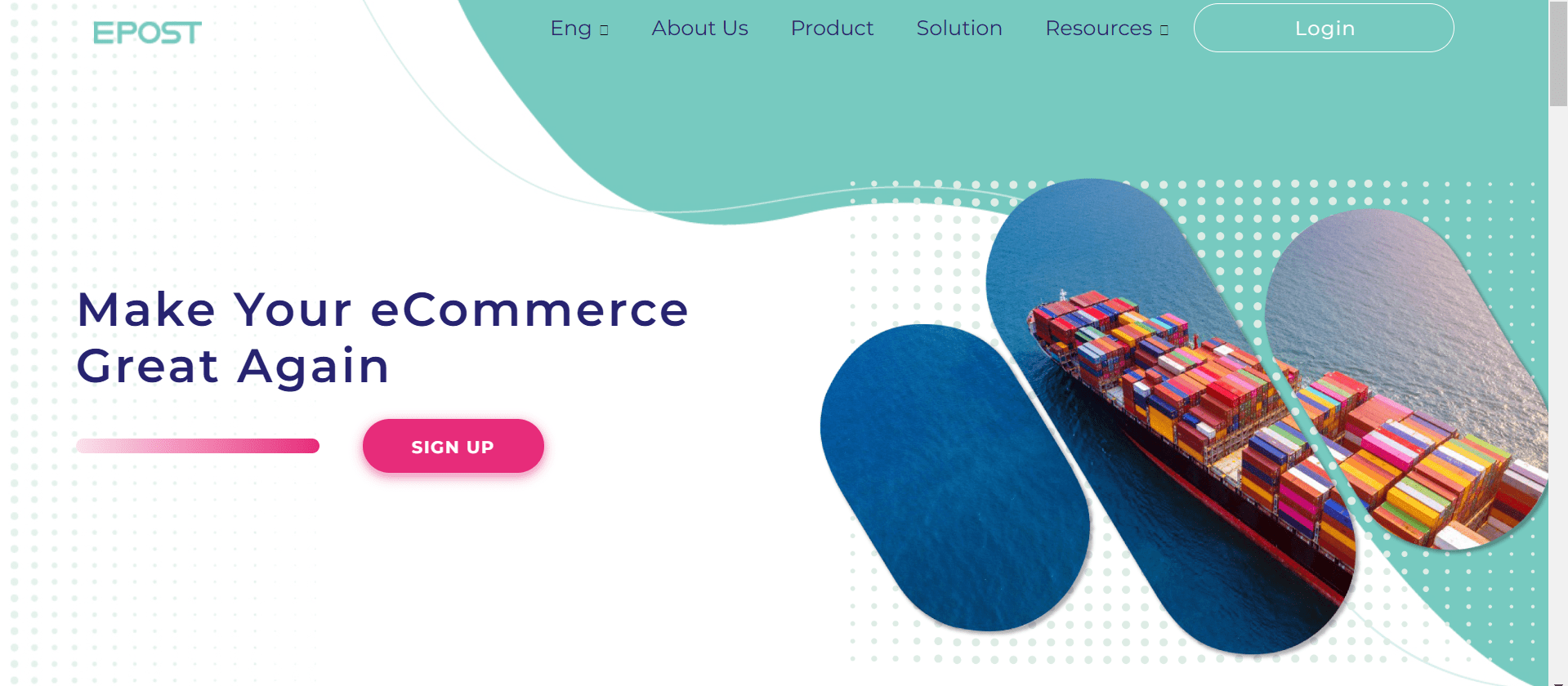
Epost Plus is a Malaysian startup that was founded in 2019 and is currently based in Puchong, Malaysia. The company operates in the logistics market and has developed an all-in-one WMS and OM88S solutions for a wide variety of business needs in relation to operations.
Since being founded, the company has gone through a number of funding rounds, with a total raise of $2.3 Million from two investors.
3. TheLorry
Year Founded: 2014
HQ: Selangor, Malaysia
Size: 11-50
Founders: Nadhir Ashafiq
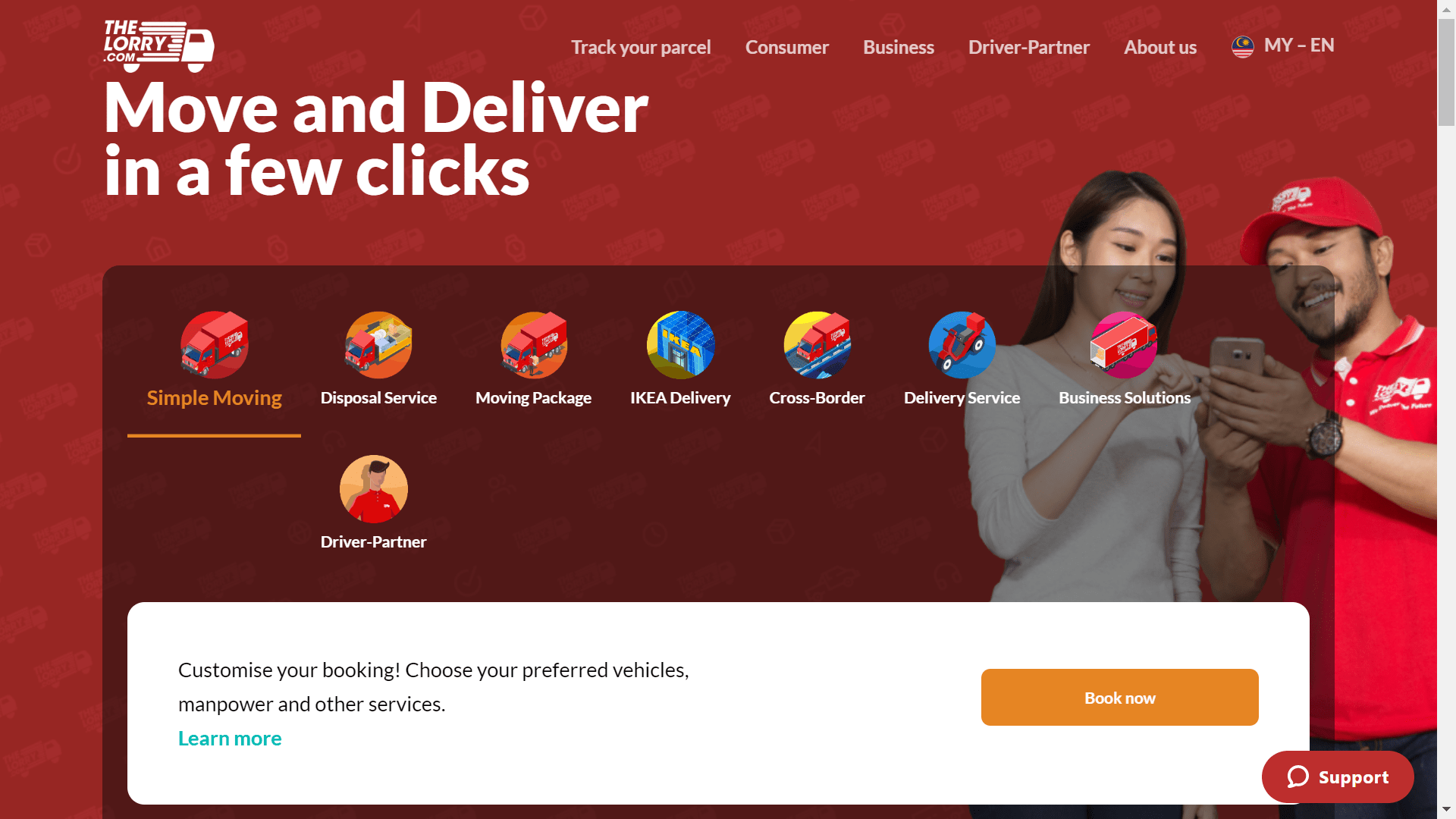
TheLorry is a Malaysian startup that was founded in 2014 and is currently based in Selangor. The company operates in the logistics market and has created a platform that allows users to easily book a lorry for their own use within a matter of minutes. This takes the complications and time wasted out of the process of boo
Since being founded, the company has gone through a number of startup funding rounds. The most recent of these funding rounds took place in April 2022 when the company raised 500,000 MYR. Overall, the business has raised a total of $7.5 Million from eight investors.
4. Socar Malaysia
Year Founded: 2017
Size: 101-250
Founders: Leon Sing Foong

Socar Malaysia is a Malaysian startup that was founded in 2017 and is currently based in Kuala Lumpur. The company operates in the transport sector and has created a platform that allows people in the country to easily ride-share, allowing people to drive when and how they need to, without needing to consistently keep their own vehicle for travel.
Socar is one of the most well-funded startups in Malaysia, with the company raising a total figure of $73.2 Million from four investors. The highlights the strong belief that investors have in the company's business model.
5. Naluri Life
Founders: Azran Osman-Rani, Hariyati Abdul Majid, Jeremy Ting

Naluri Life is a Malaysian startup that was founded in 2017 and is currently based in Kuala Lumpur. The company operates in the healthcare sector and has created an AI-powered digital health solution that helps patients to easily get access to the quality care that they need for both their physical and their mental health.
The business has secured an impressive amount of startup funding since being founded, with the startup raising a figure of $14.8 Million from seventeen investors, with its most recent round being a Series B in June 2022.
6. Respond.Io
Founders: Gerardo Salandra
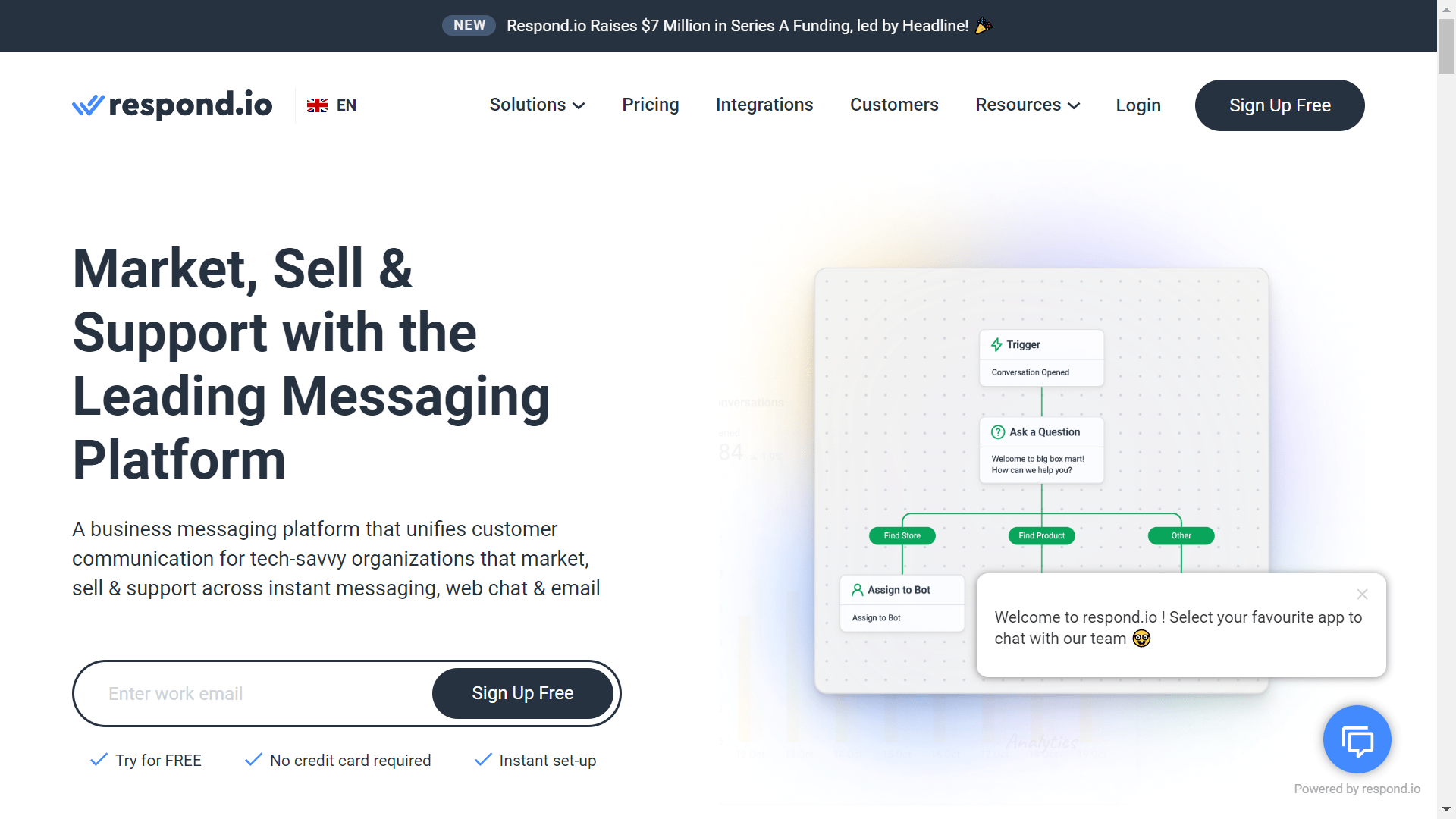
Respond.Io is a Malaysian startup that was founded in 2017 and is currently based in Kuala Lumpur. The company works in the marketing sector and has created a conversational platform to help businesses to extend their marketing and sales initiatives and works with more than 10,000 companies across the world.
The business has been through a number of funding rounds since being founded, with the startup raising a total of $8.8 Million from six investors. The most recent of these funding rounds took place in September 2022 as a Series A when it raised a figure of $7 Million.
7. PayWatch
Year Founded: 2018
Founders: Alex Kim, Richard Kim
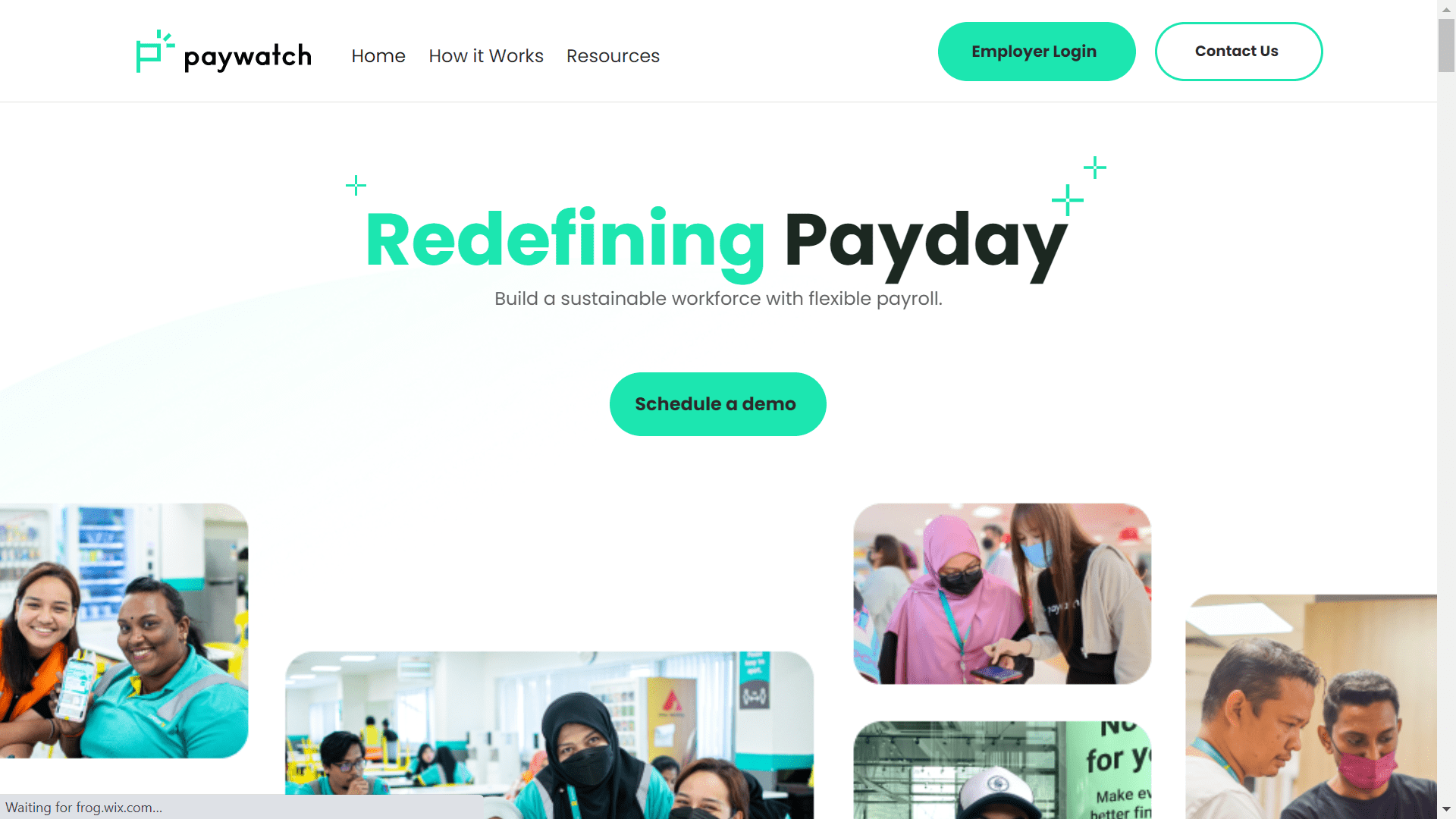
PayWatch is a startup in Malaysia that was founded in 2018 and is currently based in Kuala Lumpur, Malaysia. The company operates in the FinTech market and has created an online platform that allows employees to get earlier access to the wages that they have earned, which can help them to pay in financial emergencies.
The business has secured a large amount of startup funding since being founded, with a total of $14.2 Million being raised from eight investors. The company's last funding round took place in February 2023.
8. myTukar.com
Founders: Fong Hon Sum, Jeffrey Tan
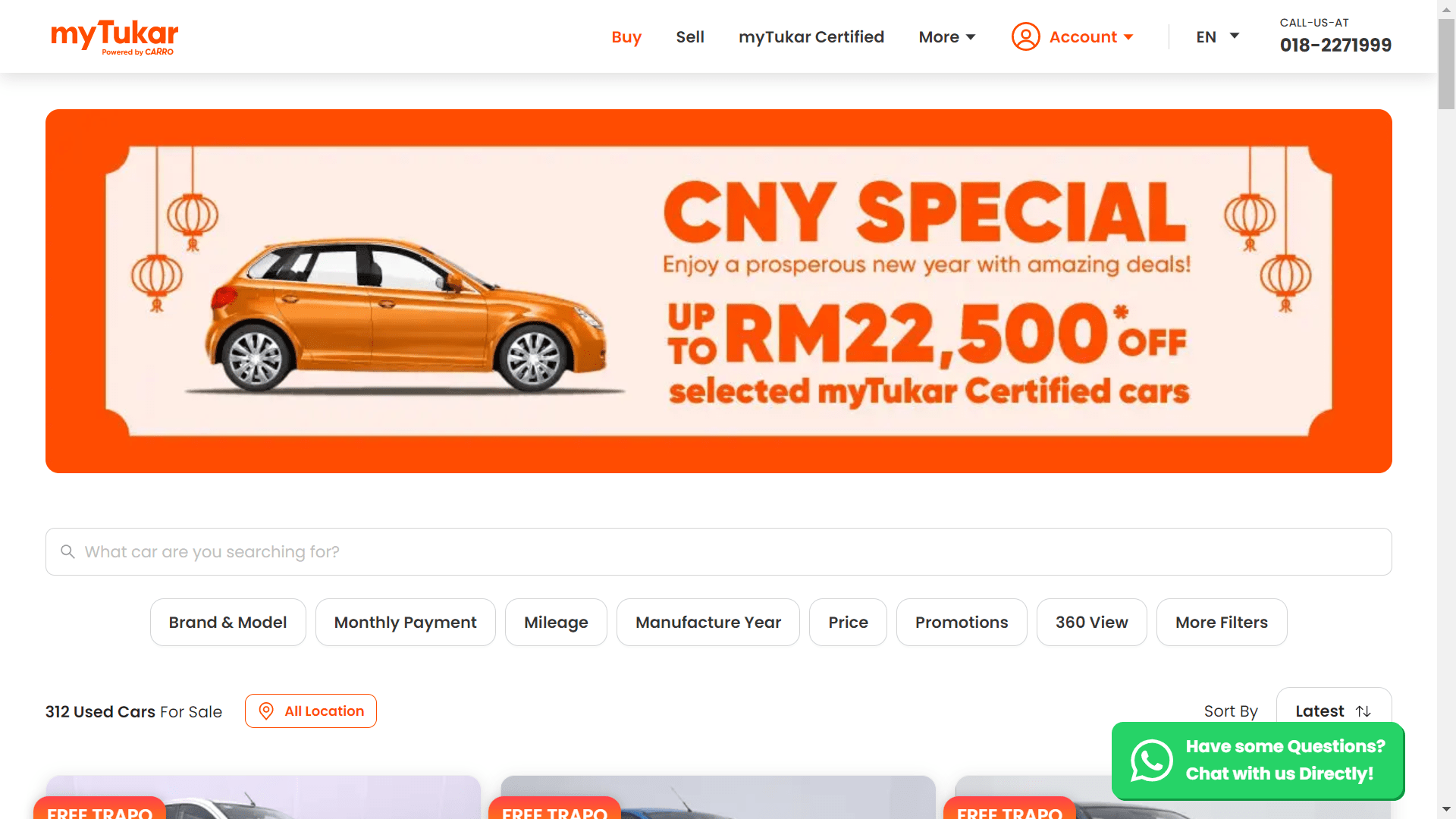
myTukar.com is a Malaysian startup that was founded in 2017 and is currently based in Selangor. The company has developed the most used and well-trusted platform for buying and selling motor vehicles. The company eliminates the complexities and haggling involved in this process.
The business has gone through a number of funding rounds since being founded, with the most recent being a Corporate Round in September 2019 when it raised $30 Million. Overall, the company has raised $30.9 Million from a single investor.
9. Teleport
Founders: Peter Chareonwongsak
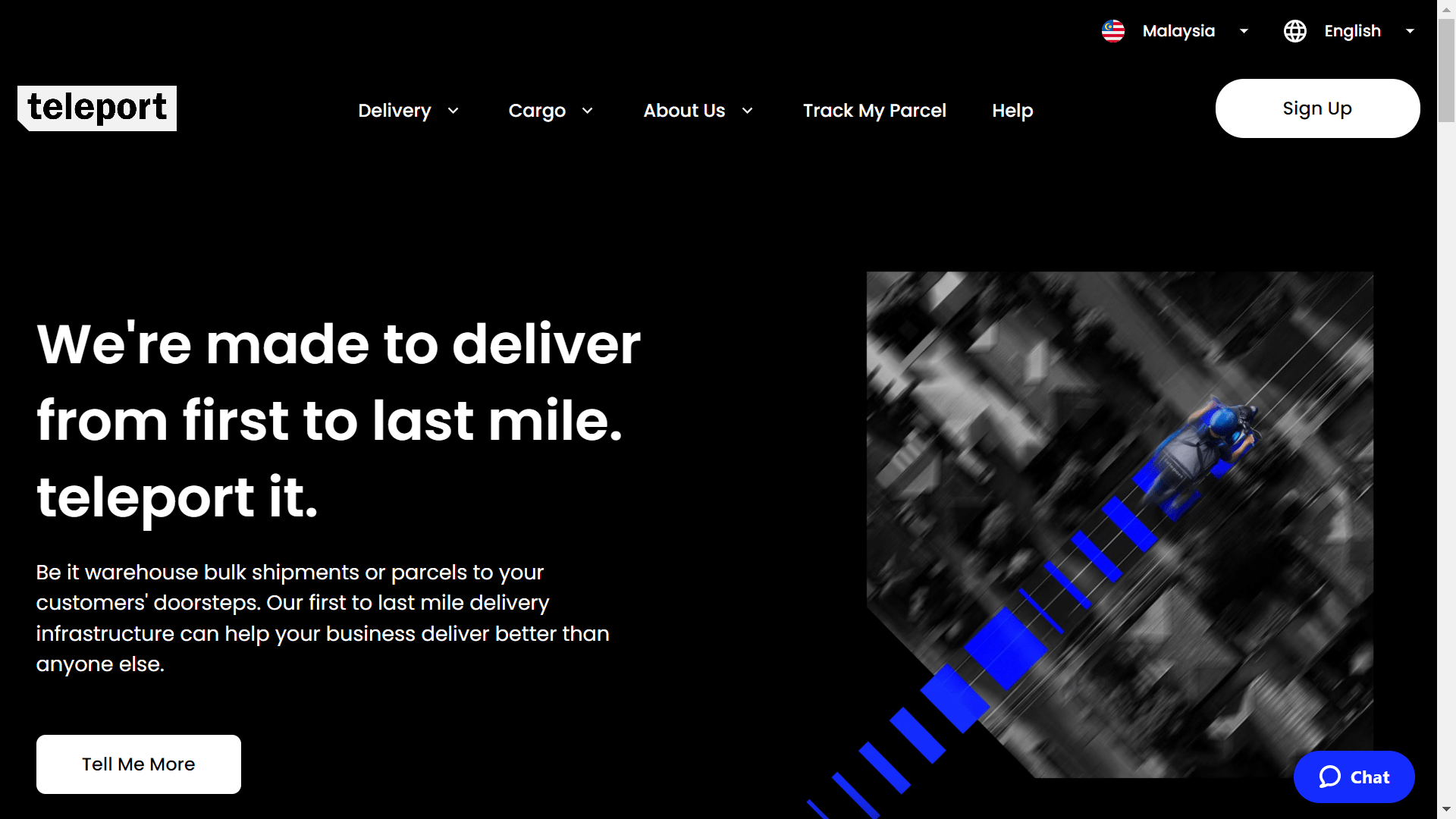
Teleport is a Malaysian startup that was founded in 2019 and is currently based in Selangor, Malaysia. The company operates in the e-commerce market and makes it easier for businesses to move goods and fulfil e-commerce orders across the whole of South East Asia.
The business has been through a number of funding rounds since being founded, with the company raising a total of 220 Million MYR . The company has also completed an acquisition and made an investment of its own.
10. Mr. Bur
Year Founded: 2021
HQ: Penang, Malaysia
Founders: Sean Yau

Mr. Bur is a Malaysian startup that was founded in 2021 and is based in Penang, Malaysia. The company operates in the dental industry and serves to create innovative dental bur solutions to create a better care experience for patients and to deal with them more quickly and efficiently.
The company has gone through a number of funding rounds since it was founded, with the most recent being a round in September 2022 when the company raised $2.5 Million. Overall, the business has raised a figure of $4.8 Million from an unknown number of investors.
Founders: Ah Go, Alwin Chang, Jayson Tan

Torum is a Malaysian startup that was founded in 2018 and is currently based in Kuala Lumpur. The company operates in the blockchain market and has developed a web3 SocialFi application that offers an NFT marketplace, yield farming capabilities and avatar NFTs for metaverse use.
The company has been through a number of funding rounds since being founded, with the most recent being a round in November 2021. Overall, the company has managed to raise a figure of $2.1 Million from eighteen investors.
Year Founded: 2020
Founders: Darvesh Dashwani, Justin Kong
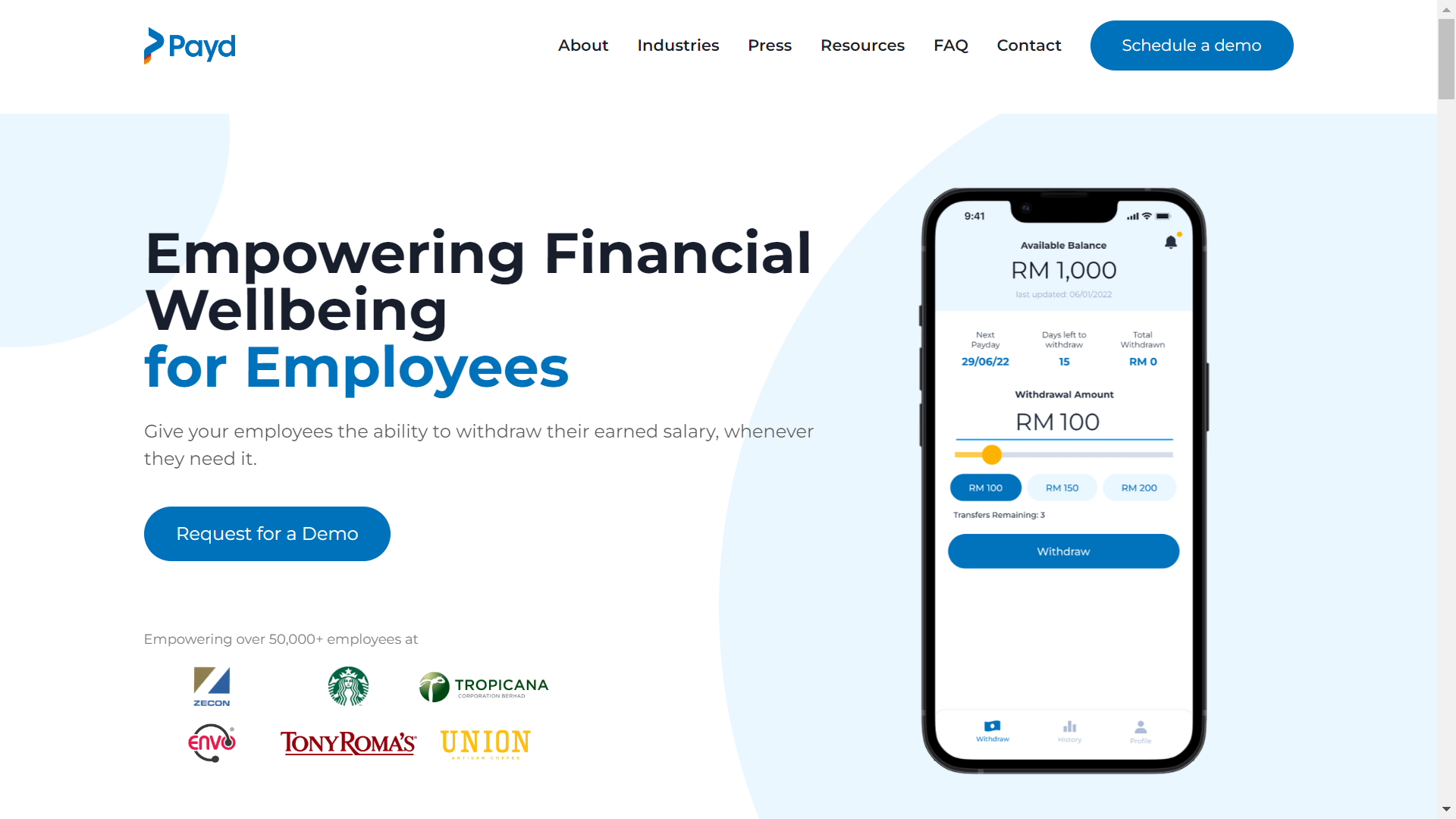
Payd is a Malaysian startup that was founded in 2020 and is currently based in Kuala Lumpur. The company operates in the FinTech market and has created a solution that allows people all across the country to become involved in the financial ecosystem, including individuals who previously would have been excluded from working within the ecosystem.
Since being founded the business has gone through a pair of funding rounds, with the most recent taking place in April 2022 when the startup raised $1.7 Million in Seed Funding from five investors. Overall, the business has raised $1.8 Million from five investors.
Founders: David Chmelar, Heinrich Wendel
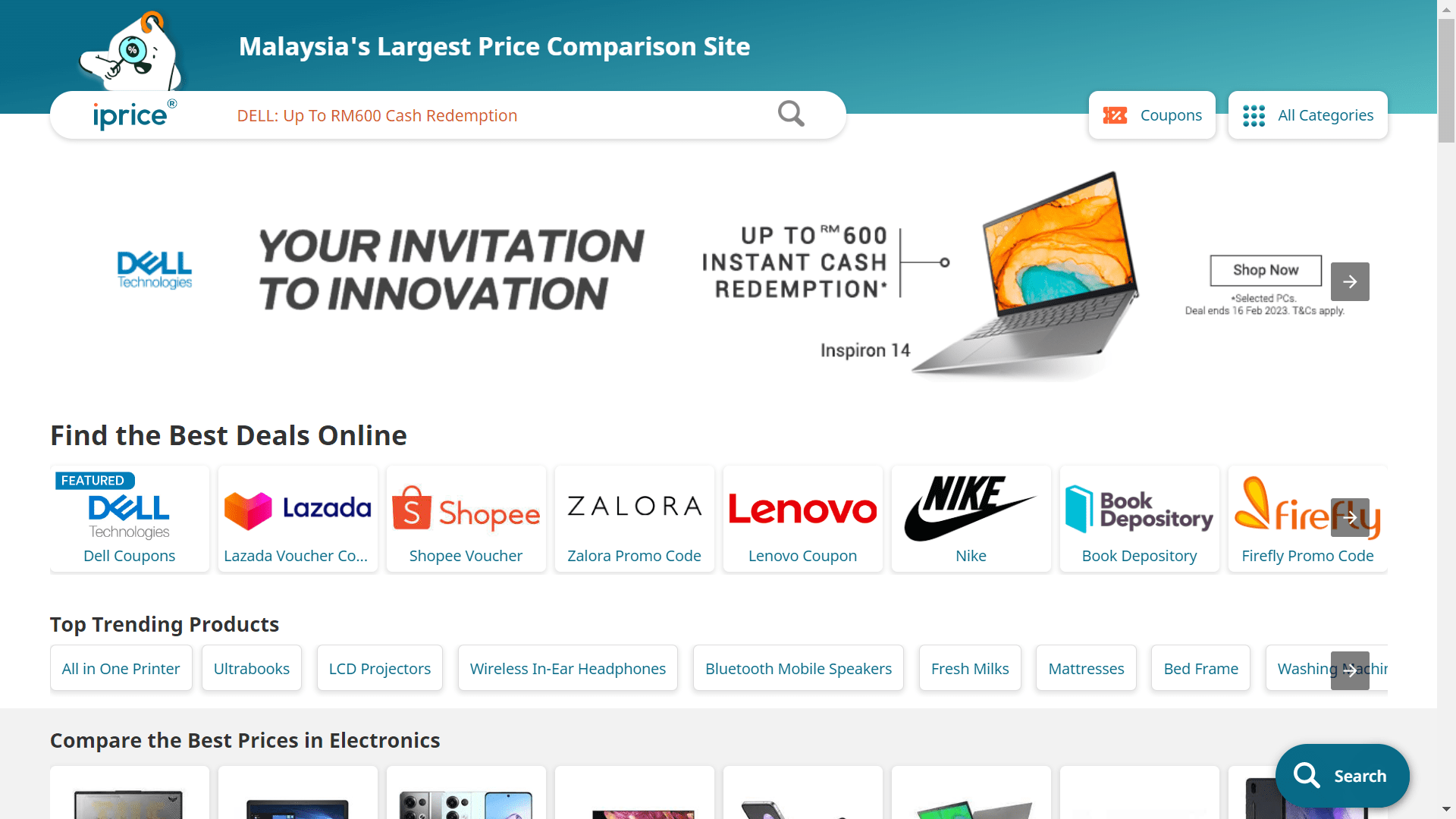
iPrice is a Malaysian startup that was founded in 2014 and is based in Kuala Lumpur. The company operates in the e-commerce market and has created a website where people across the country can get access to a range of items from hundreds of brands across South East Asia.
The business has gone through a number of funding rounds since being founded, with nine in total. From these funding rounds, the business has managed to raise a total of $21.25 Million from twenty investors.
Founders: Shazy Noorazman

Ouch is a startup in Malaysia that was founded in 2019 and is currently based in Kuala Lumpur. The company works in the insurance market and makes it easier for individuals and businesses to get access to the insurance products that they need. Insurance can be incredibly complex, but with Ouch, it doesn't have to be.
The business has gone through a number of funding rounds since being founded, with the most recent taking place in January 2023. In terms of reported funding, the startup has raised a figure of 1.5 Million MYR from a pair of investors.
15. Flower Chimp
Year Founded: 2016
Founders: Maximilian Lotz, Niklas Frassa

Flower Chimp is a Malaysian startup that was founded in 2016 and is currently based in Kuala Lumpur. The company works in the e-commerce market and provides Malaysians with a range of flowers for a number of different occasions. These flowers can then be delivered around the country quickly to reach the customer.
The business has gone through a number of funding rounds since being founded, with the startup raising a total of 106 Million MYR from six investors. The business has also completed the acquisition of another startup in that time.
16. Soft Space
HQ: Petaling Jaya, Malaysia
Founders: Chang Chew Soon
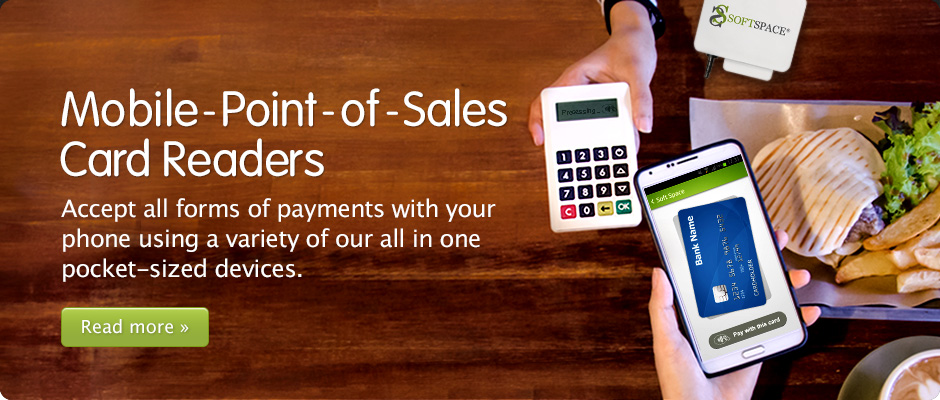
Soft Space is a Malaysian startup that was founded in 2012 and is currently based in Petaling Jaya. The company works in the FinTech market and provides payment solutions for mobile across the country, working with more than 13 banks across Asia, including in New Zealand and Australia.
The business has gone through a number of funding rounds since being founded, with the startup raising a total of $11 Million from three investors. The startup has also completed the acquisition of another startup in that time.
17. Pop Meals
Year Founded: 2015
Founders: Christian Edelmann, Jessica Li, Jonathan Weins

Pop Meals is a Malaysian startup that was founded in 2015 and is currently based in Kuala Lumpur. The company works in the logistics market for food and combines large scale production with artificial intelligence to improve last mile logistics, which creates a cheaper and more efficient way of working.
The business has secured a large amount of startup funding since being founded, with the total raised reaching $27 Million from twenty-one investors at the time of writing. It is unclear whether the business will be seeking further funding in the immediate future.
HQ: Selangor, Mayalsia
Founders: Ang Xing Xian, Darrel Ang, Dion Tan, Edwin Tan

CapBay is a Malaysian startup that was founded in 2016 and is currently based in Selangor, Malaysia. The company operates in the FinTech market and has created a peer-to-peer platform for the financing of supply chain operations. This allows businesses to get access to institutional funding in a much easier manner.
The business has been through a number of funding rounds since being founded, with the total raised reaching $27.6 Million at the time of writing, achieved with the help of a pair of investors.
19. Aerodyne Group
Founders: Kamarulazman Muhamed

Aerodyne Group is a Malaysian startup that was founded in 2014 and is currently based in Petaling Jaya. The company makes use of drone technology and artificial intelligence in order to supply a range of drone-based managed solutions for its customers, which have a wide variety of use-cases.
Since being founded, the business has been through three rounds of startup funding, with the total amount raised reaching $30 Million from nine investors. It is currently unclear whether the business will seek further funding in the near future.
20. Lapasar.com
HQ: Sunghai Buloh, Malaysia
Founders: Lakshman Das, Thinesh Kumar
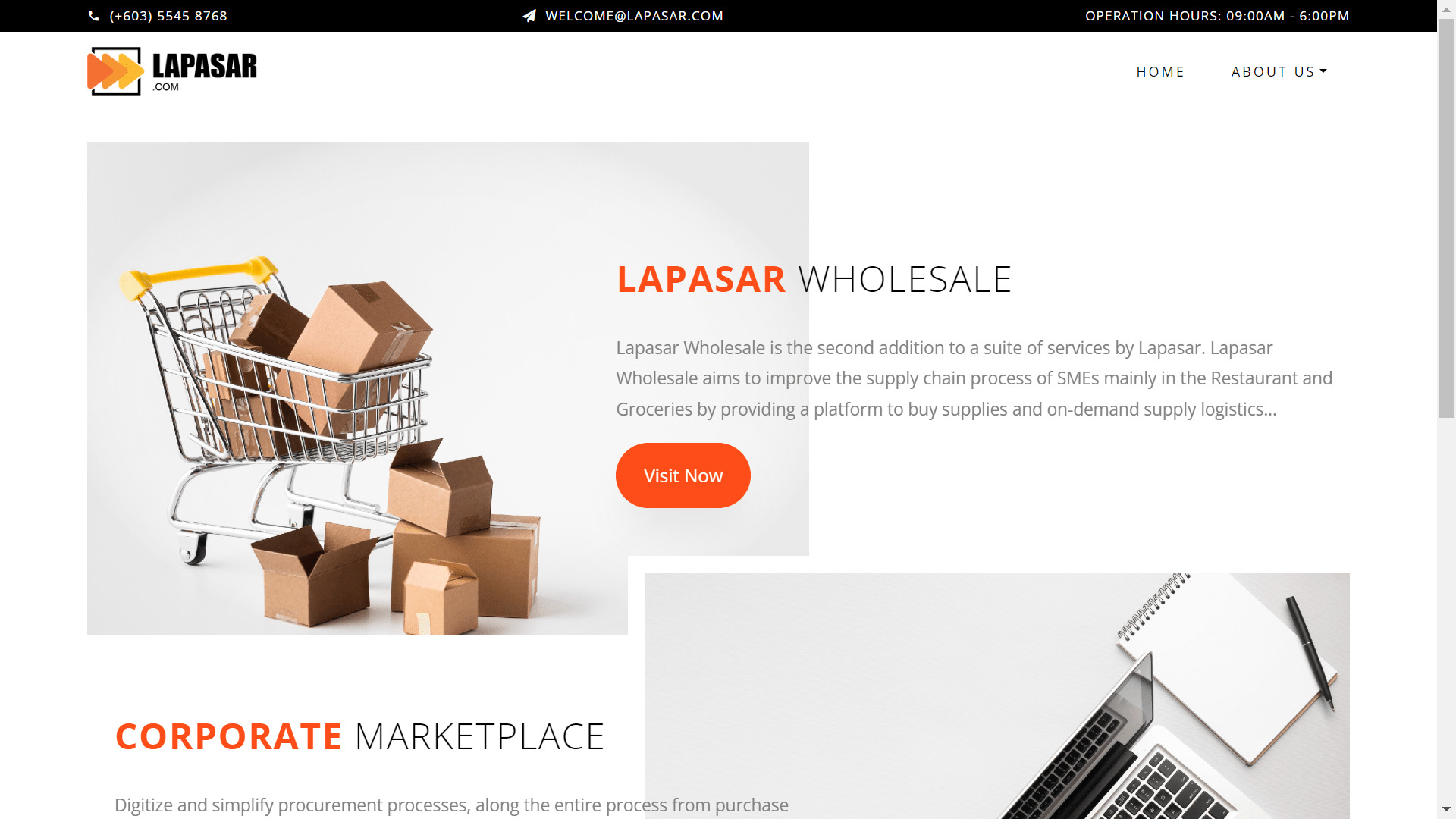
Lapasar.com is a Malaysian startup that was founded in 2016 and is currently based in Sunghai Buloh, Malaysia. The company operates in the logistics market and has created an online platform for supply chain management, to help businesses to increase their efficiency and ultimately, their profit margins.
The business has been through a number of funding rounds since being founded, with the company raising a total of $2.5 Million from six investors. It is currently unclear if the company will seek further funding in the immediate future.
21. BioGenes Technologies
HQ: Kajang, Malaysia
Founders: Tang Kok Mun

BioGenes Technologies is a startup in Malaysia that was founded in 2015 and is currently based in Kajang, Malaysia. The company operates in the healthcare field and is behind the development and creation of point of care genetic testing to help with the rapid and effective screening of multiple diseases.
The business has been through a number of funding rounds since being founded, with the total raised reaching a figure of $7.1 Million at the time of writing, with the support of three investors.
How Many Startups Are There in Malaysia?
Official estimates are that there are more than 3000 startups in Malaysia.
What is the Average Investment in Malaysian Startups?
The average Seed Round in Malaysia is worth $215,000 and the average Series A is worth $3.3 Million.
What Startup Industries Are The Strongest in Malaysia?
The strongest startup industries in Malaysia are E-Commerce, FoodTech and Transportation.
Related posts

Top UAE Startups To Watch in 2024

Top German Startups to Watch in 2024

Top Swedish Startups to Watch in 2024
The biggest online directory of tools and resources for startups
Contact us: [email protected]
Subscribe to our weekly newsletter to receive the best tools, resources and discounts!
Advertise on Stash
Have a story?
© 2020 Startup Stash
🚀 Stay ahead of the game
Subscribe to our weekly stash newsletter to receive the best resources, products and discounts!
Call us at +603 8744 2331

How to Start an F&B Business in Malaysia: A Brief Step-by-Step Guide 2023
- June 3, 2023

Share This Post

Starting a cafe or restaurant of your own is the dream of a lot of Malaysians. The idea of putting your heart and soul into creating an F&B outlet, serving customers and gaining loyal fans can be an exciting one.
However, the reality of opening an F&B business can be harsh. Instead of living the dream, new cafe and restaurant owners often find themselves in a nightmare when expenses pile up while customers are nowhere to be found.
Soon enough, their entire business collapses and their business is history.
Needless to say, opening a cafe or restaurant can be a risky affair. Even with the best intentions, you’ll still need a lot of planning and preparation to give yourself a higher chance of success.
To help you get started on the right footing, we’ve compiled our best resources on F&B business planning and preparation in this one guide. In this brief guide, you’ll discover how to:
- Craft a solid business plan for any type of F&B business
- Create a memorable brand story
- Generate interest in your F&B business using marketing campaigns
- Pick a good location for your F&B business premise
- Create Standard Operating Procedures to streamline your process
- Choose a solid Point of Sales (POS) system
- Raise money to grow your F&B business
If you are one of the many Malaysians who want to start your own F&B business, this guide will give you a better idea of what to get started with and get you started the right way!
Step 1: Create a Solid Business Plan
If you fail to plan, you are planning to fail.” Benjamin Franklin
Your F&B business journey will begin with a business plan. A business plan will help you to:
- Be clear on your business objectives, mission, and vision
- Deeply knowing the target market you intend on serving
- Understand your competition’s strengths and weaknesses and how your business stacks up against theirs
- Analyse if your business really has what it takes to be successful
- Discover blind spots you might not have noticed previously
- Decide on your menu offerings and their prices
- Do cash flow projects and calculate how long your money will last you and when you might need to raise money
- The type of expertise you need to look for in the staff you hire
A business plan will also be useful if you are thinking of raising money to start your business. Potential investors will likely want to take a look at your business plan before they consider putting money into your business.
To learn how to create a solid business plan, you can read our F&B business plan guide. We go through each step of the way so, at the end of the guide, you’ll have an idea of how to create a solid business plan!
Why You Should Have a Business Plan Before Launching Your FnB Business in Malaysia and How to Create One
Step 2: Craft a Memorable Brand
Branding is one of the best ways to differentiate yourself. Without one, your business will easily become lost in a sea of businesses selling the same type of food.
Remember the last time you bought food from a Ramadhan bazaar? You’ll probably have your fair share of really good and bad food.
Now, think about what happens after the Ramadhan bazaar. What if you want to buy food again from the stalls you liked?

Would you know where to find them?
I’m guessing it’s pretty unlikely because they don’t have a strong or memorable brand.
Even if the same seller opens a booth in the same Ramadhan bazaar next year, it will be tough for you to find them and buy from them again.
As a business owner, you never want to suffer the fate of being an unknown business. Instead, you want customers to remember your brand and come back, again and again, to buy from you.
This is why you’ll need to invest in creating a memorable brand for your business. A brand isn’t only about a name, or a logo, you’ll need to craft a compelling brand story and packaging to match.
Get tips about how to create a brand using the guide below:
8 Important Steps You Need To Define An Attractive F&B Brand
Step 3: Choose a good location
Once you have an idea of the brand image you would like to project, it’s time to pick out a location for your business.
For new businesses, picking a good location is very important. Picking the right location will mean exposing your brand to a large number of people in your target segment who will give your business a try whereas picking the wrong location may mean your business remains hidden to the very people you would like to serve.
While cost is a big concern, there is a lot more to consider when picking a location. Get the full list of ten things we think you should consider when picking a location for your F&B business right here:
Picking a Location for Your Cafe or Restaurant in Malaysia: 10 Things to Consider Before Signing Your Lease
Step 4: Market Your F&B Business

Now that you have settled on a business plan, brand and location, you’ll need to consider how you might generate interest and draw in a crowd to your business using the right marketing methods.
Because let’s face it – without a strong customer interest in your brand, you won’t be open for too long, no matter how good your food or branding is.
Today’s F&B environment is too competitive for you to not take advantage of the marketing channels available to you. With thousands of others vying for the attention of the same customers, you’ll need to get creative. This is especially true at the beginning when your brand is relatively unknown in the market.
Start getting creative and get inspiration on how to create an effective marketing campaign for your F&B business here:
6 Ways to Market Your Restaurant or Cafe Business in Malaysia and Get More Customers (With Examples)
Step 5: Create SOPs for Your F&B Business
We’re halfway through now, but not quite done yet. To make sure your cafe or restaurant runs smoothly and your customers get a great experience each time they patronise your business, you’ll need Standard Operating Procedures (SOP) in place.
SOPs will document exact instructions for every single process in your restaurant including:
- How to treat your customers
- How to maintain kitchen cleanliness
- How to maintain food hygiene
- How to keep track of your costs
While it’s quite a bit of work to document these processes, the benefits will definitely be worth your time.
Get started with SOPs for your F&B business by using our guide:
SOPs for Your FnB Business in Malaysia: Why You Need Them and How to Create Ones That Work
Step 6: Pick an F&B Point-of-Sales (POS) System for your business
POS Systems are an indispensable part of any F&B business these days. Modern POS Systems can not only help you manage customer payments, but they can also help you to:
- Streamline your front desk to kitchen communication
- Keep stock of your inventory and do calculations
- Easily keep track of your sales
- Accounting made easy
- Keep your staff in check
- Easy to train new staff
By using a POS System, you’ll help yourself and your team save hours by making your processes seamless.

Not all POS Systems in the market are made equal though. Learn how to choose the right POS System for your business by using our criteria:
Looking for the Best POS System for Your FnB Business in Malaysia? We’ll Show You How to Choose One! [2019]
Step 7: Calculate Your Food Costs
Food costs can contribute to 25 – 35% of an F&B business’ overall costs. This is pretty significant, so you’ll want to make sure you understand what makes up your food costs.
This way, you’ll be able to:
- Reduce wastage
- Reduce costs by replacing ingredients (but not compromising quality)
- Take advantage of bulk pricing
Use our guide to help you calculate your food costs and discover ways to reduce it in the long term:
Food Costing Calculation for Restaurant and Cafe Owners in Malaysia (with Formula)
Step 8: Raise Money to Grow
Finally, you’ll need to learn how to raise money for your business. Even if you are funding your business with your own money now, there might come a time when you need to raise money either to grow your restaurant, open new outlets or bridge your business through temporary cash flow issues.
Consider all the options available to you by using our F&B funding guide:
Raising Money for Your FnB Business in Malaysia: 5 Common Ways Malaysians Fund Their Cafe or Restaurant Dream
Starting your own F&B business may be a dream come true, but unless you plan and prepare yourself properly, you might having to give up on it long before you are ready to.
With a solid business plan, a memorable brand, good location and effective marketing campaign, you’ll be on your way to launch your business right.
Further smoothen your business operations by creating SOPs, using an F&B specialised POS System and precisely calculating your food costs.
Finally, be prepared with the possibility of having to raise money for your business in the future and consider all the options available to you before that happens.
Note: We will be updating this guide from time to time, so do check back for updates! Let us know what you think of this guide in the comments below!
Follow us on social media!
More to explore.

6 Advantages of Cashless Payments with POS Systems
6 kelebihan beralih ke pembayaran tanpa tunai menggunakan sistem pos, sign up to our mailing list.
Get updates on retail and F&B articles, trends, tips and Slurp! related newsletter.
- Point-of-sale
- Knowledge Base
- Privacy Policy
- Terms of Use
- Payment & Refund Policy
Suite 609A, Bangi Business Park, Off Persiaran Kemajuan, 43650 Bandar Baru Bangi, Selangor, Malaysia.
+603 8744 2331
Certified As

More From Forbes
How to make a business plan with 4 sticky notes.
- Share to Facebook
- Share to Twitter
- Share to Linkedin
All you need for business planning is a stack of sticky notes.
What if I told you you could have a business plan in half an hour? It might sound too good to be true—but it’s not.
If you have a set of sticky notes and a pen, you can create a business plan. As I talk about in my book Start. Scale. Exit. Repeat. , this is an exercise for you and your business partners—not the robust business plan you will show to your seed investors or use at a pitch competition.
So why sticky notes? Because when you’re coming up with your personal business plan, less is better. Since they’re small, they force you to focus only on what’s critical for your startup idea. And they are also sticky. We can post them on the board to focus on following the plan.
So now you’ve got your four multi-colored sticky notes ready, what do you put on there?
Now, what do each of these mean?
Story is where you’re going to spend the most time. Think of it as your elevator pitch when someone asks, “So what do you do?”
Look at it like a journalist and ask, “Why, What, Who, Where, When, and How?”
Best High-Yield Savings Accounts Of 2024
Best 5% interest savings accounts of 2024.
- Why: Your purpose.
- What: The problem you solve.
- Who: Your customer profile.
- Where: Location for people to find you (physical, online, or both).
- When: Your timeline for success.
- How: What gives you the competitive edge—your X-Factor.
Concerning “When,” you’ve got to set up Stage Gates—a point in time to meet a milestone. These are different from goals in that they are tied to big decisions. You can miss a goal and be fine. But if you miss a Stage Gate, you’ll need to decide if you will pivot the business—or kill it.
More than regular goals, Stage Gates must be SMART—Specific, Measurable, Attainable, Relevant, and Time-Bound. And when you meet a Stage Gate, it provides momentum because you can go back to investors and say, “Look, we did what we set out to do—so now we need to raise more funds to scale.”
Your People sticky note is all about who you need on your team to reach your Stage Gates. Even if you’re starting as a solo venture, you still need support: vendors, suppliers, marketing, web support, and so on.
Seek out a business mentor or coach. Find a local startup incubator where you can refine your idea, prove your concept, and develop your MVP. Incubators are also a great way to workshop your pitch for investors—or even connect with investors. Which brings us to…
Many entrepreneurs think, “I can just put it out there, and the money will come,” but 82% of startups fail because they don’t have enough money to launch. You can have the greatest Story, People, and Systems ever assembled, but if you don’t have the money, those won’t matter. Money is the oxygen in your tank—run out, and you’ll suffocate.
Instead, figure out how to fund the company to reach that first Stage Gate. Also, it’s not enough to know the amount you need but where your funds come from: Self-funded? Friends and family? Business loan? Grants or government funding? Or one of my favorites—being customer-funded - the art of getting paid in advance to fund your startup.
Last but definitely not least, you need Systems in place to track your KPIs—your Key Performance Indicators—which are directly connected to your Stage Gates. You need to check on these daily to stay on track and mitigate risks. The startups that scale are often the same ones that develop repeatable Systems aligned to their Story.
Some systems are more obvious, like email or accounting software. But it can also entail hiring systems to identify the right salespeople, setting up distribution channels, establishing sales pipelines, and anything else needed to hit your next Stage Gate.
You can even use the 4-Sticky Note Business Plan as a system for business growth. As my close colleague Michele Van Tilborg said at a recent Startup Club session, it’s a great exercise for teams to do, too—a way to find a common mindset and clarity around business objectives.
With over a dozen startups under my belt, I still use the 4-Sticky Note Business Plan. If nothing else, it’s an easy way to figure out whether your idea is worth developing or not. If you can’t fill most of the four sticky notes, it’s not time to act.
If you are still stumped with blank sticky notes staring back at you. We put a free CustomGPT (AI Tool) to help you complete the 4-sticky-note plan found at www.startplanai.com . Do you have the right Story, People, Money, and Systems? Grab your sticky notes and pen, and take half an hour to figure it out.
Your future self will thank you.

- Editorial Standards
- Reprints & Permissions

IMAGES
VIDEO
COMMENTS
Step 1: Preparation for Registration. Selecting a business structure: Choose the most suitable form for your business. Options include sole proprietorship, partnership, limited liability partnership, private limited company, public limited company, branch office, representative office, or subsidiary company.
I am therefore honoured to be given the opportunity to launch The Malaysia Startup Ecosystem Roadmap (SUPER) 2021-2030. SUPER is developed to transform Malaysia into a Top 20 global startup ecosystem by 2030. It will also help us realise our goal to generate 5,000 startups, including five with unicorn status, by 2025.
Located strategically in Southeast Asia, Malaysia offers access to burgeoning middle-class markets in the region, as well as China and India—fostering opportunities for startup market expansion. Coupled with cost-effective infrastructure and access to leading industries like energy and manufacturing, startups can optimize their investments.
3 - Develop your Business Model, Financial Model and Marketing Plan. Mindmap your business model can be difficult to see how far you have in your startup business. You'll have a better overview from the start of your business in Malaysia and expand horizontally or vertically, or both. Financial modelling is a great tool to tell you how much ...
A Complete Guide to Start A Business in Malaysia 2024. Ranked at 24 th in 2018 World Bank's Ease of Doing Business, Malaysia is fast gaining traction as one of the favourite investment destinations to do business in Malaysia and building a business in Malaysia. Though the high ranking in the World Bank's Ease of Doing Business signifies that starting a business in Malaysia is not that ...
1. Create and polish your business plan. Before you start any business, creating a solid business plan is crucial. Your plan should include details about your business, such as your vision, mission, objectives, and strategies. It should also have a detailed analysis of your target market, competition, product or service, and financial projections.
A startup is a business that is still in its early phases of development. One or more entrepreneurs form a startup to produce a product or service for which they feel there is a market. These businesses typically start with high costs and low income, which is why they seek funding from a number of sources, such as family, friends, and outsiders ...
Step 1: Refine your business plan. Transitioning from a mere idea to a viable business concept requires careful consideration. Begin by assessing your business idea's feasibility in terms of time commitment, required investment, and potential returns. Although following your passion is advised, it's equally crucial to evaluate its profitability ...
Comprehensive Guide to Business Startup in Malaysia. In this guide, we delve into the essential steps of the business startup process in Malaysia. These include conducting robust market research, developing a strategic business plan, selecting the appropriate business structure, and securing the necessary funding for a successful launch.
In conclusion, a meticulously crafted business plan lays the groundwork for success in Malaysia's business landscape. It allows you to plan, manage, and adapt, while also providing insights beyond financing. So, grab your pen, let your creativity flow, and craft your masterpiece - a business plan that will set you on the path to triumph.
Writing a business plan in Malaysia should never be bothersome as it is a vital document for your company's success. There is no particular format, but if you have no clue what you are planning, try and some expert advice as to how and where the company can go. 291. Writing a business plan in Malaysia is a critical first step to success of ...
Considered one of the top financial hubs in South East Asia, Malaysia's government consistently provide opportunities and incentives for investors and new entrepreneurs. If you know you've got a one in a million idea, it's about time to put that thought into a blueprint. Start your Malaysia startup journey today. Find out more below.
Step 2: Create a business plan. Step 3: Choose a business name and domain name. Step 4: Legal concerns. Step 5: Build your website. Step 6: Make Your Online Business Trusted! Step 7: Develop and implement your pre-launch marketing strategies. Step 8: Launch your new business; GROW and MANAGE.
7. Start an online video editing business. Video editors manage camera footage, dialogue, sound effects, graphics, and special effects to produce the final film or video product. To become an online video editor, you must have media production and communication knowledge and the ability to work with others.
If your business contributes to one of the 17 SDGs available, you should apply for this grant. The government aims to accomplish the 17 SDGs, and if you share the same goal, you are already qualified to apply to receive your funding. 6. Working Capital Guarantee Scheme (SJMK) The government aims to assist SMEs in all industries through this grant.
2. Stick to the usual private limited company as a legal structure. The best legal structure for a startup is the plain vanilla private limited company (or usually known as a' Sendirian Berhad' or 'Sdn Bhd). It is common to come across founders that formed their legal structure as a limited liability partnership (usually known as LLP ...
A solid and complete business plan is needed from the start, so you might want to discuss all the details with our agents. We can assist international entrepreneurs to start a business in Malaysia. 6 tips for a successful Malaysia startup. Malaysia offers a wide range of business possibilities and already hosts a large number of companies.
How will your business survive and grow in the next 5 years? The above is correct on 14th October 2021. SME Corp. Malaysia is a Central Coordinating Agency that formulates overall policies and strategies for SMEs and coordinates the implementation of SME Development Programmes across all related Ministries and Agencies.
Starting a startup in Malaysia involves several steps. Here's a general guide to help you get started: Develop a business idea: Identify a gap in the market or a problem that needs to be solved, and come up with a unique and viable solution. Conduct market research: Analyze the market to determine the demand for your product or service, and gather information on your competitors, potential ...
It involves taking calculated risks, managing resources, and innovating to create value and sustainable growth. Nowadays, many universities and educational institution encourage students to participate and develop their own startup as the preparation after graduation. Thus, Malaysia Startup Challenge (MSC) is an online competition focusing on ...
1. pitchIN. Year Founded: 2012. HQ: Kuala Lumpur, Malaysia. Size: 1-10. Founders: Kashminder Singh, Sam Shafie. pitchIN is a Malaysian startup that was founded in 2012 and is currently based in Kuala Lumpur. The company operates in the crowdfunding market and has created the premium platform for fundraising in the country.
Step 1: Create a Solid Business Plan. If you fail to plan, you are planning to fail.". Benjamin Franklin. Your F&B business journey will begin with a business plan. A business plan will help you to: Be clear on your business objectives, mission, and vision. Deeply knowing the target market you intend on serving.
A lean startup business plan involves quickly testing and validating business ideas. This approach is commonly used by startups and early-stage companies to create a strategic roadmap.
If you have a set of sticky notes and a pen, you can create a business plan. As I talk about in my book Start.Scale. Exit. Repeat., this is an exercise for you and your business partners—not the ...
The Treasury Department unveiled rules to curb financing of Chinese semiconductors, quantum computers and artificial intelligence systems.
In the next five to 10 years, Malaysia is targeting 60,000 skilled technology/engineering based talents to attract high-quality investments that creates higher-paying jobs. - Bernama Open Modal